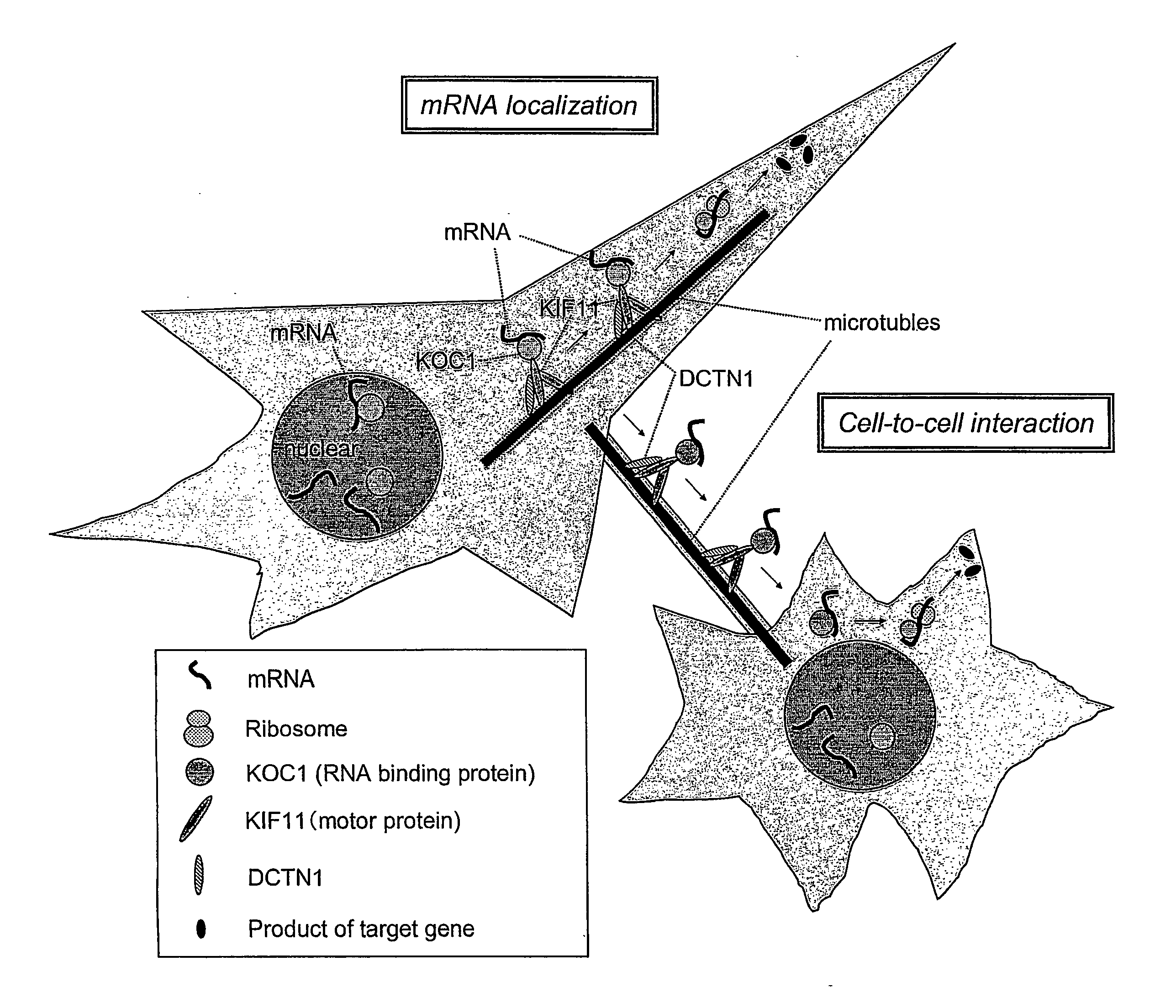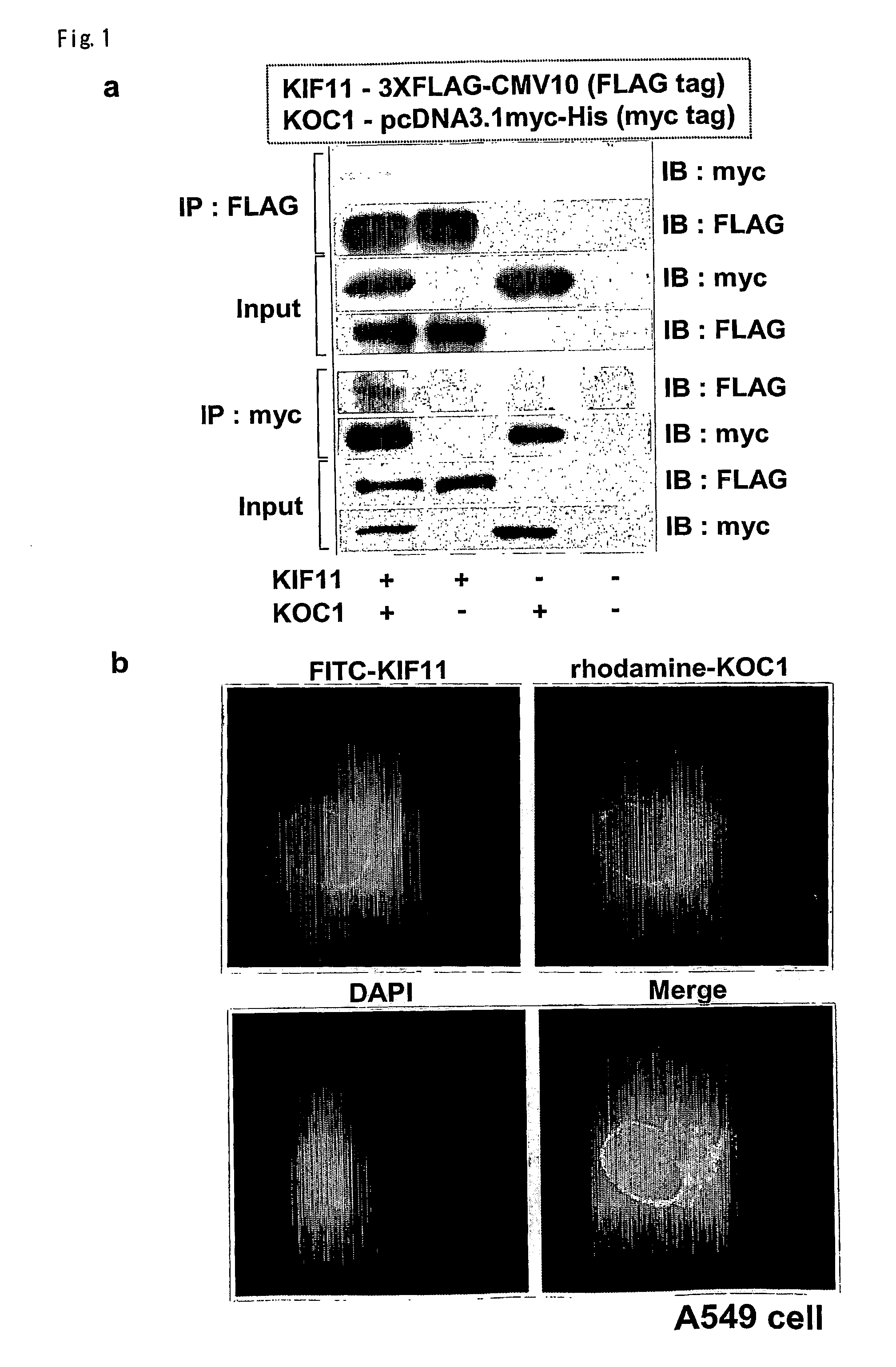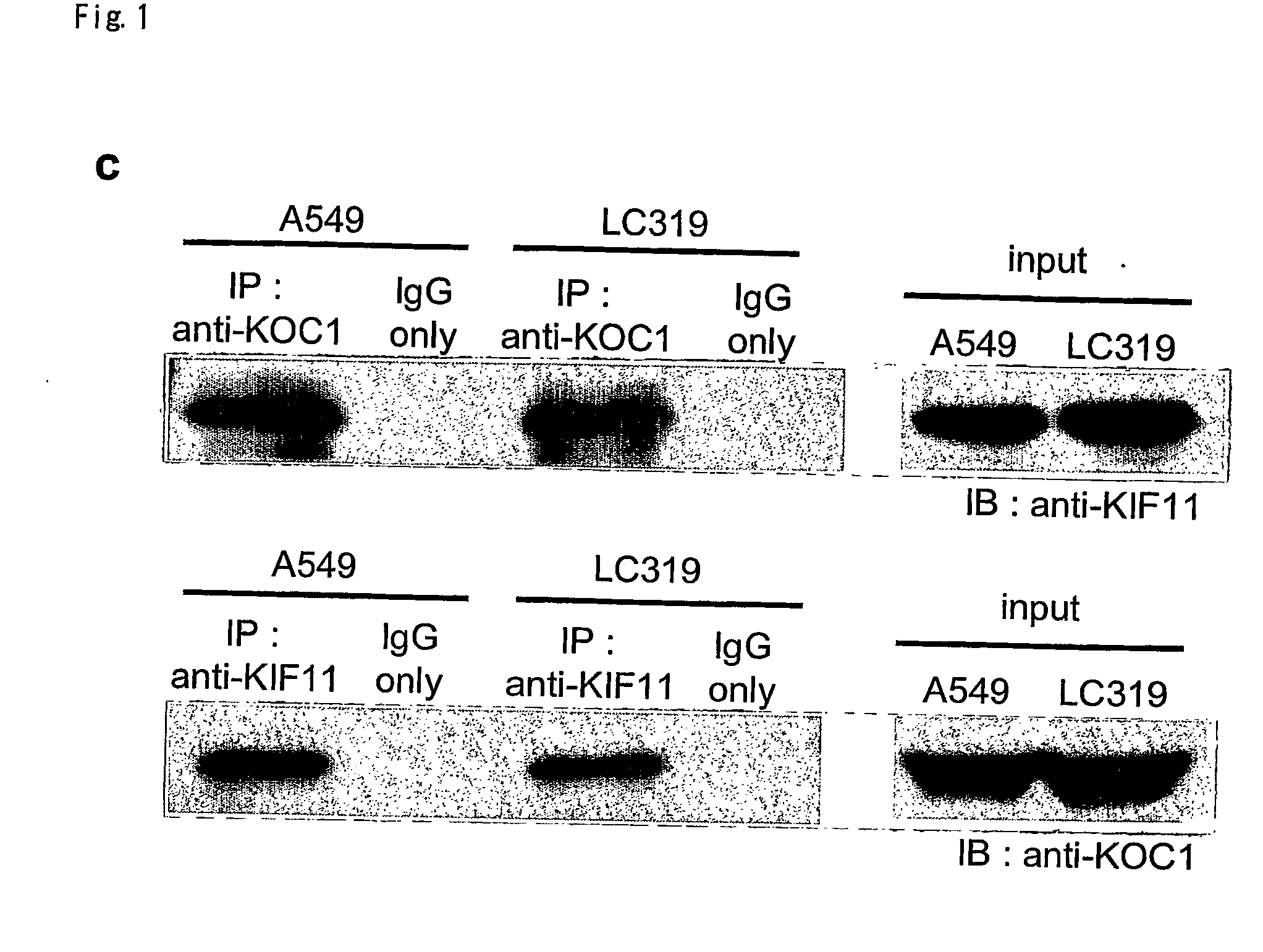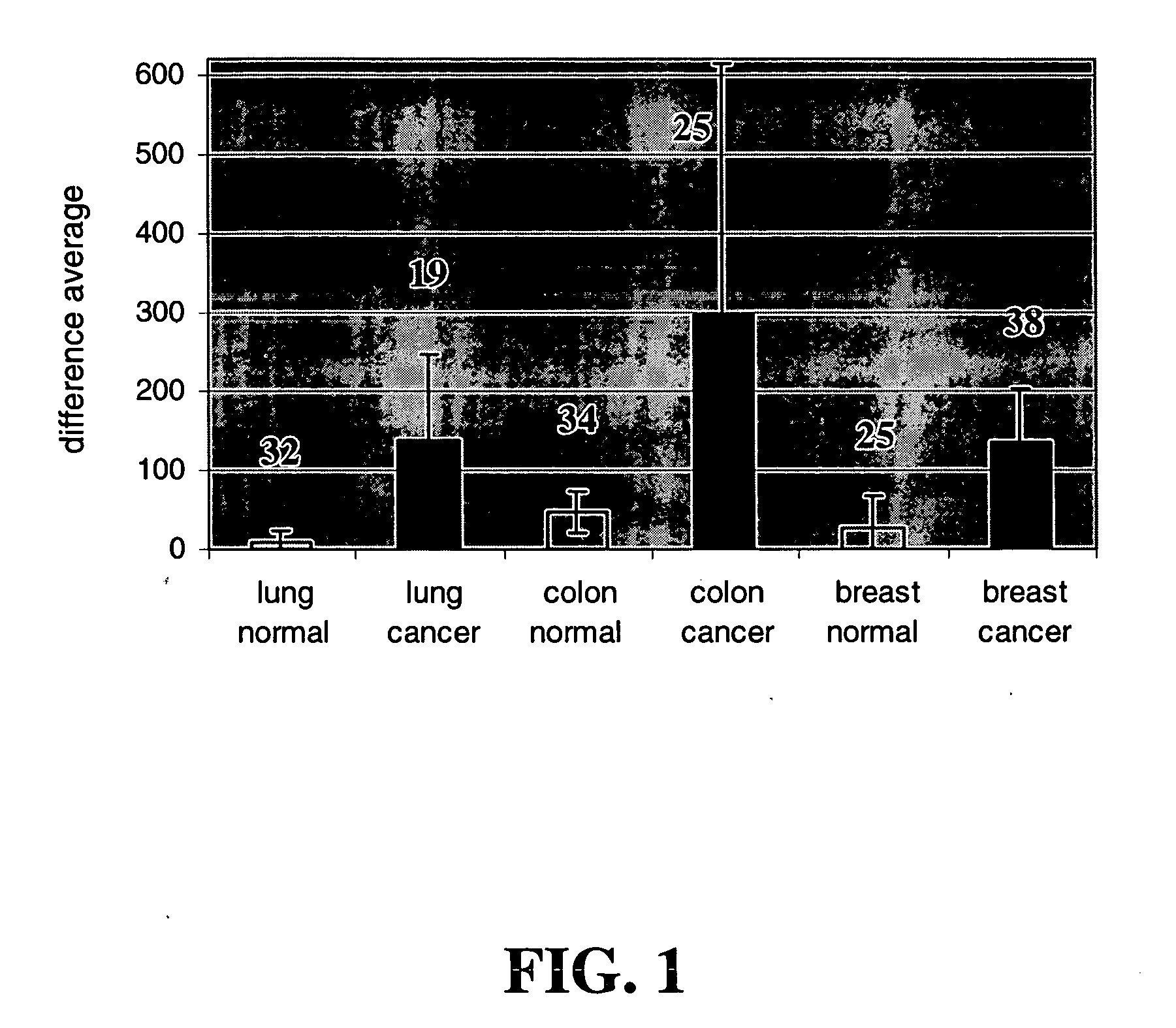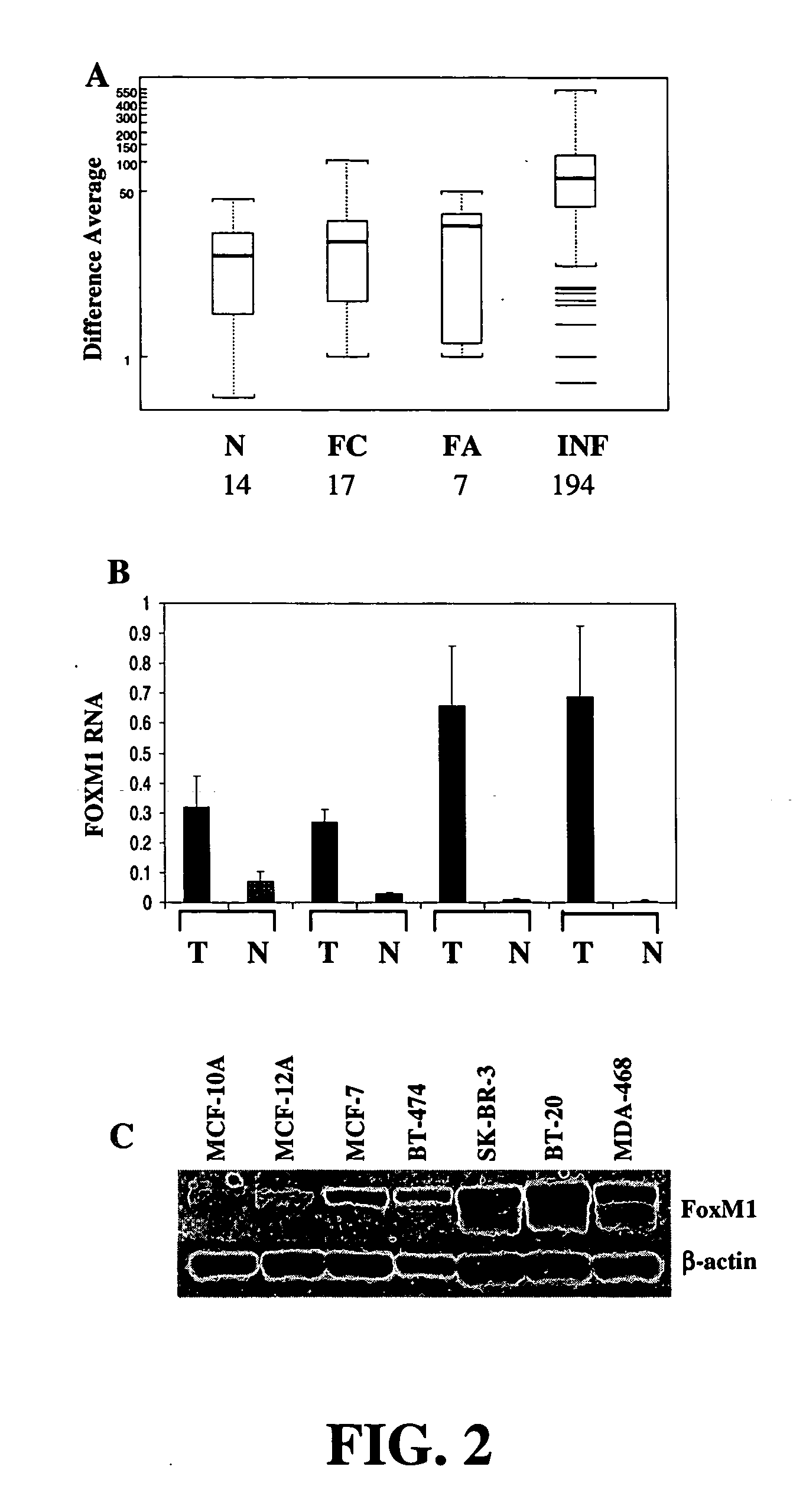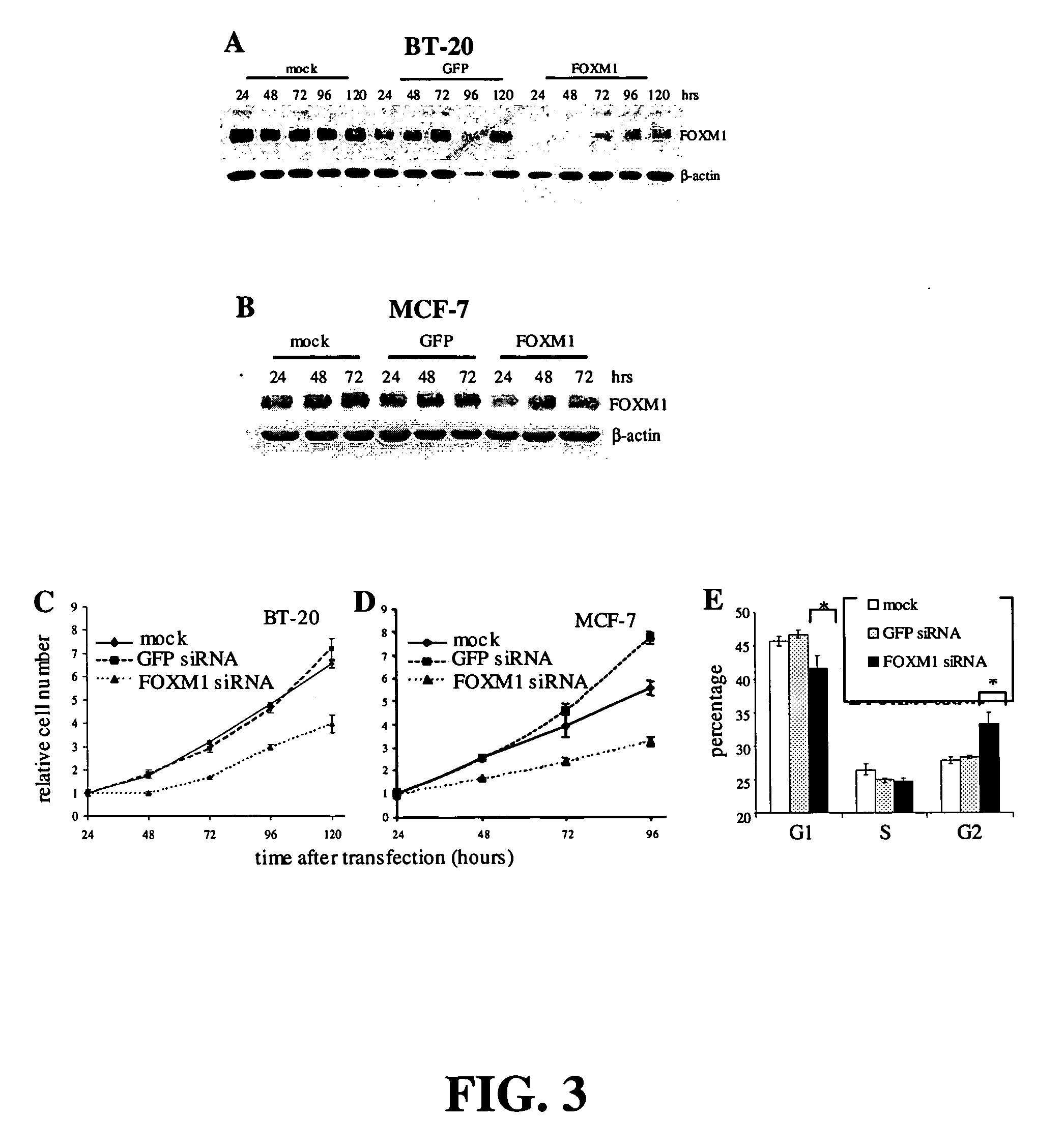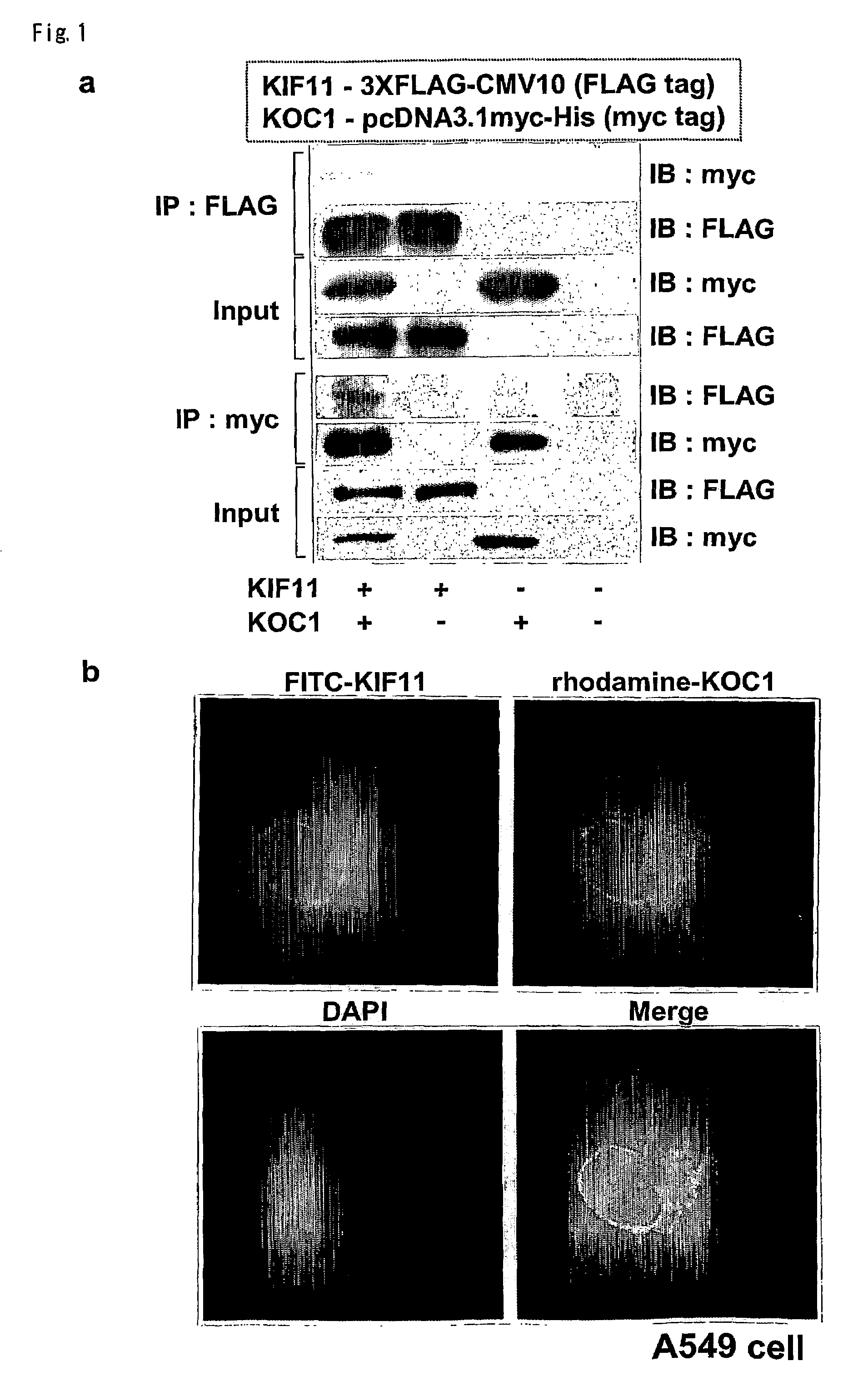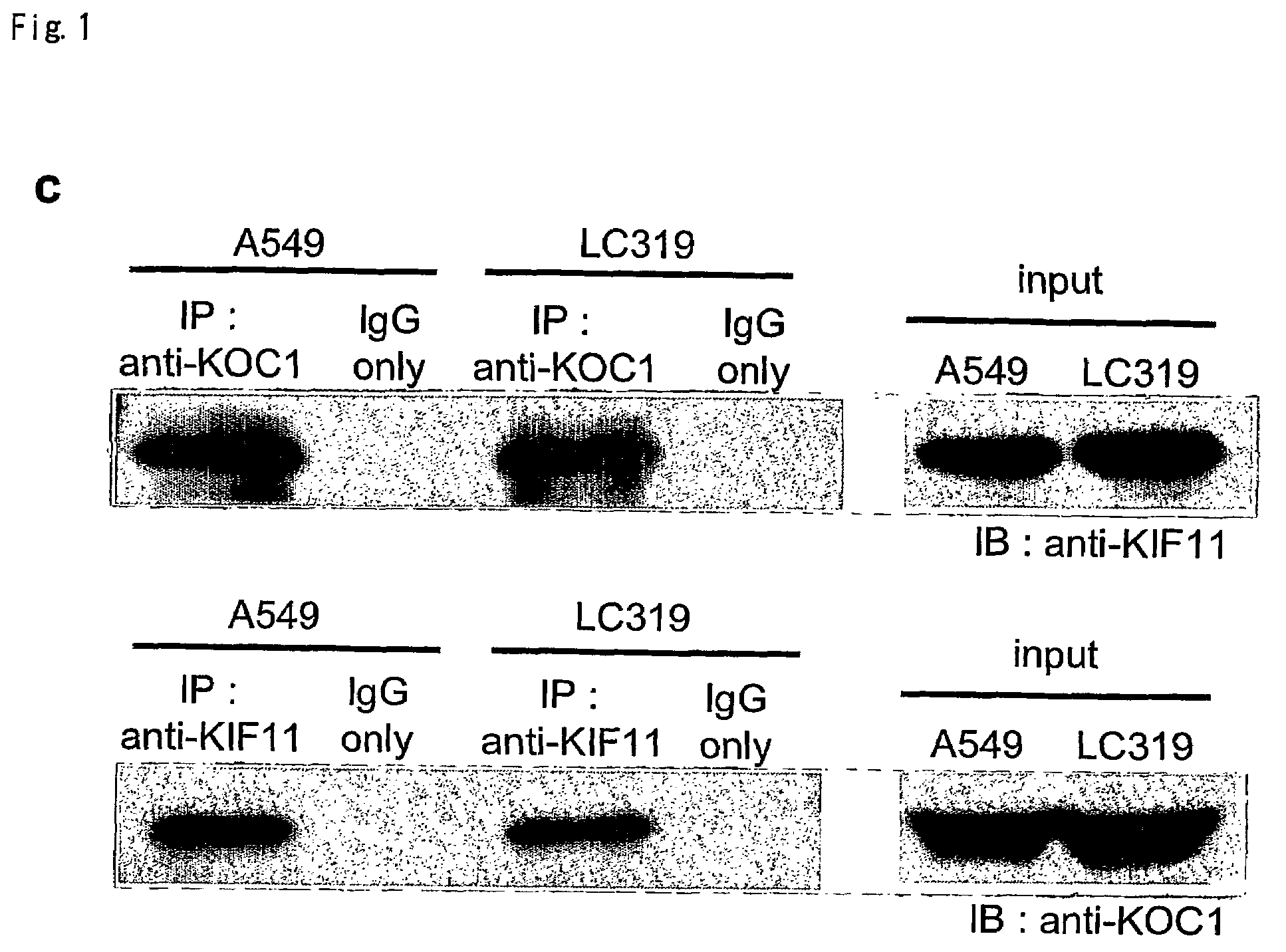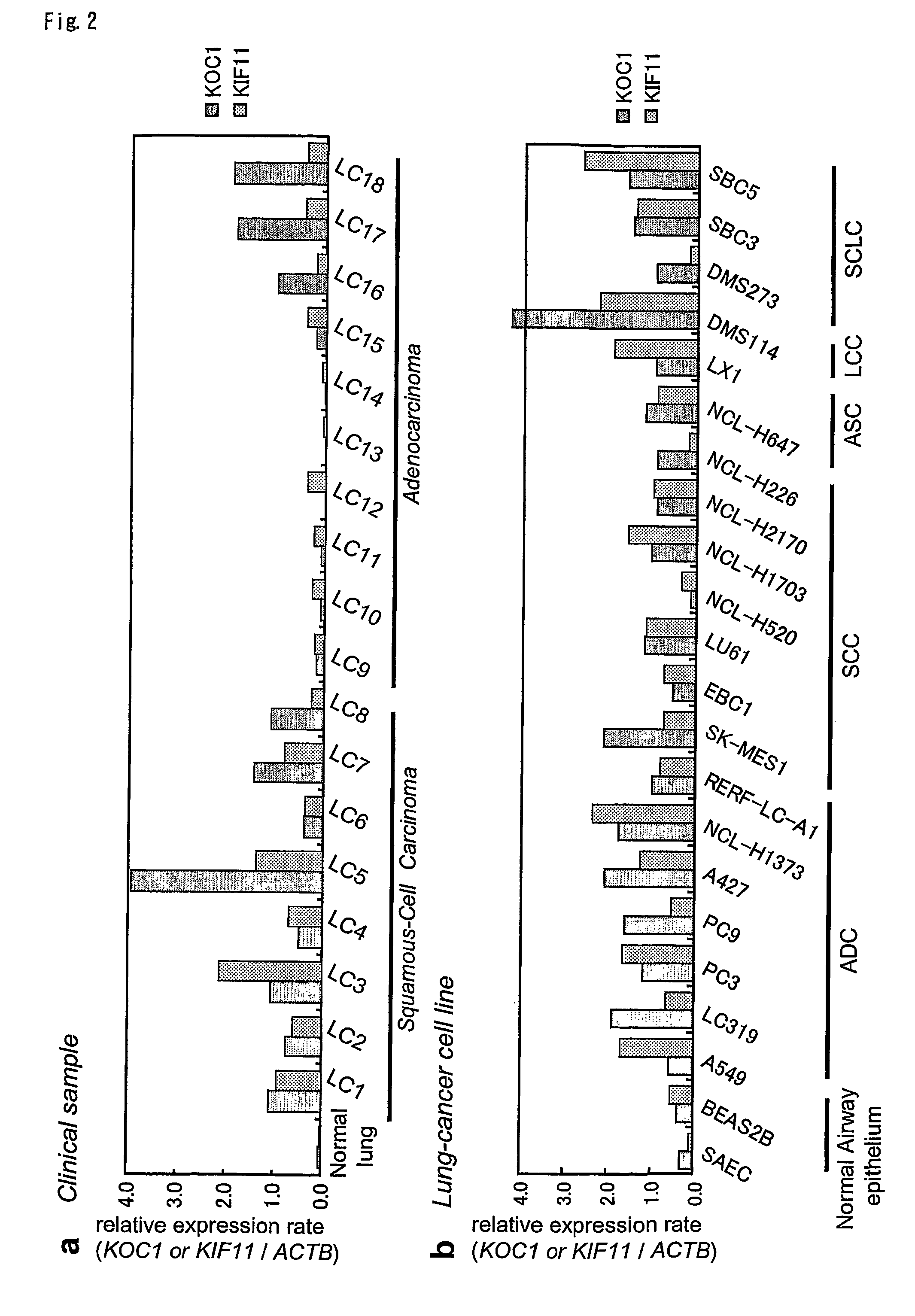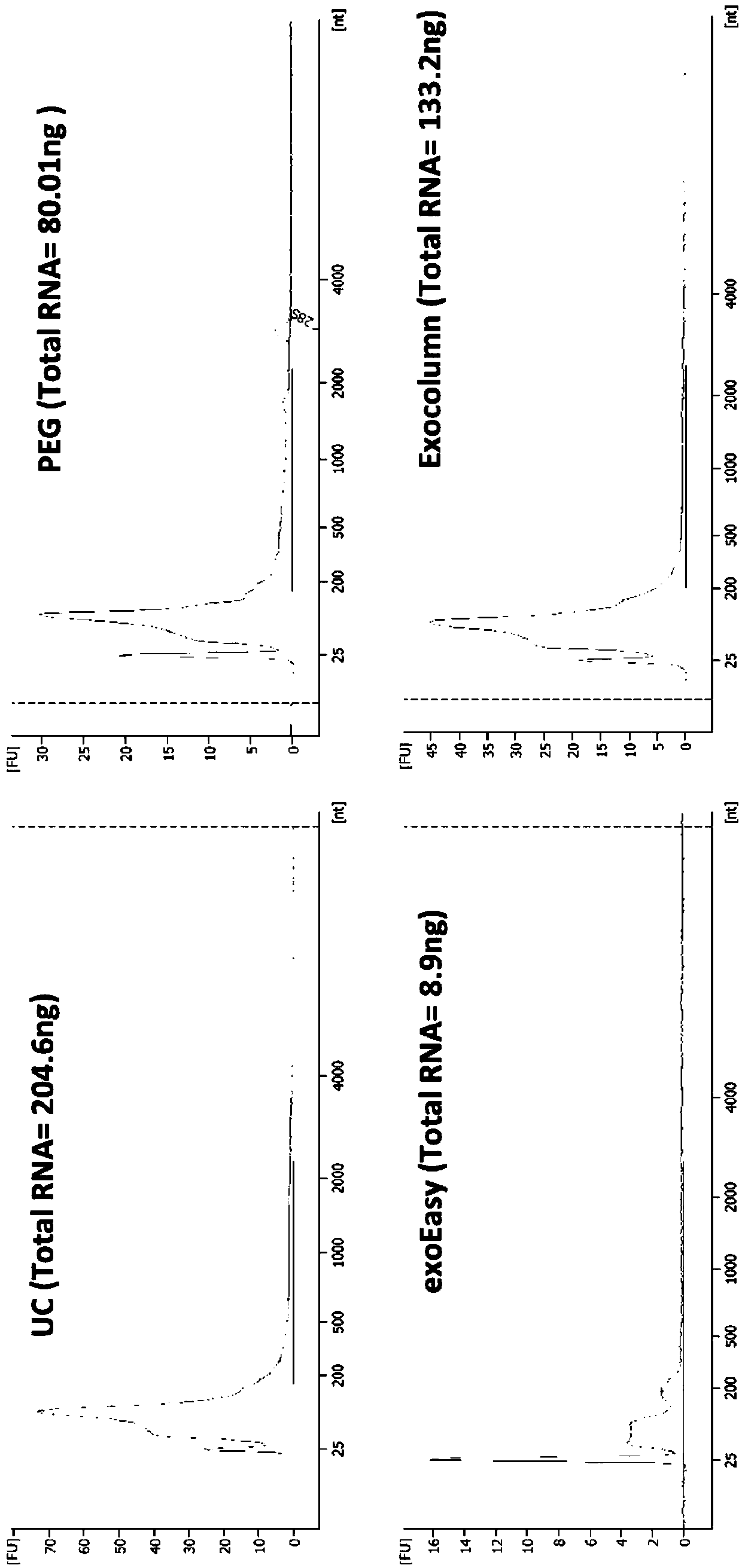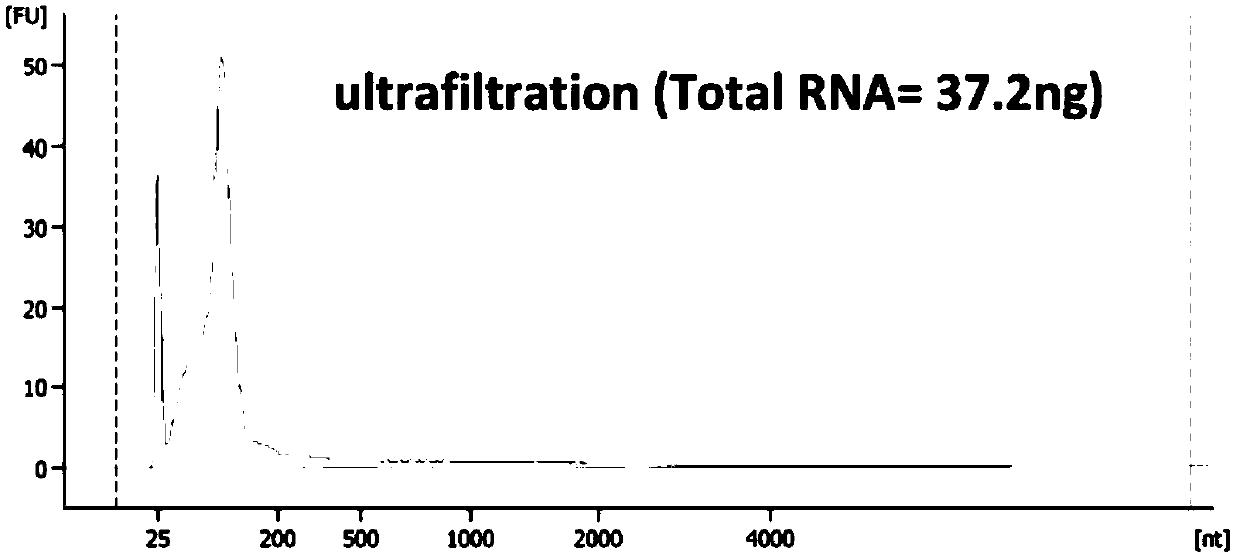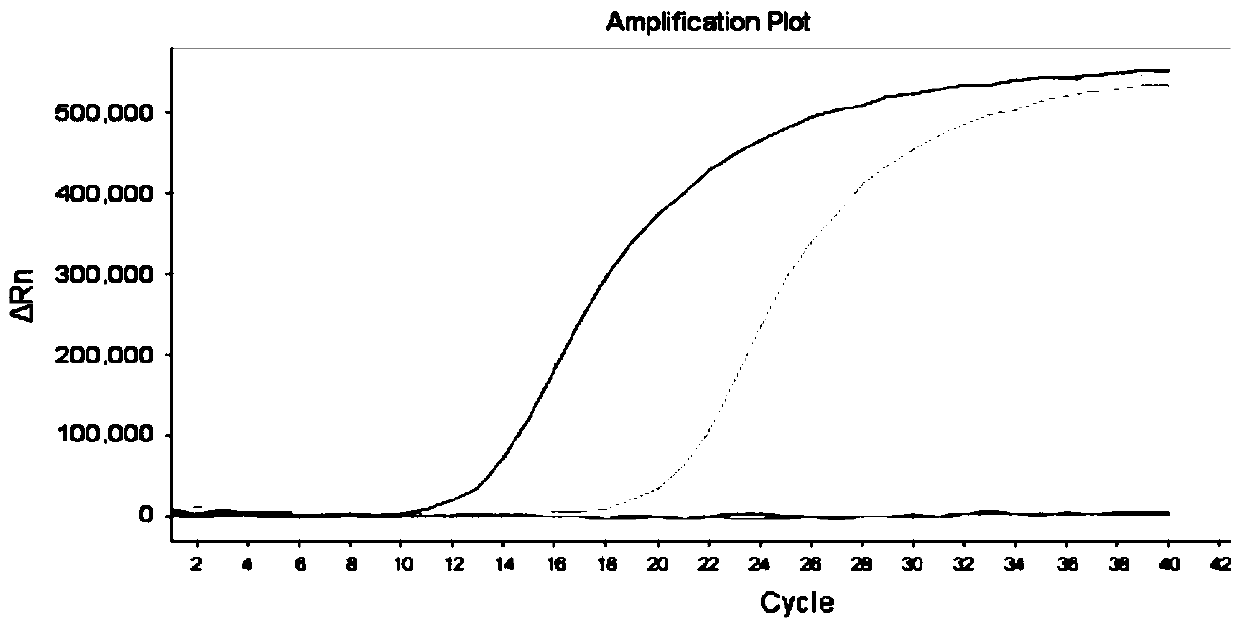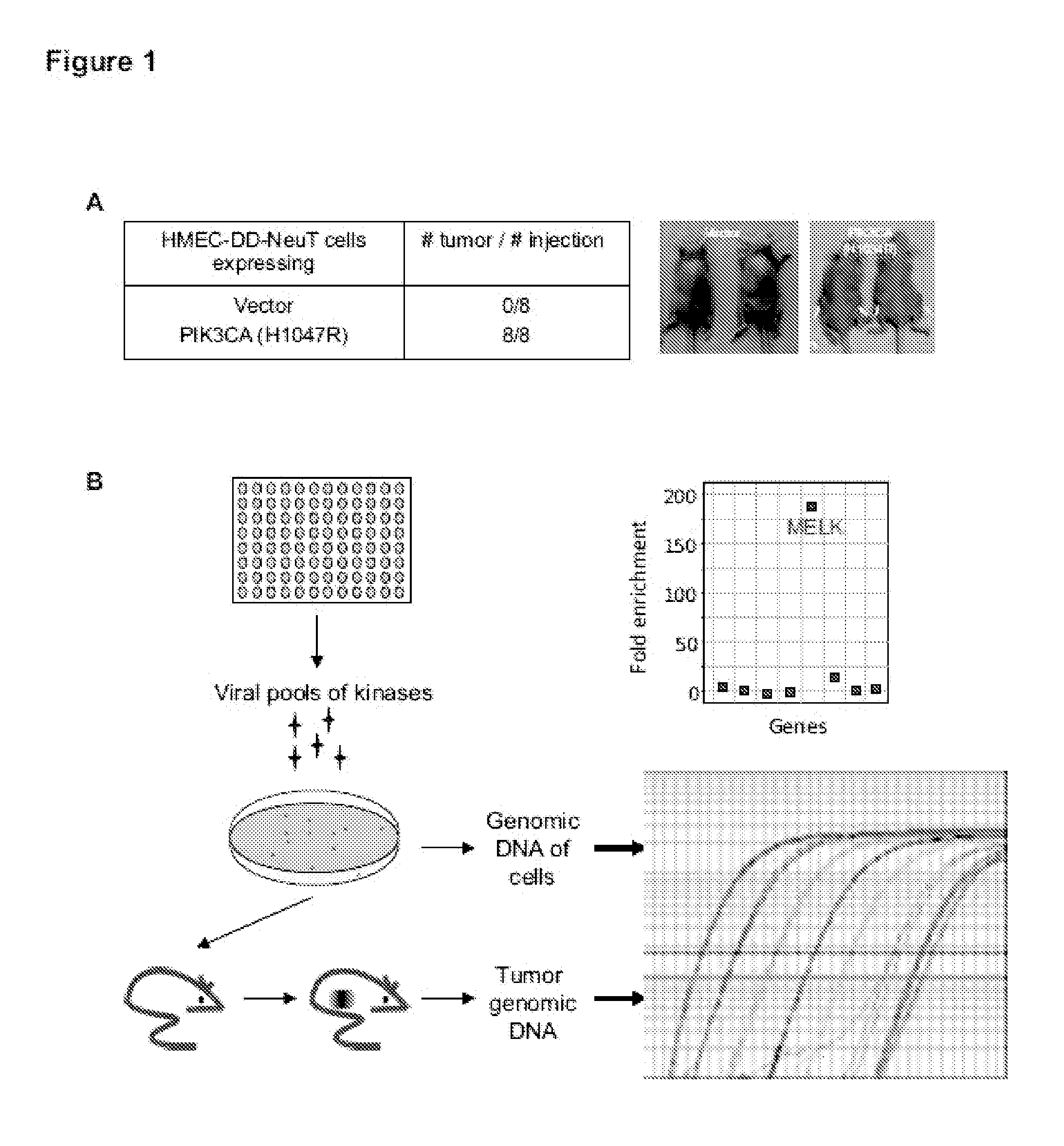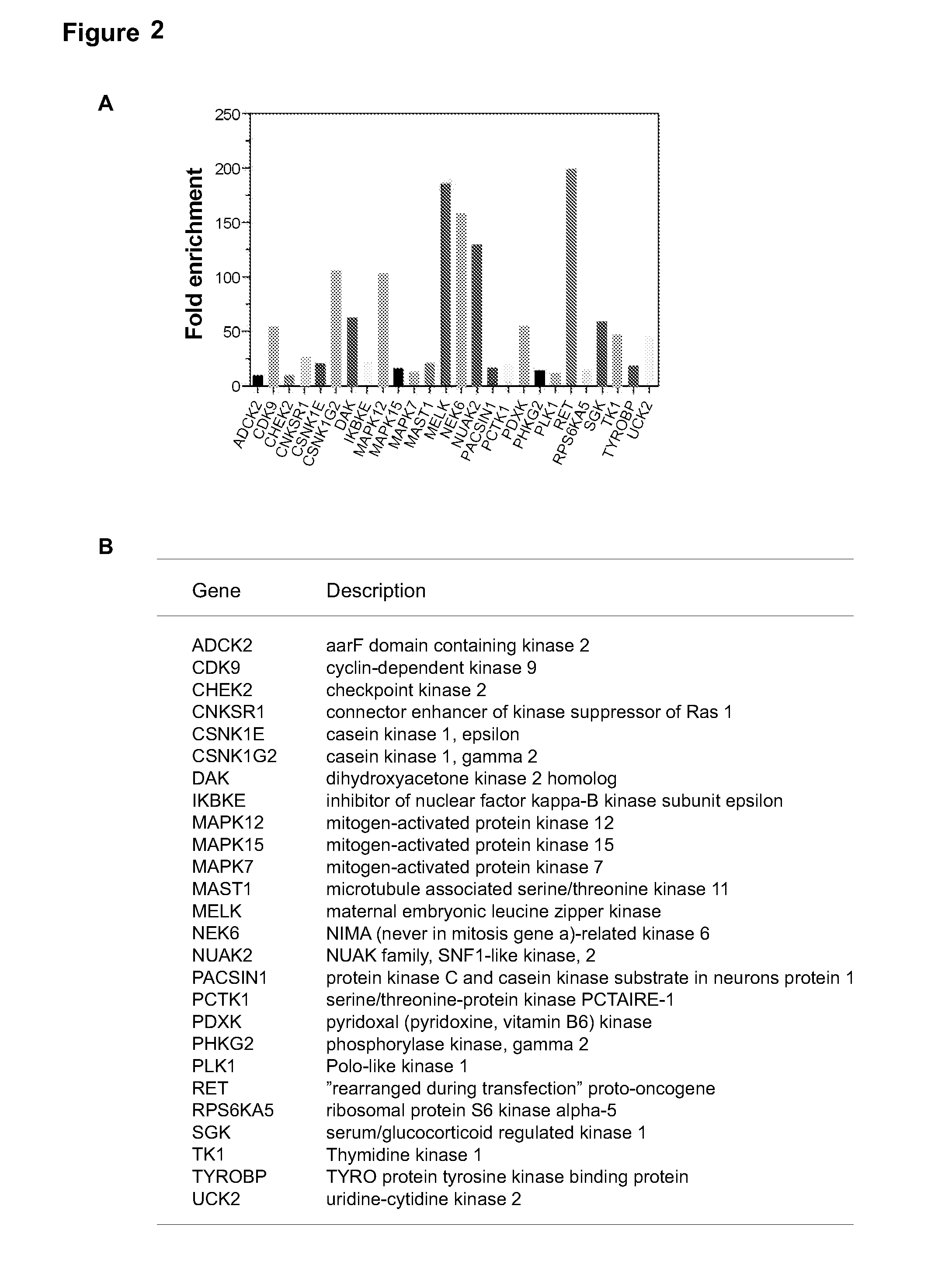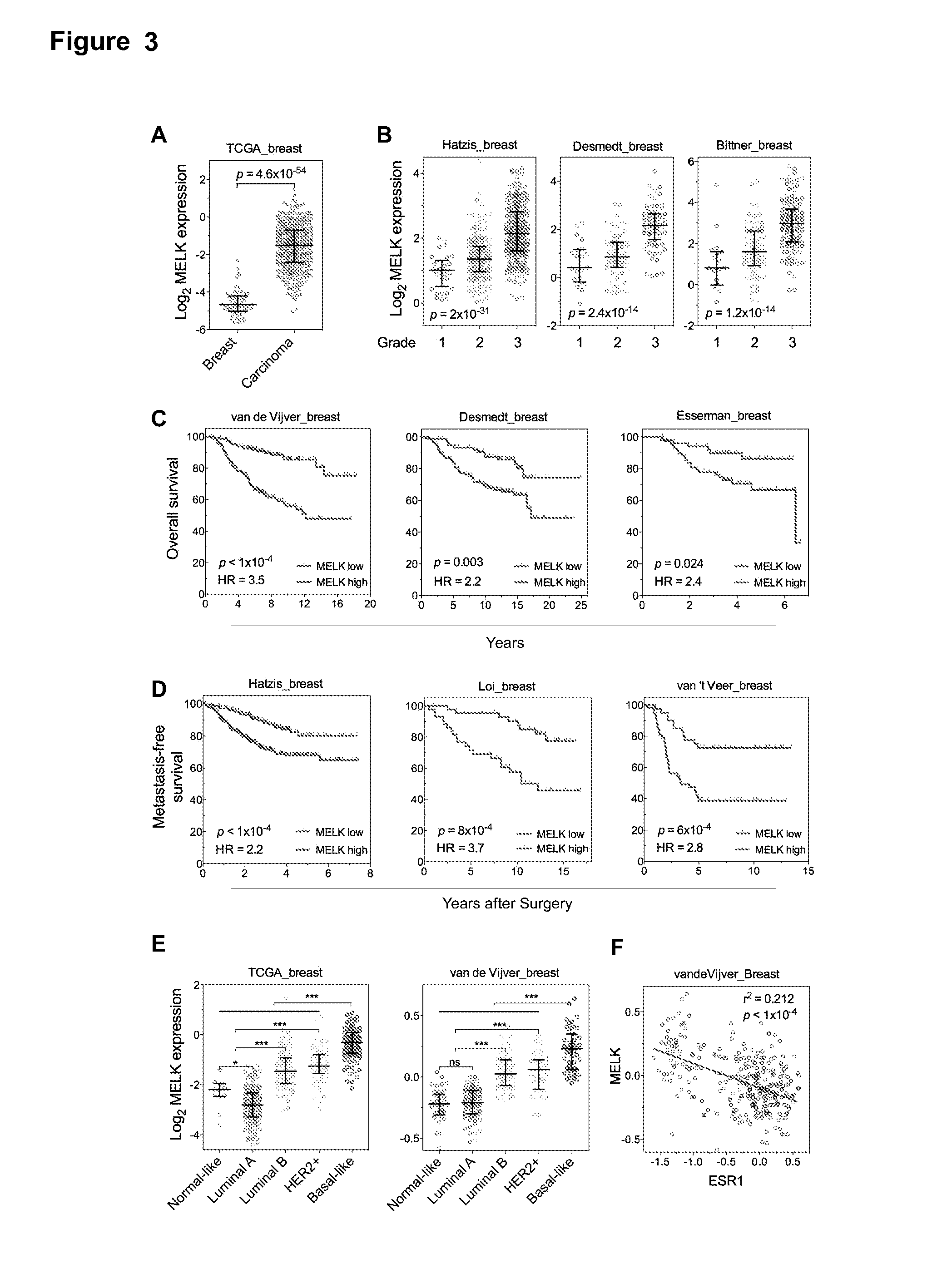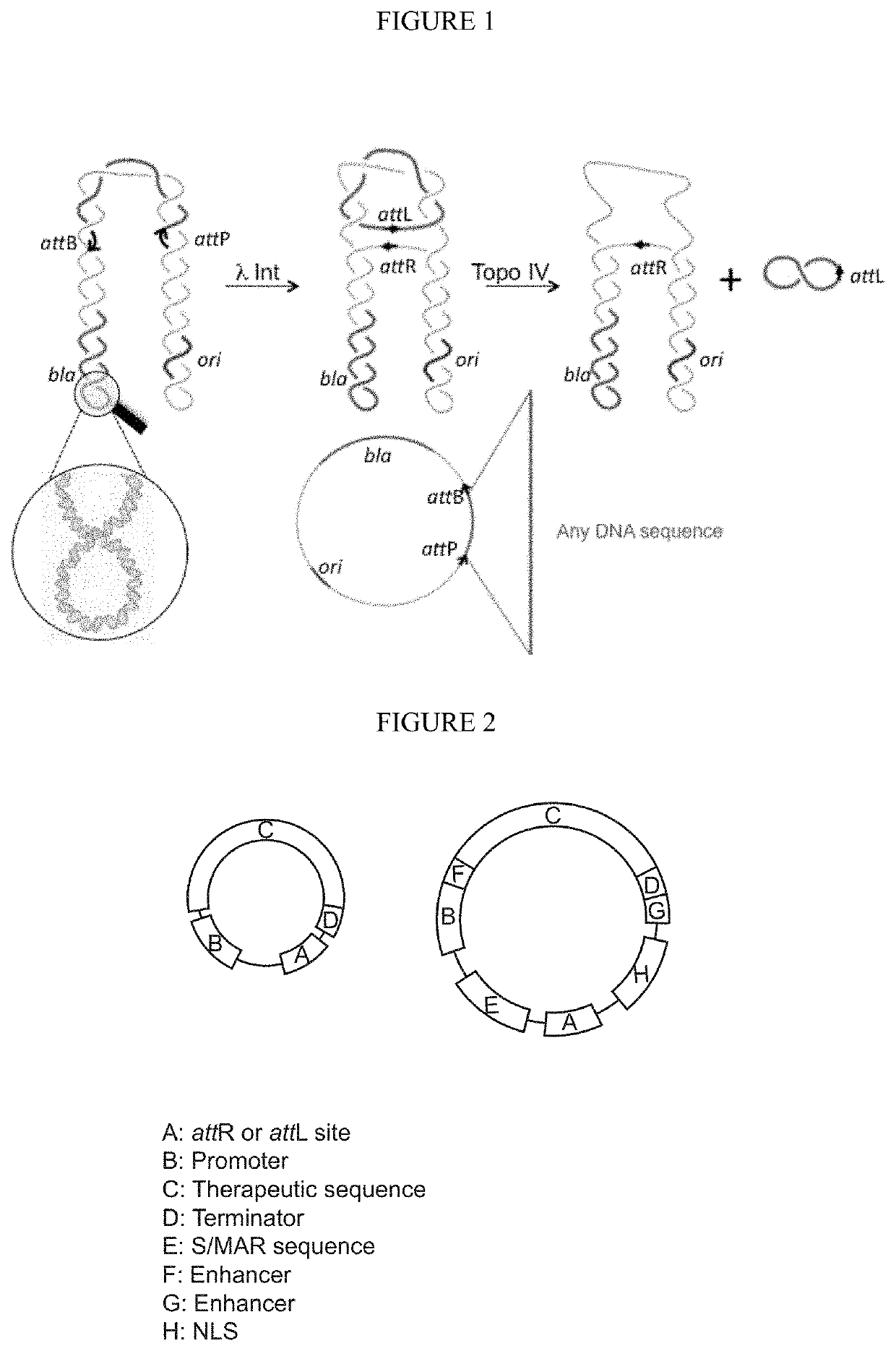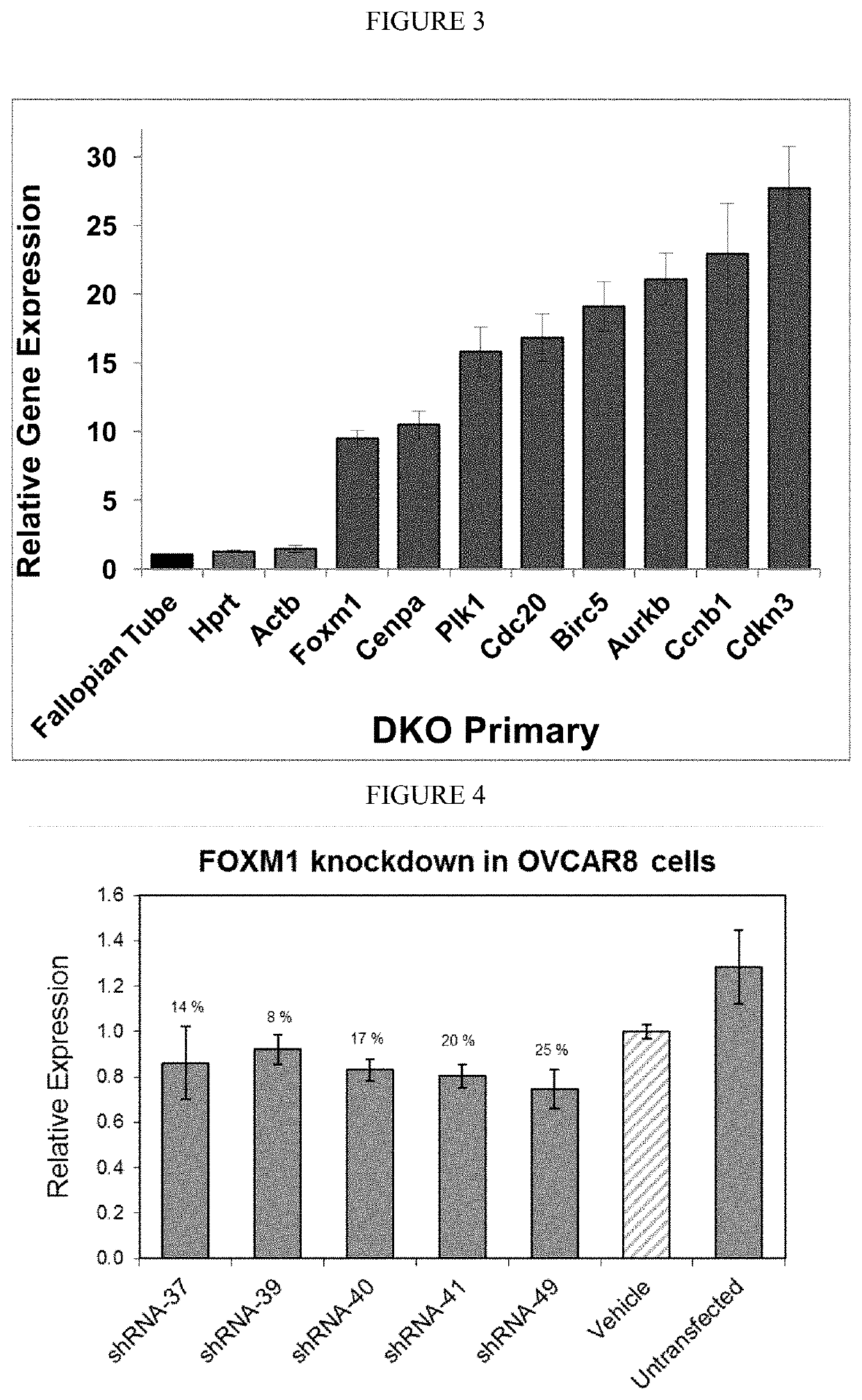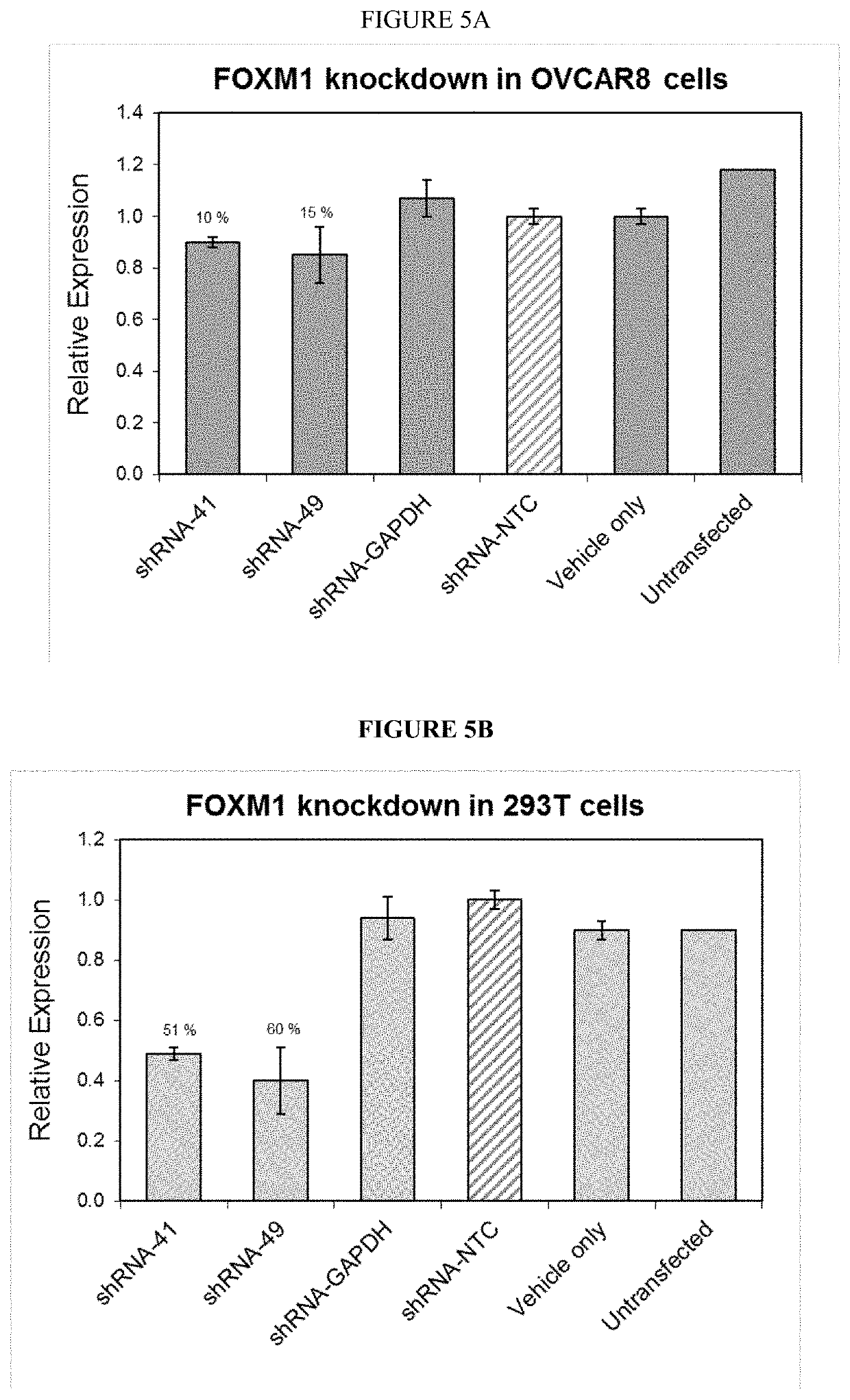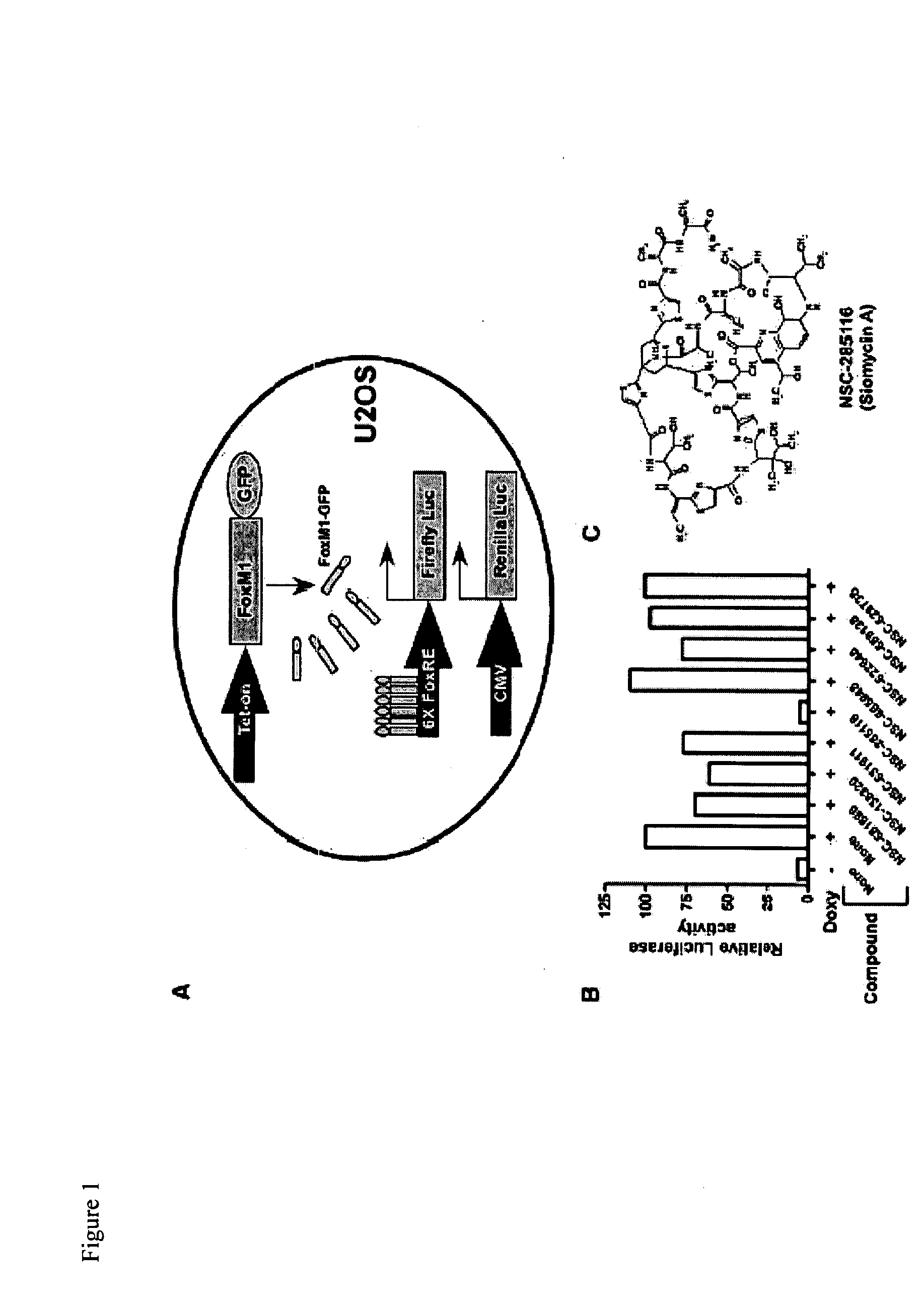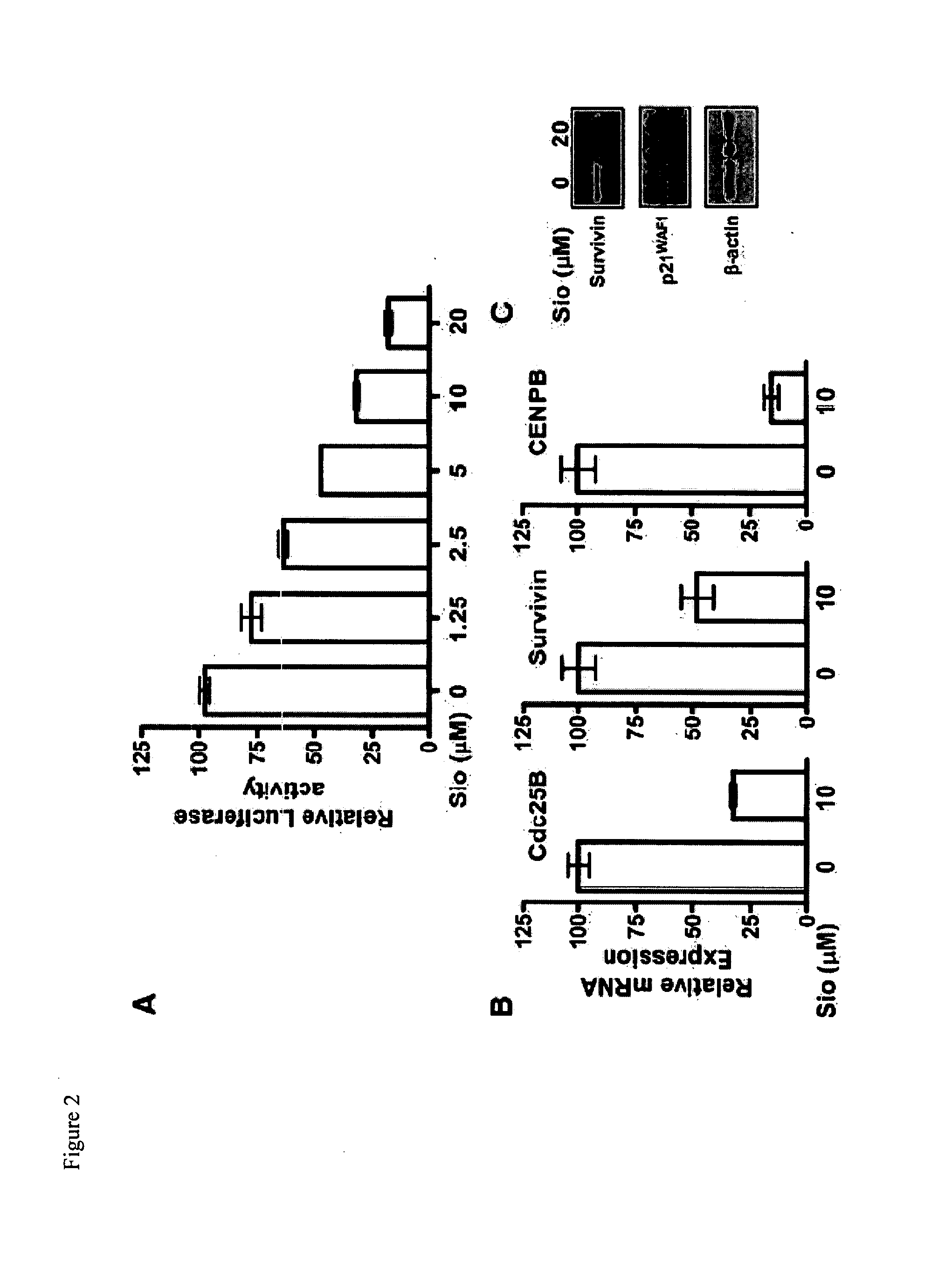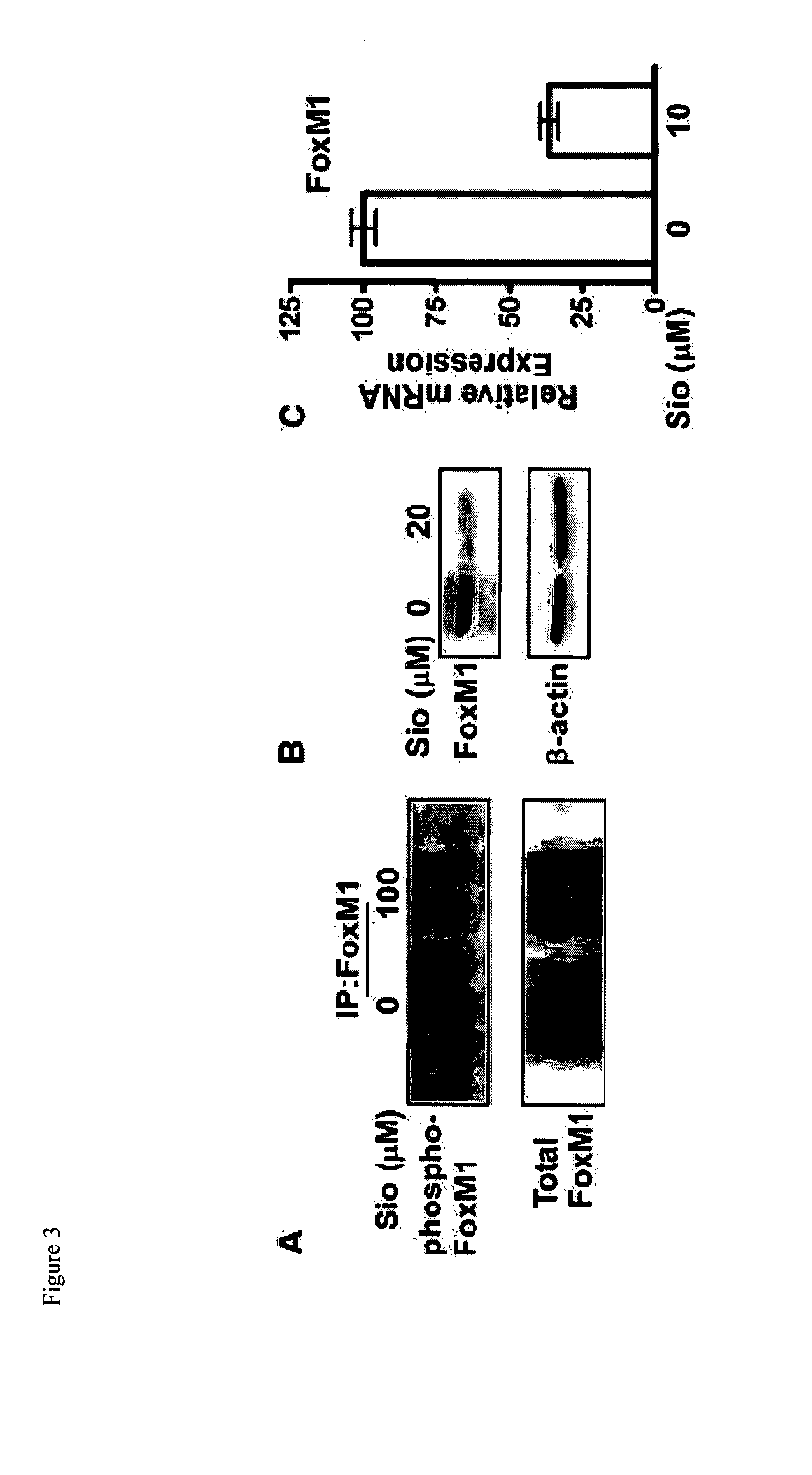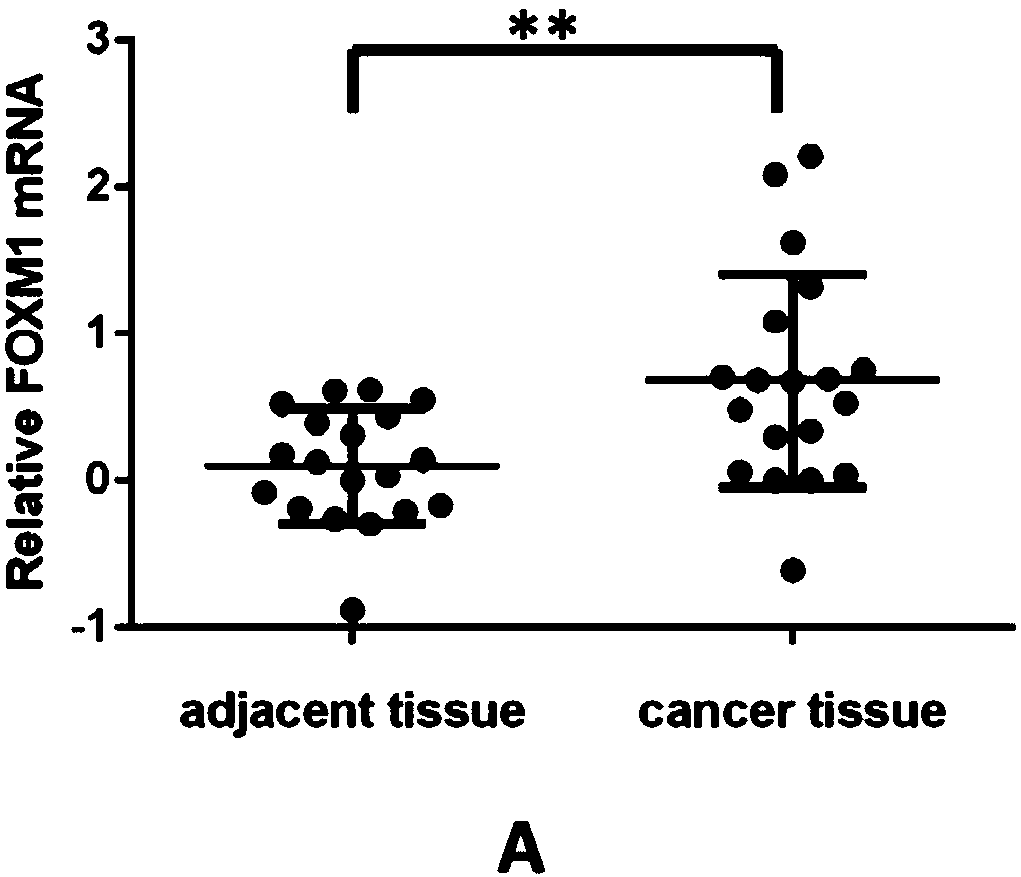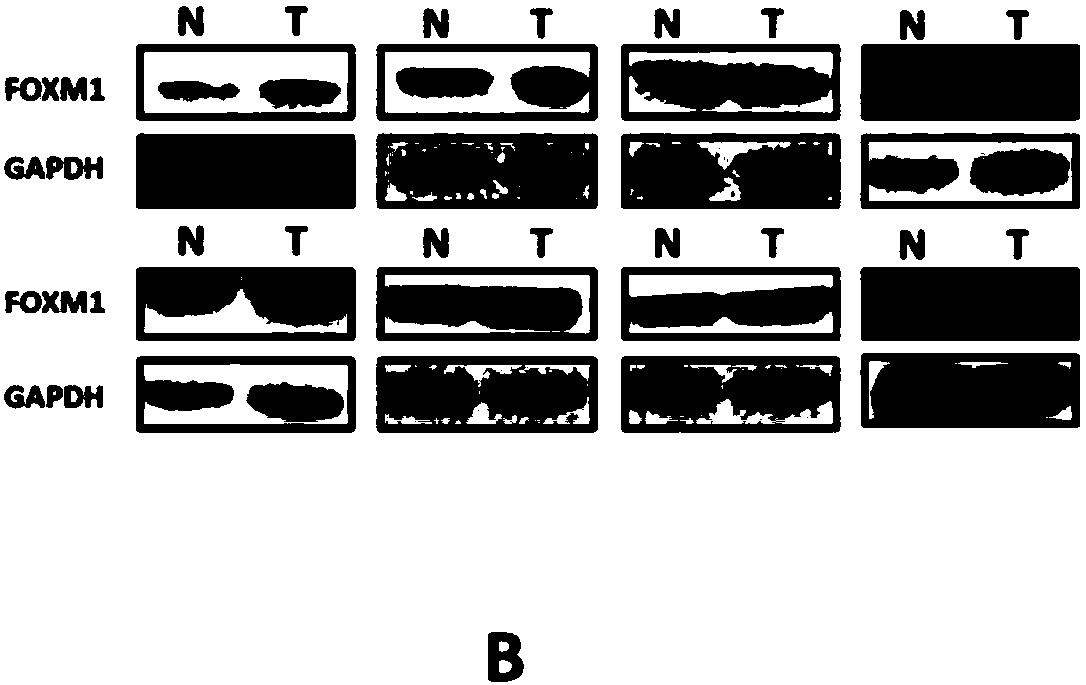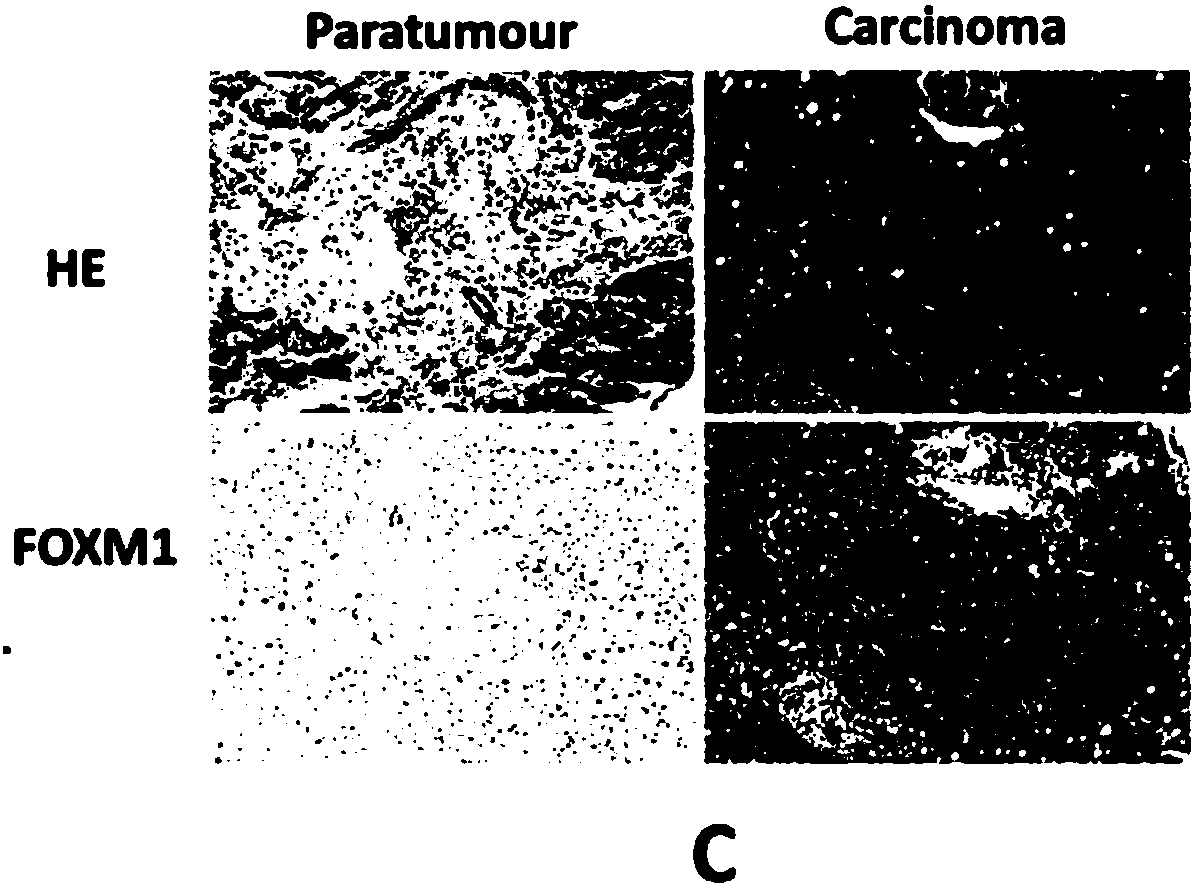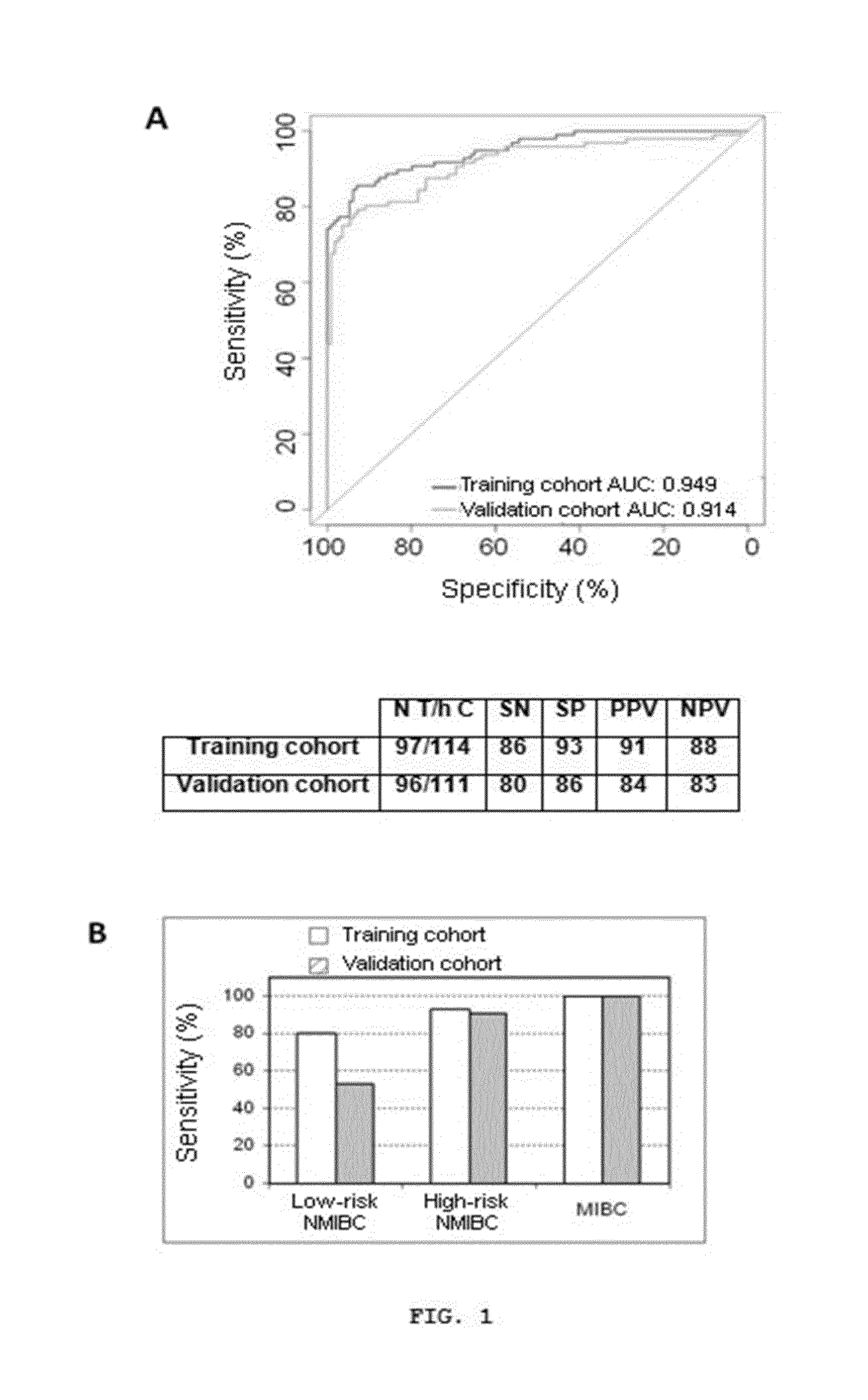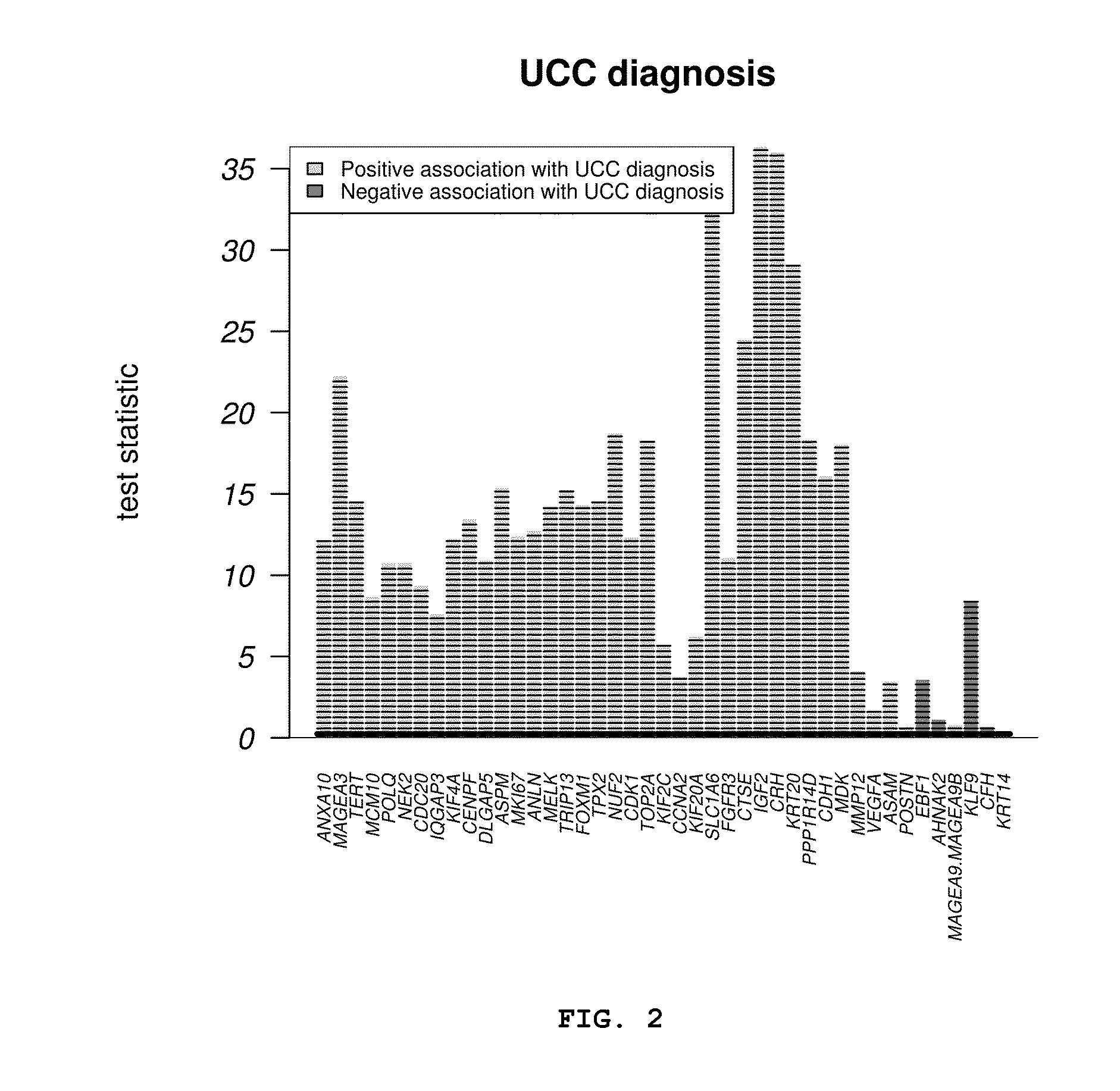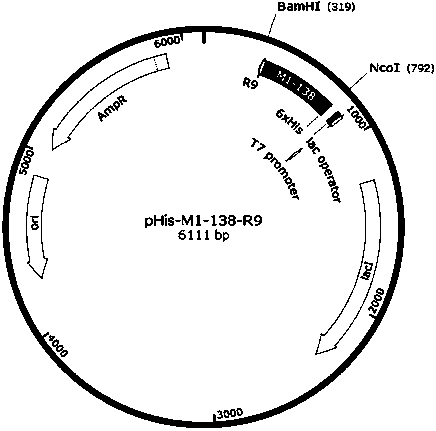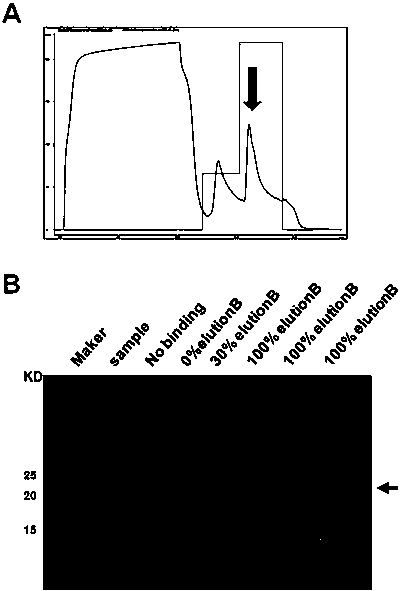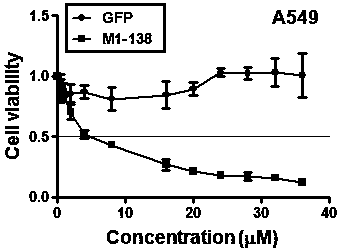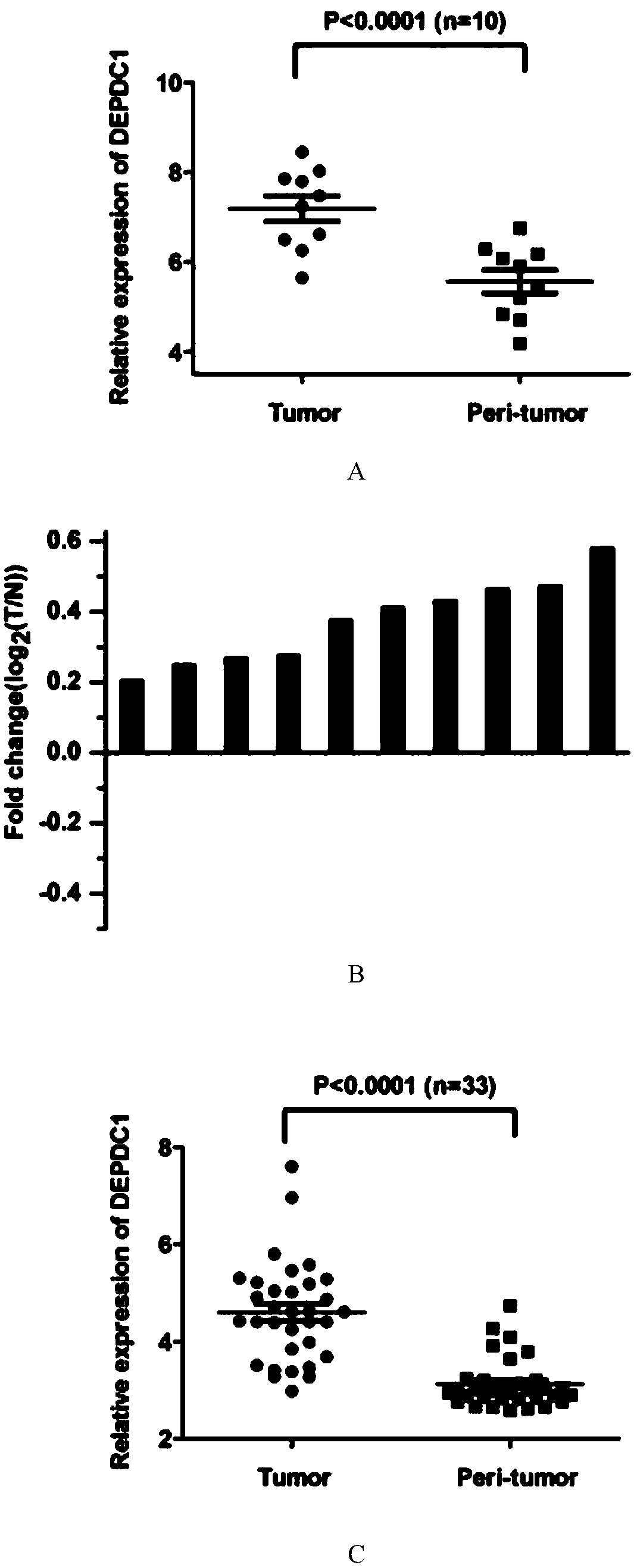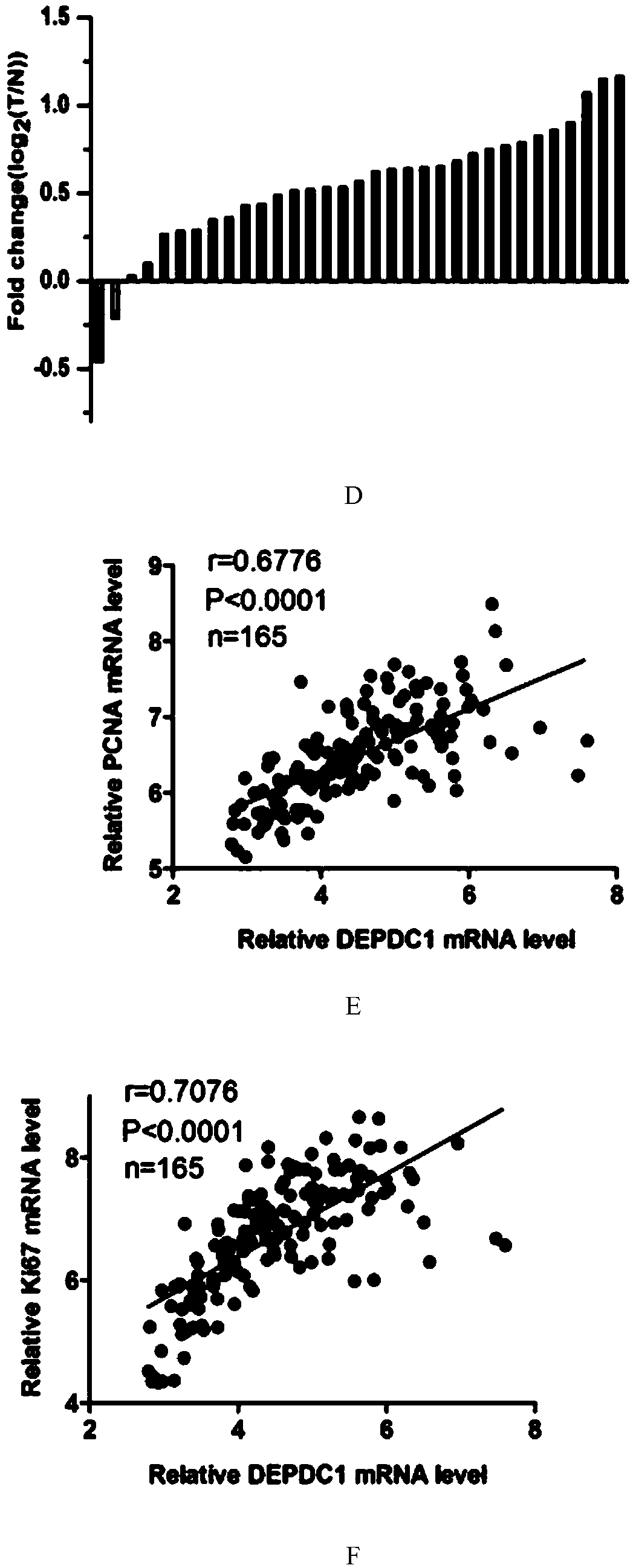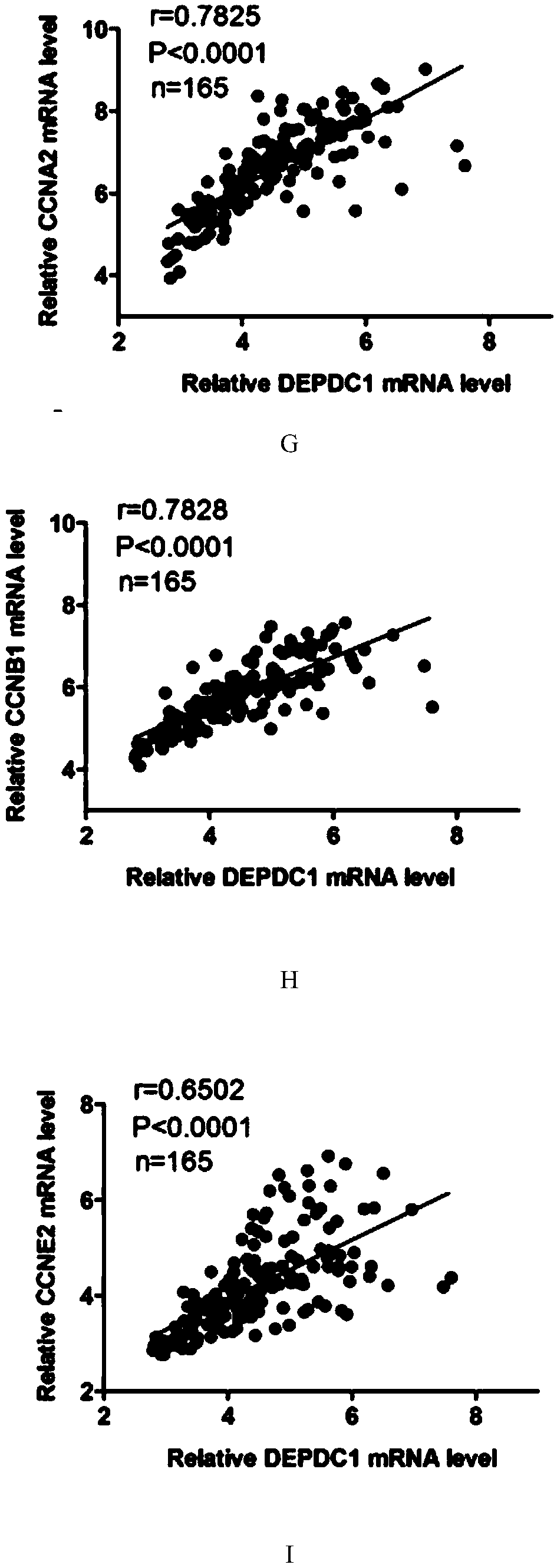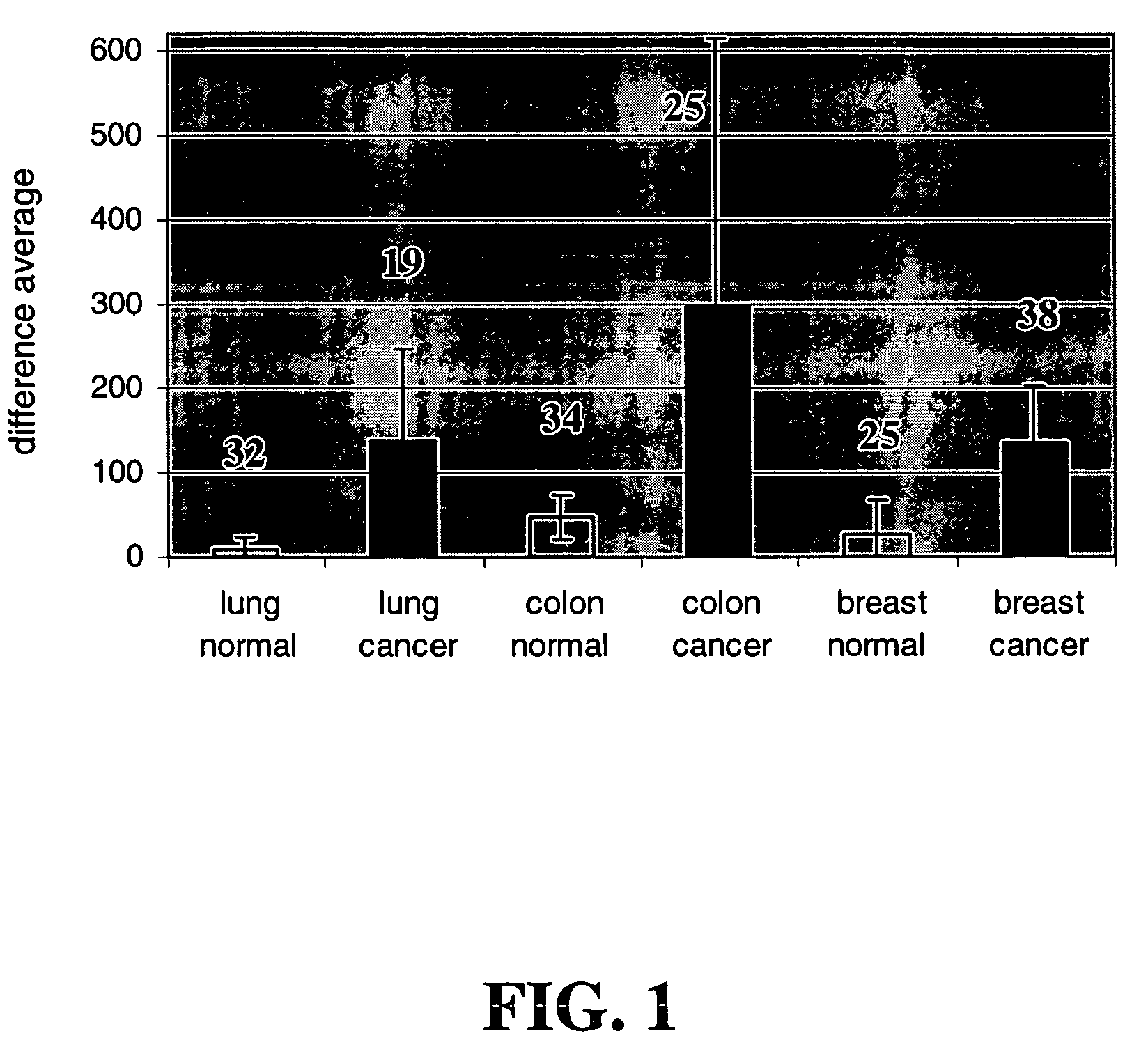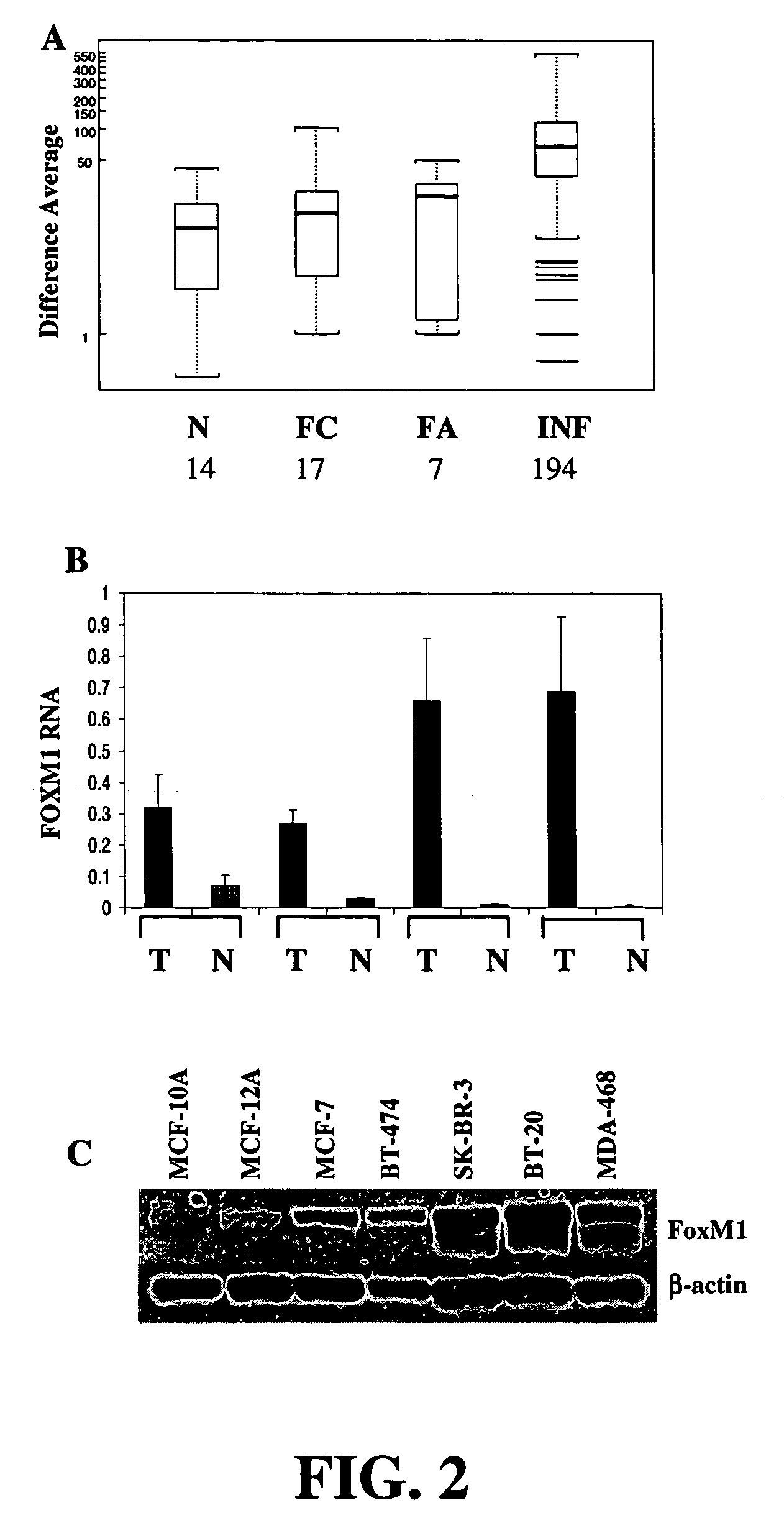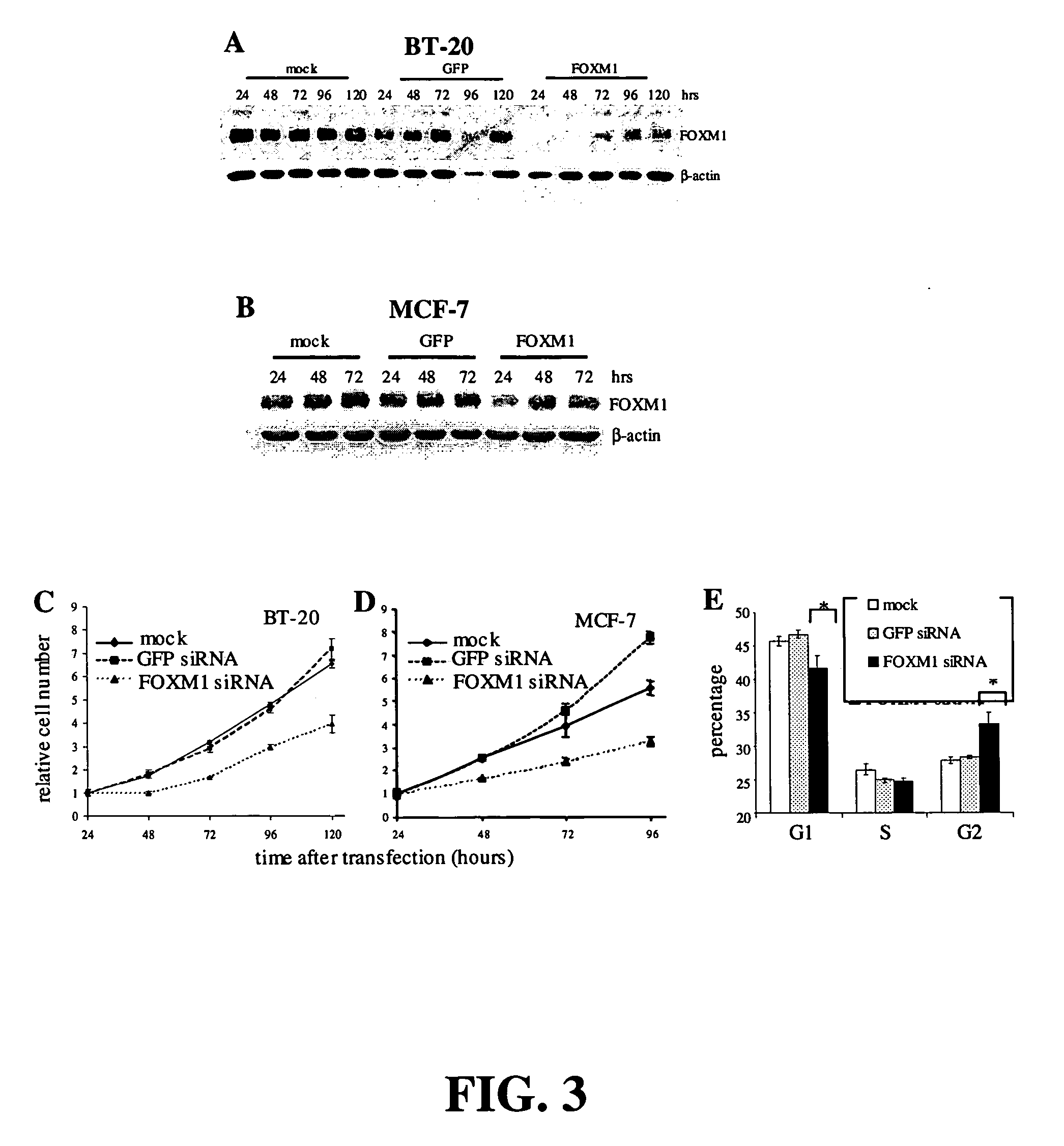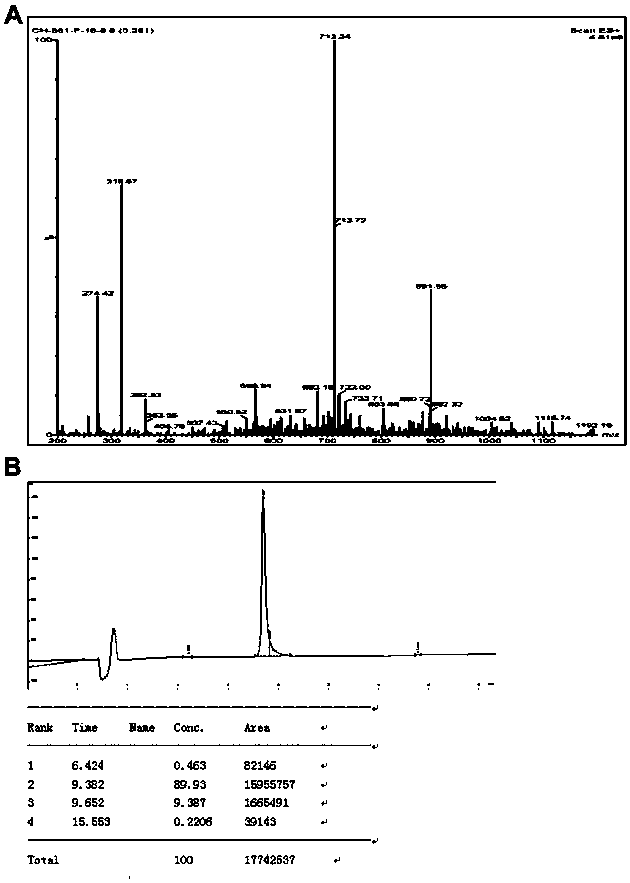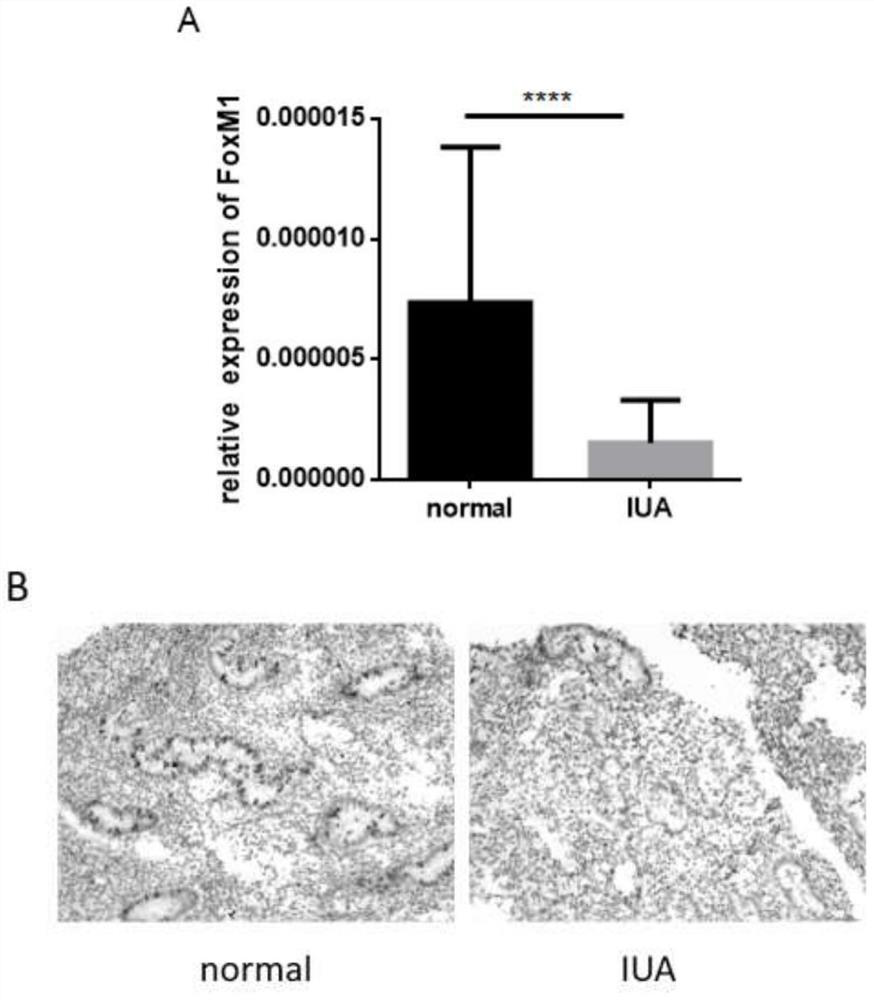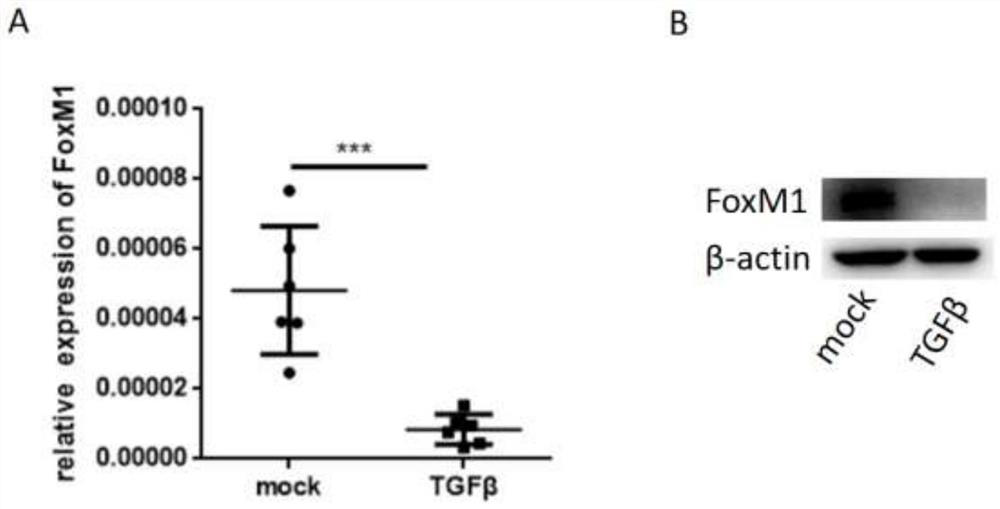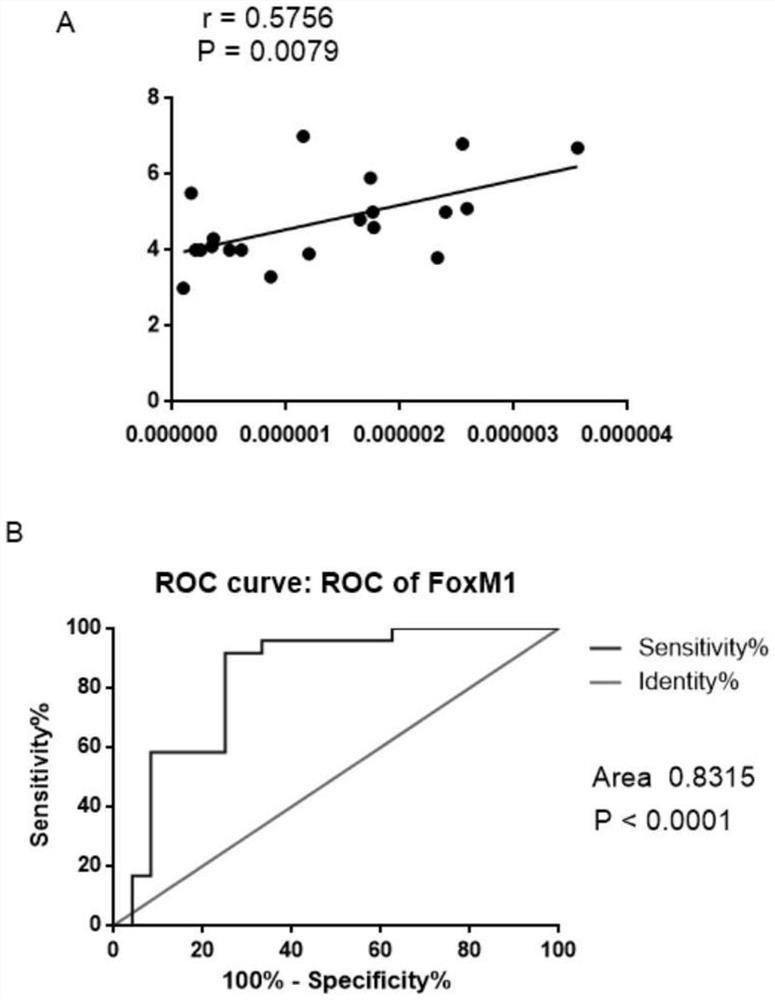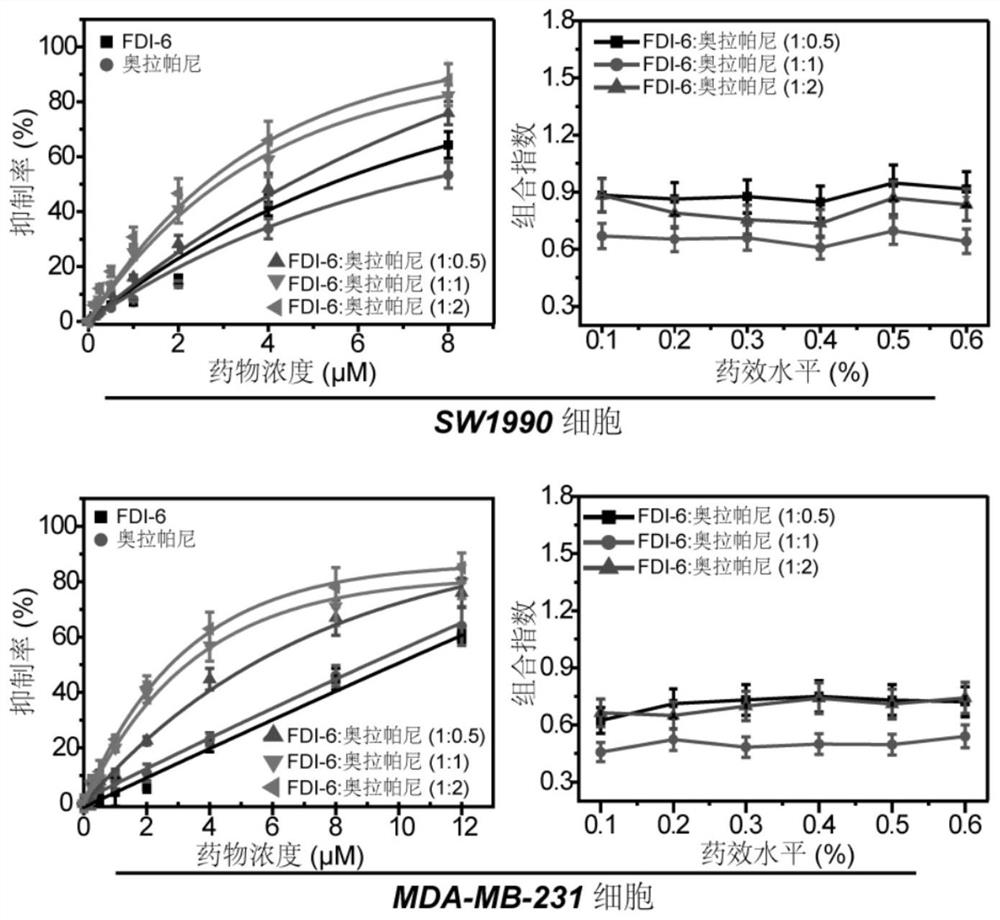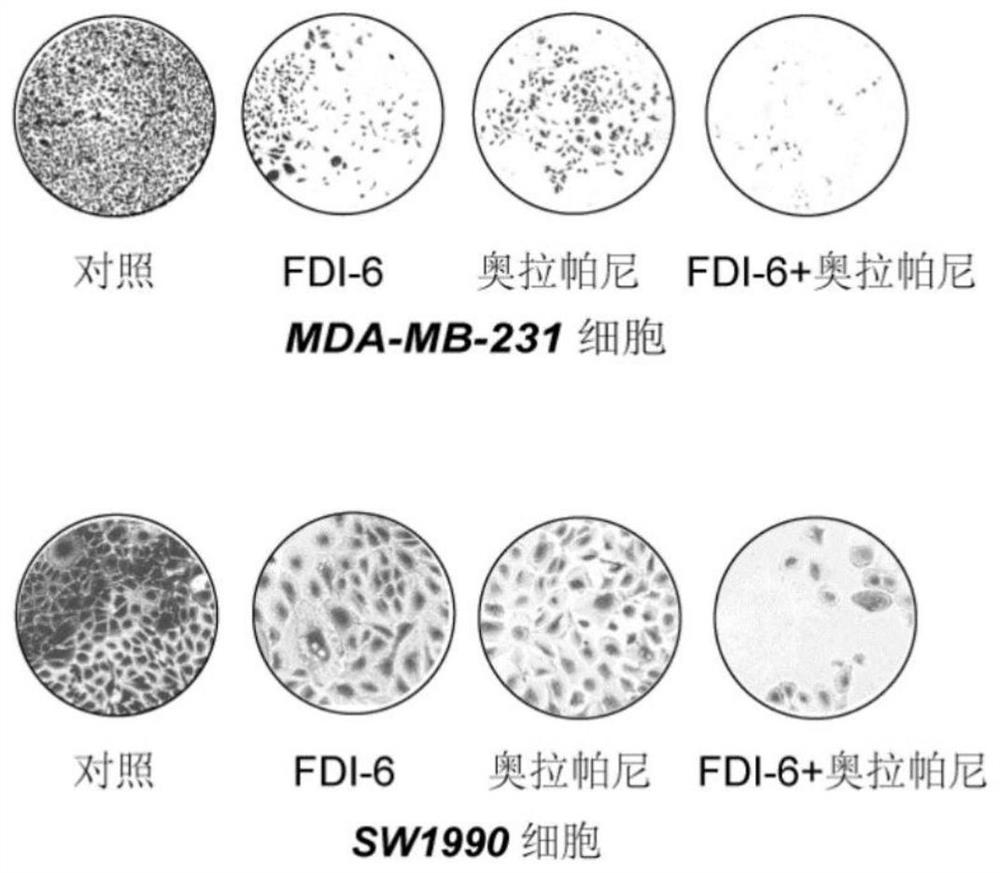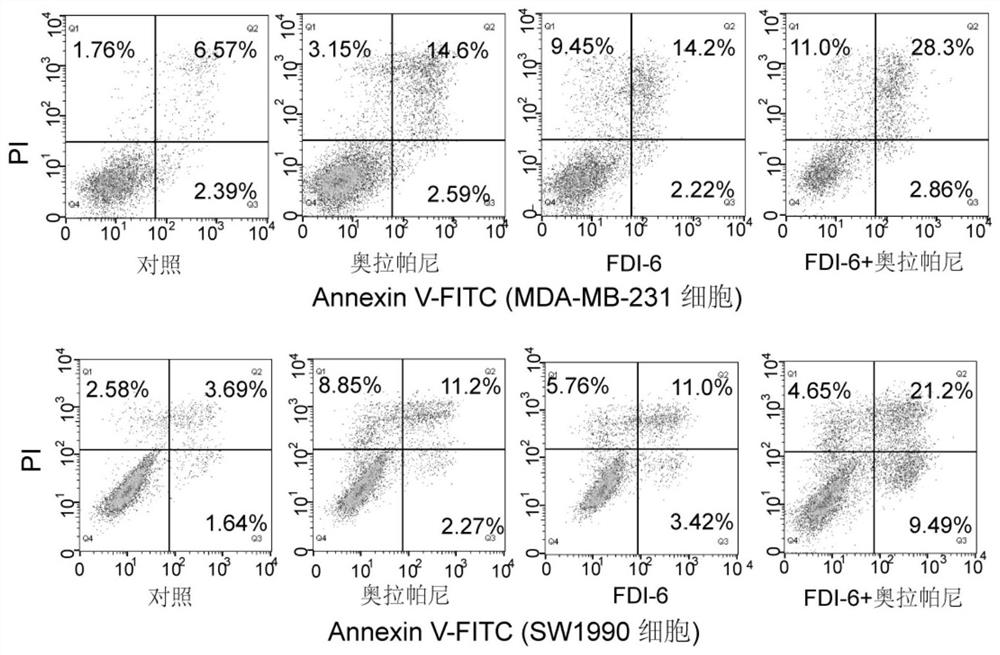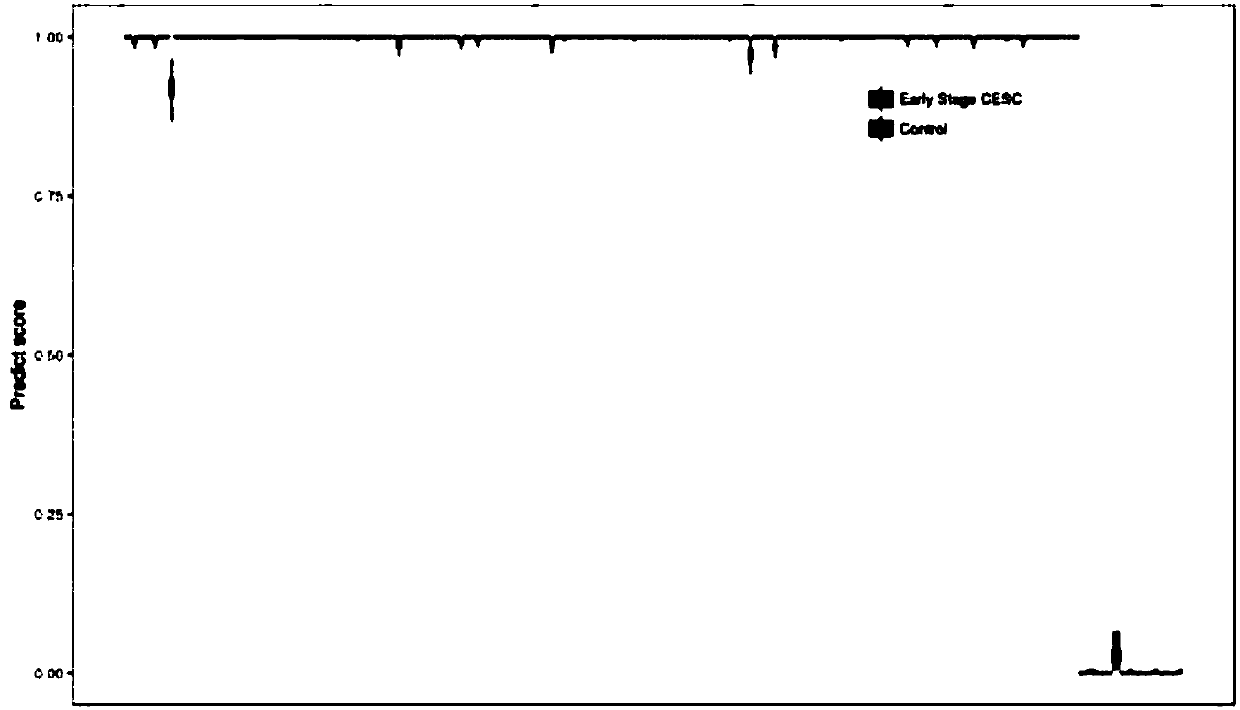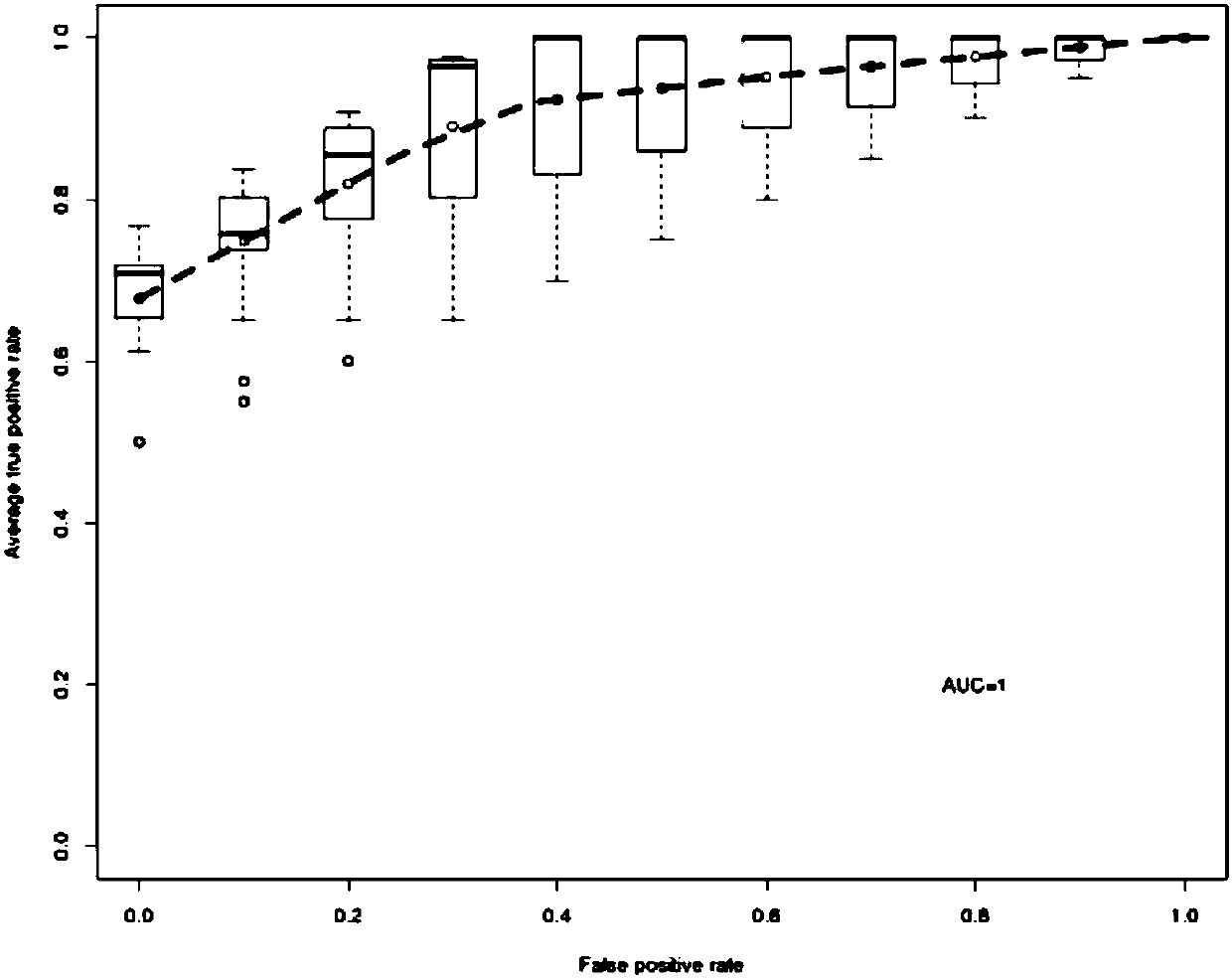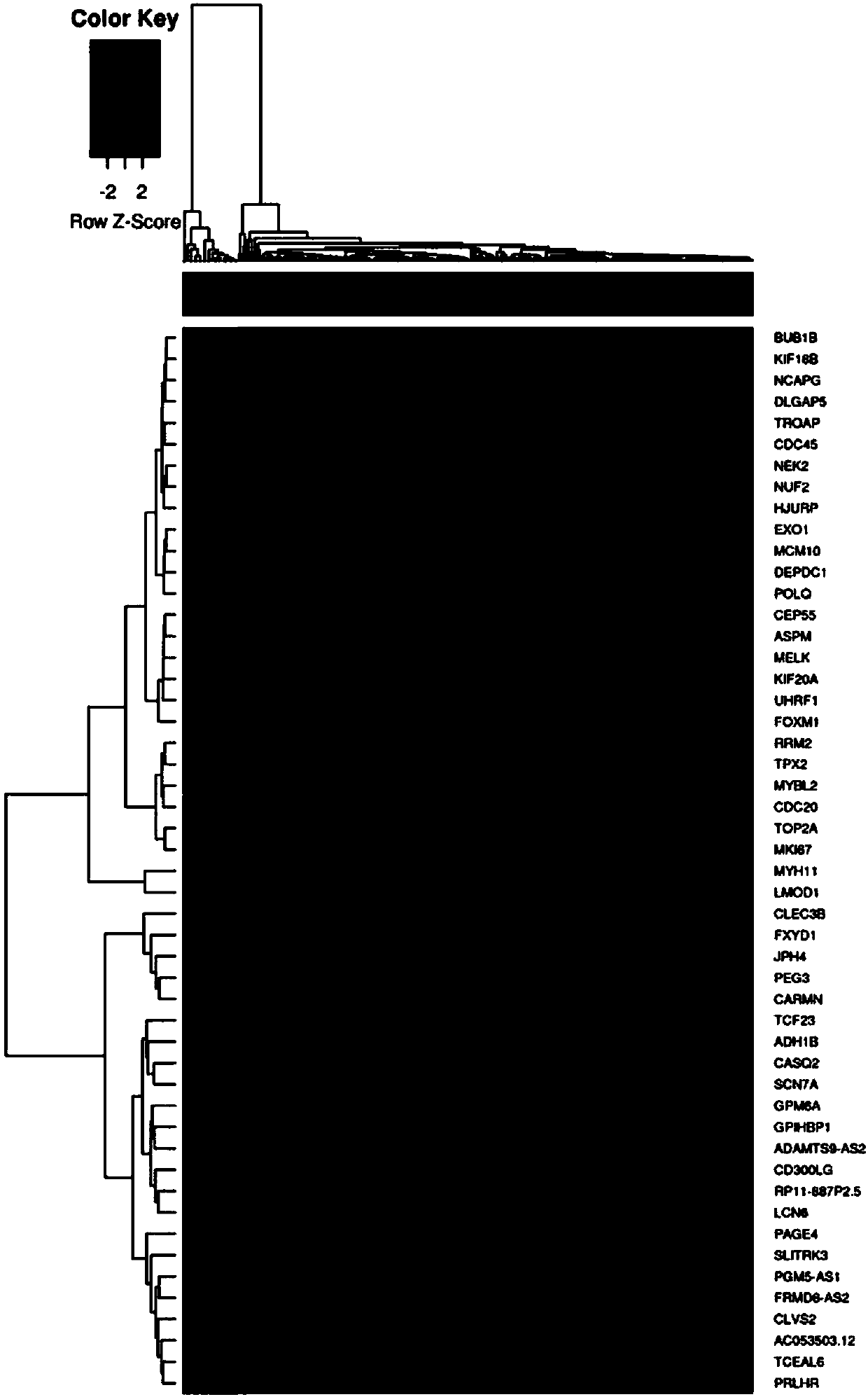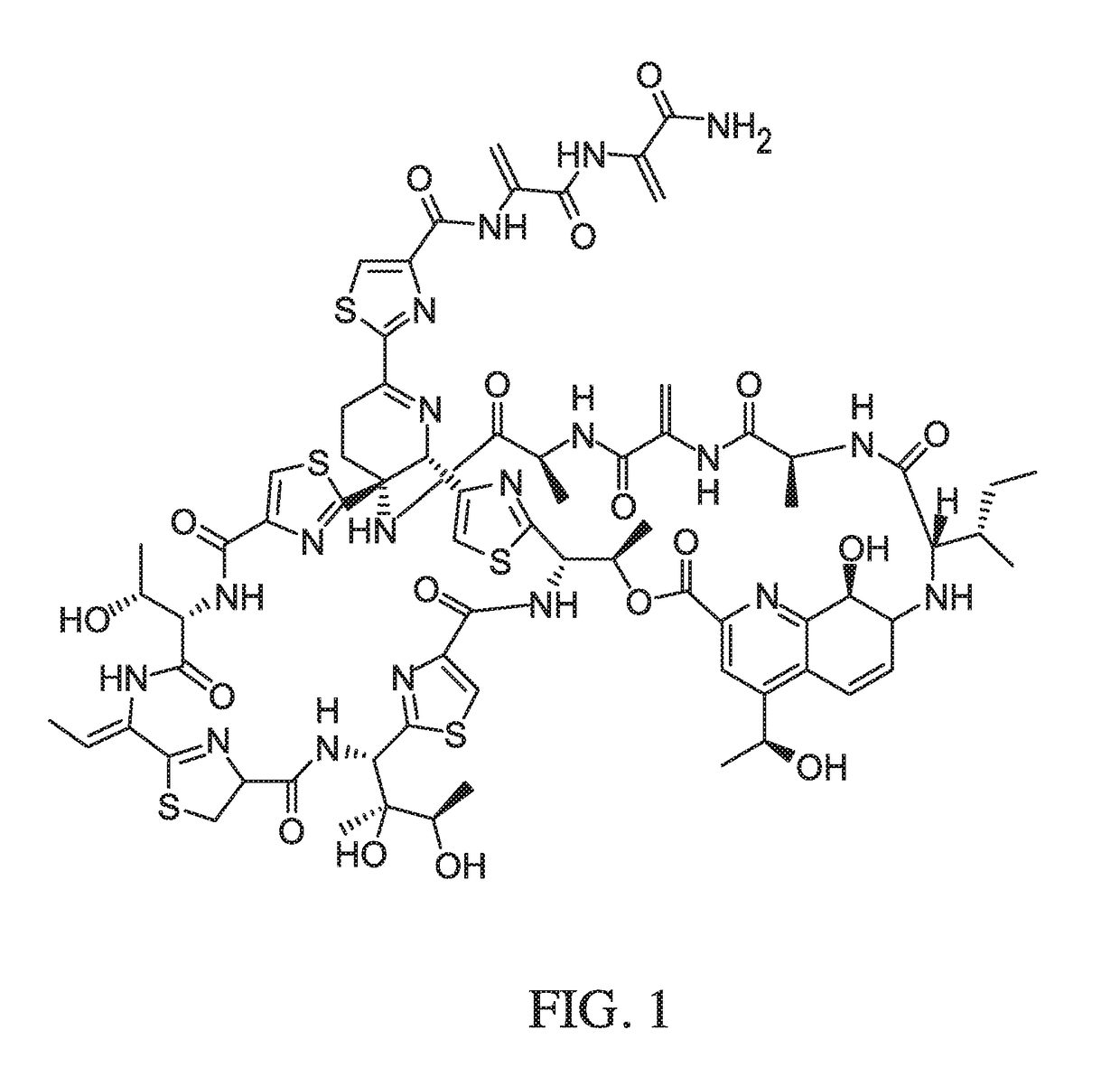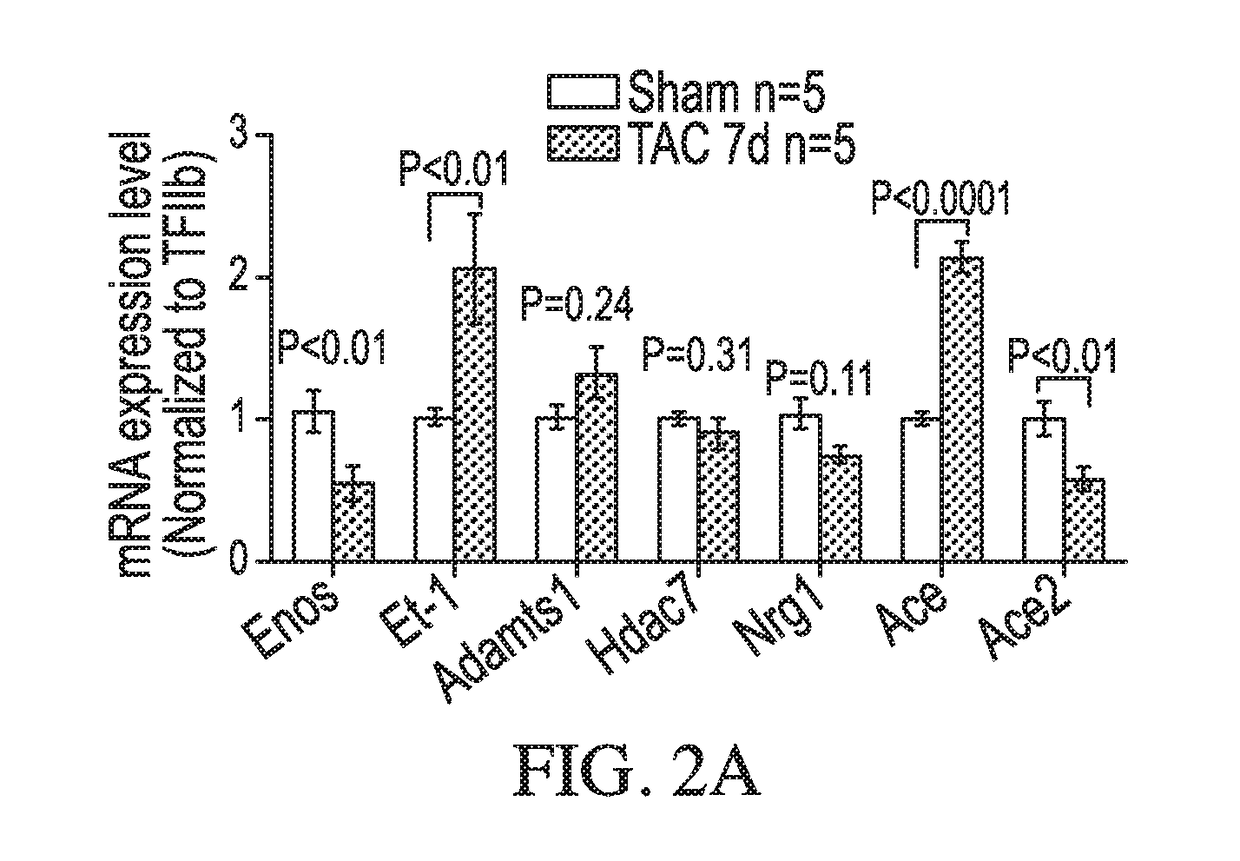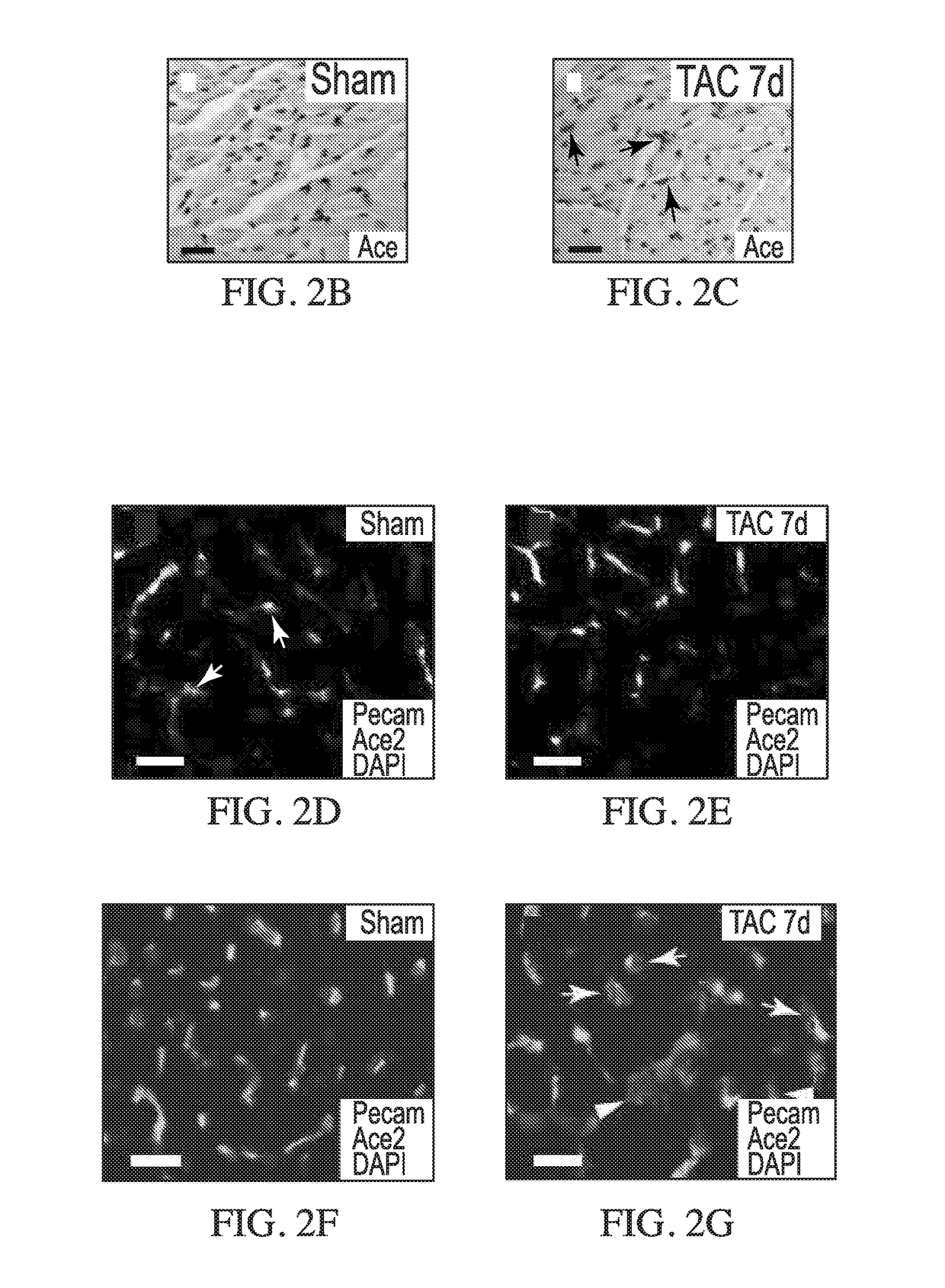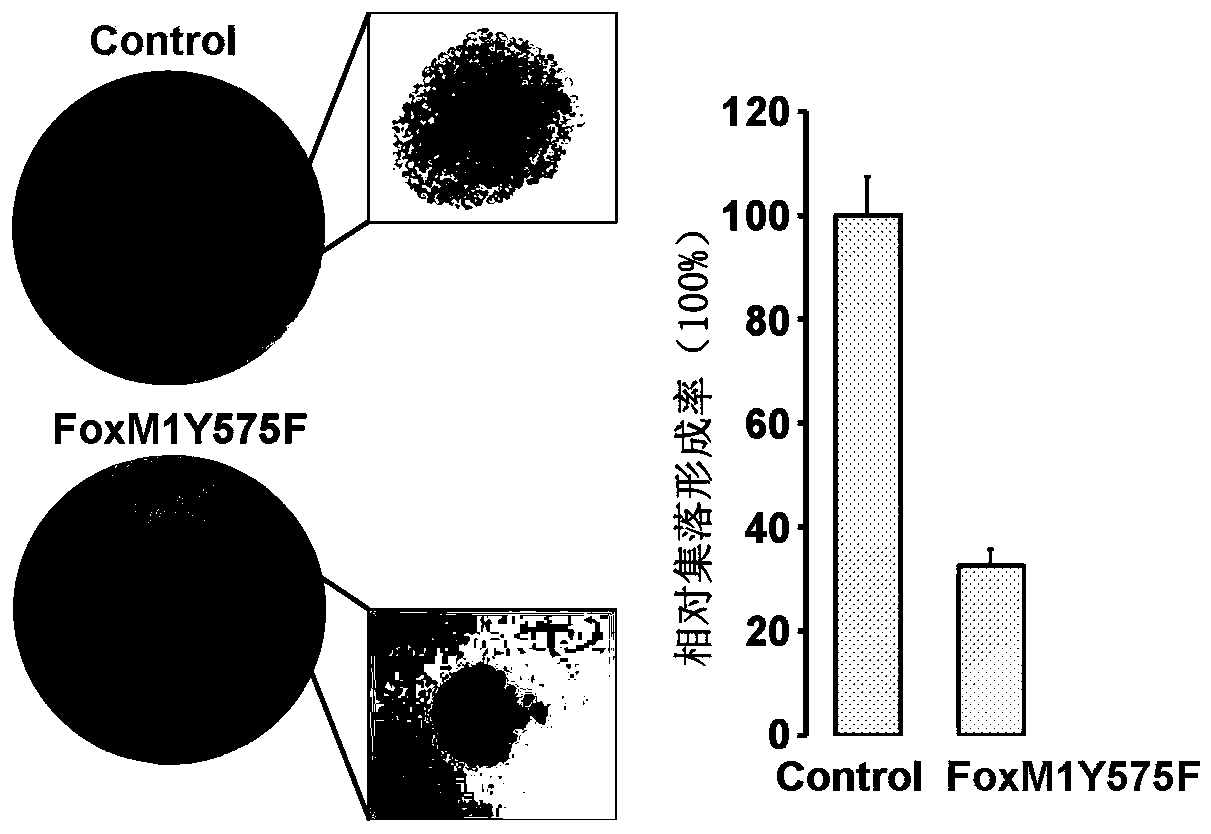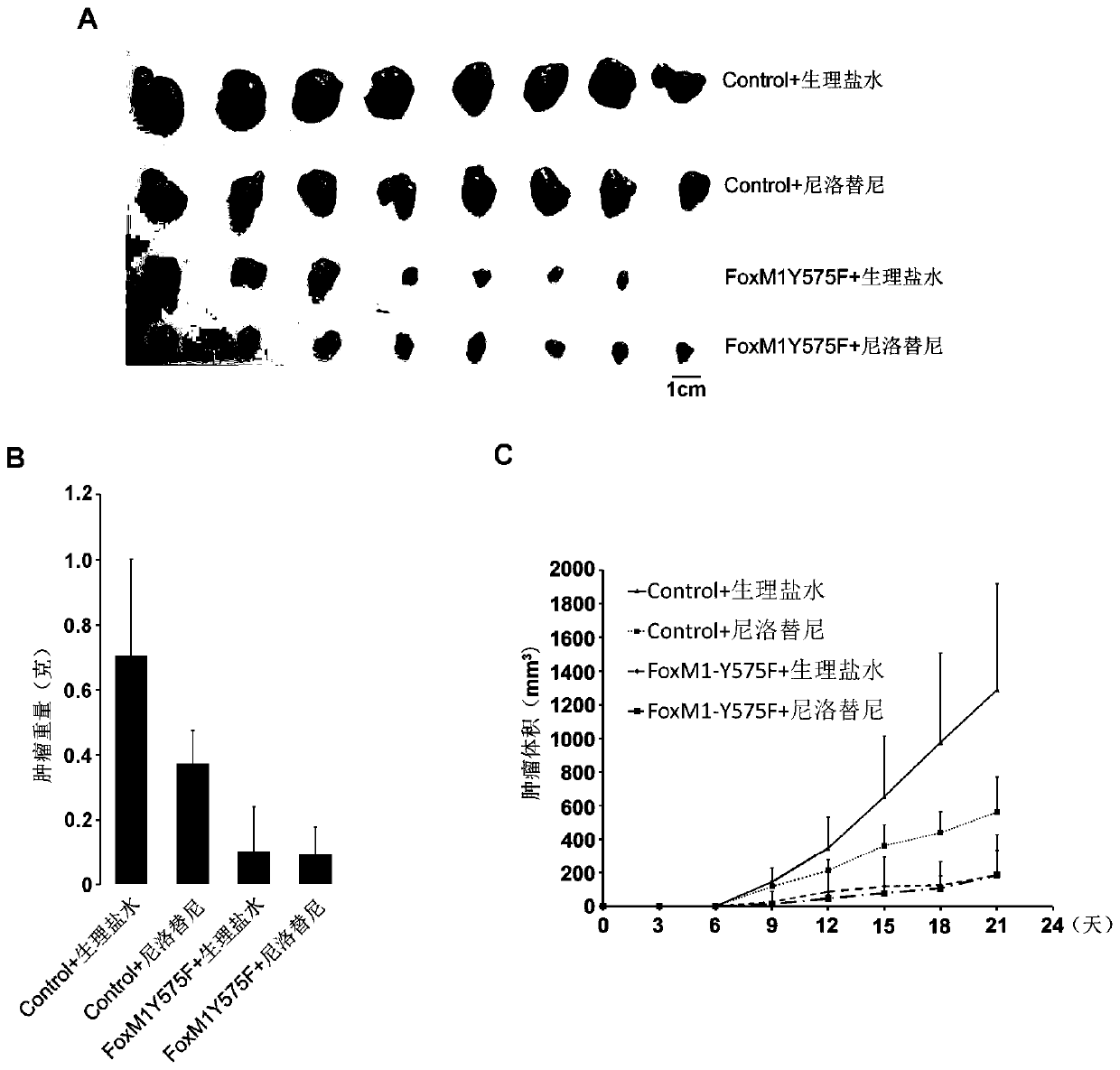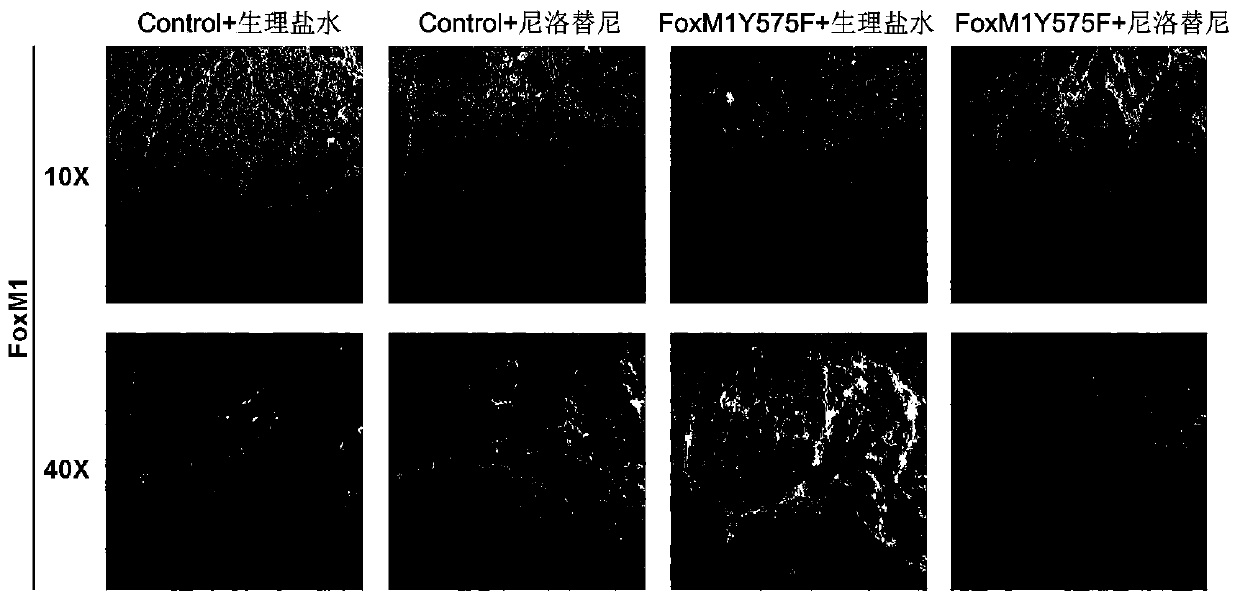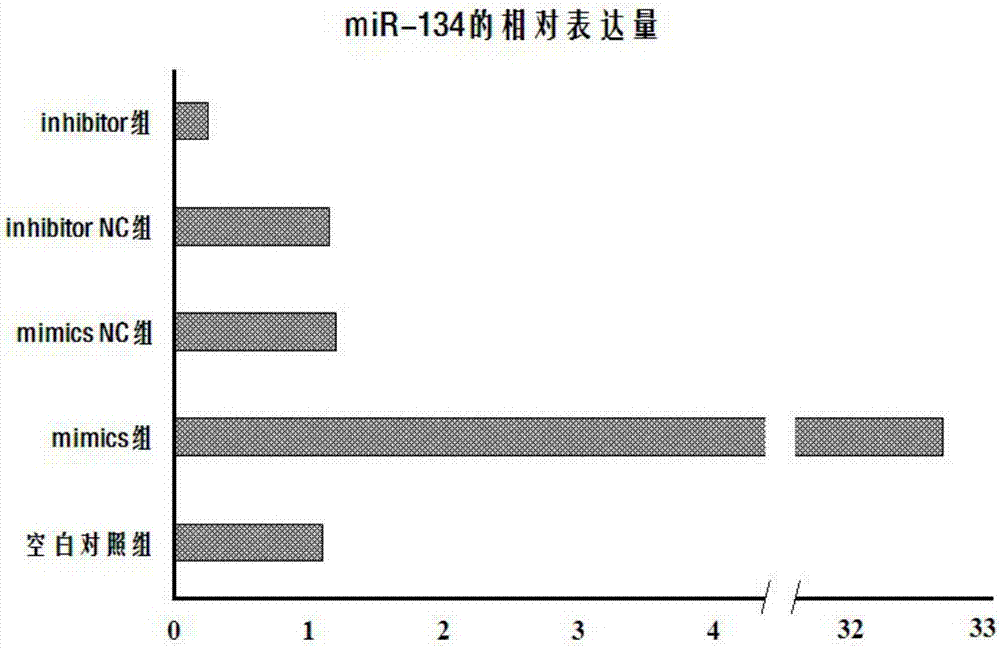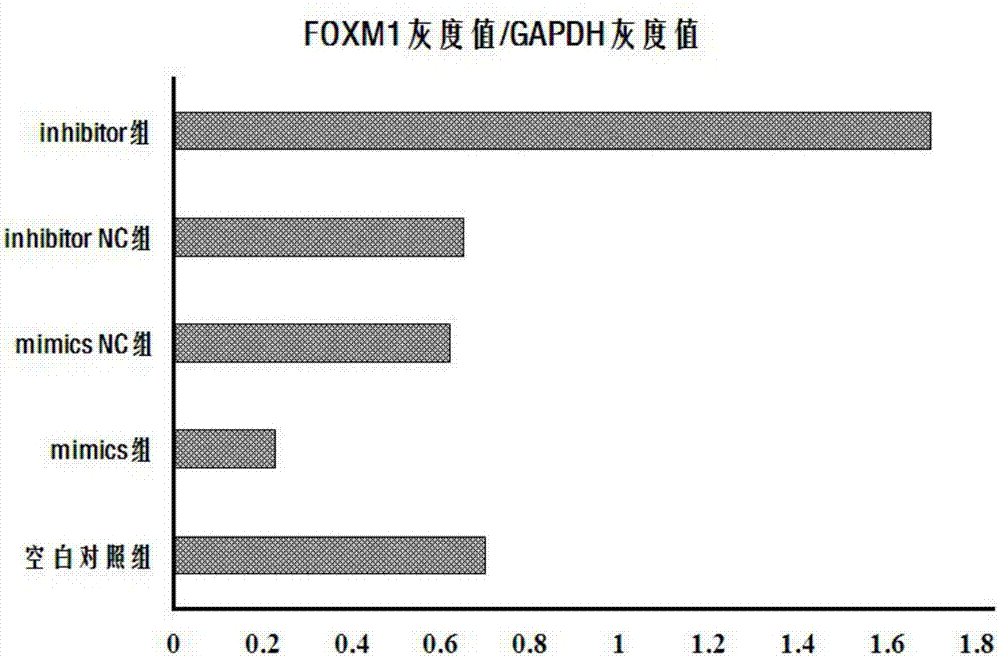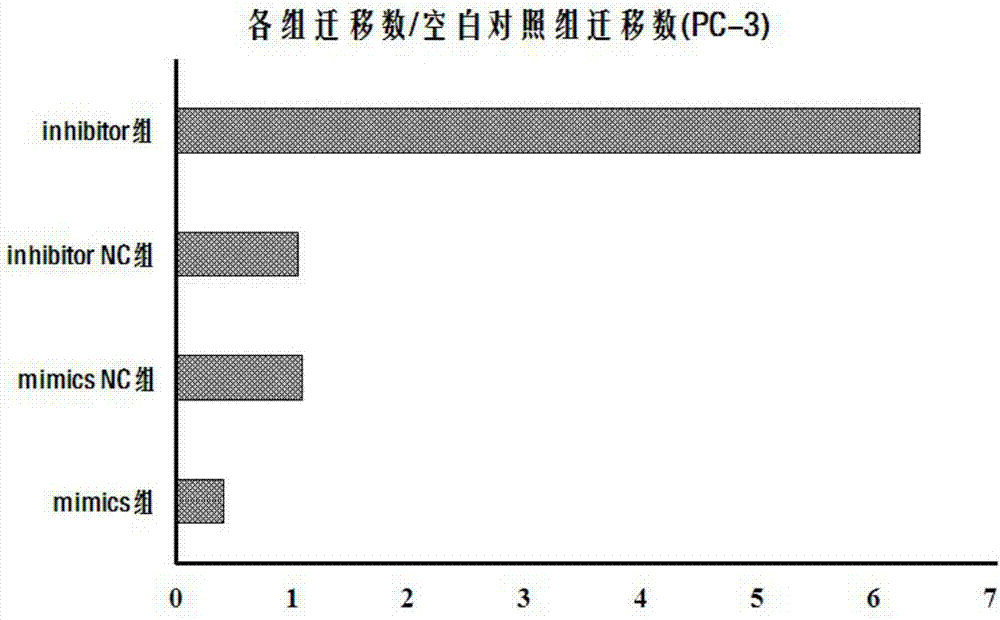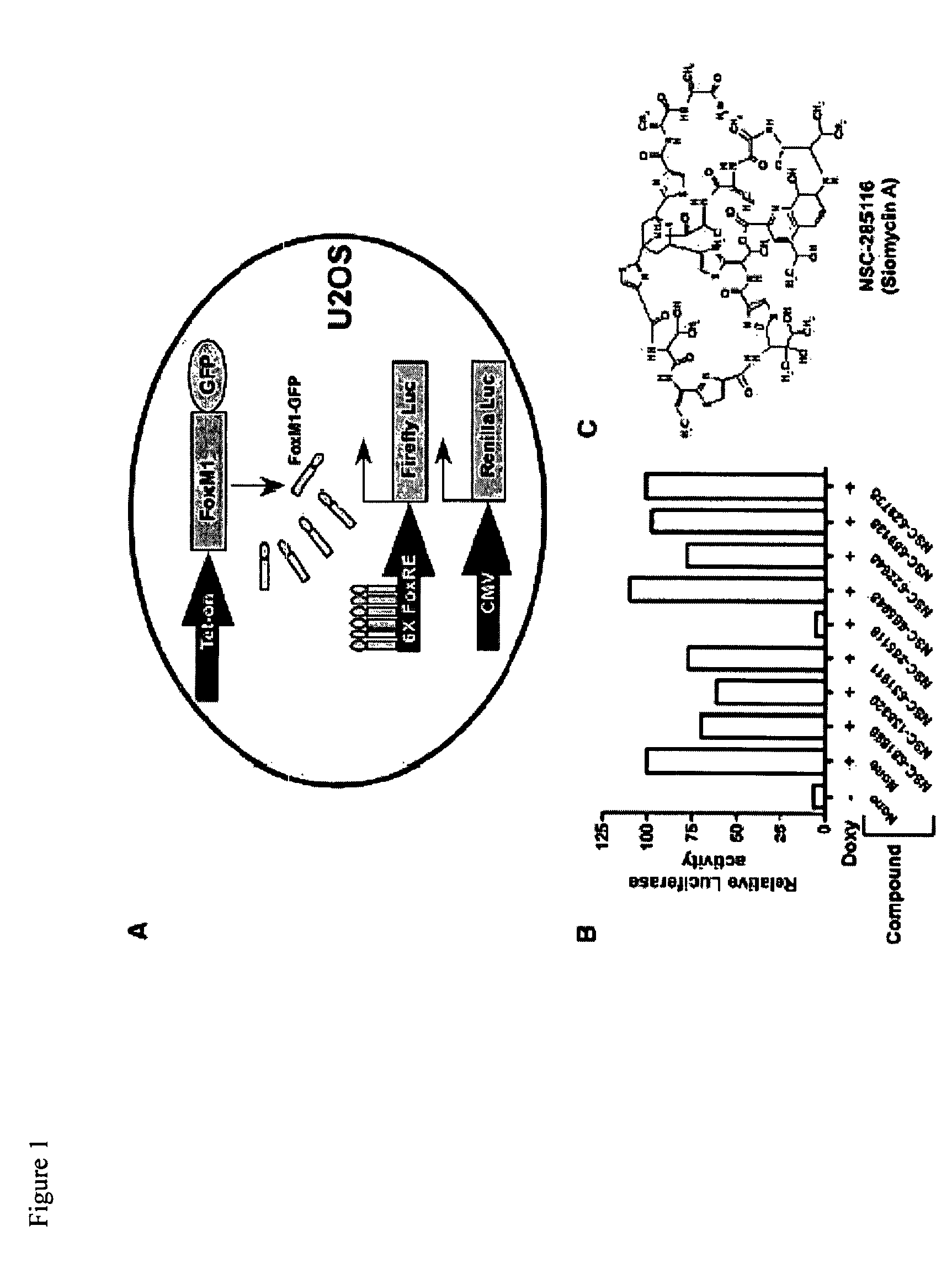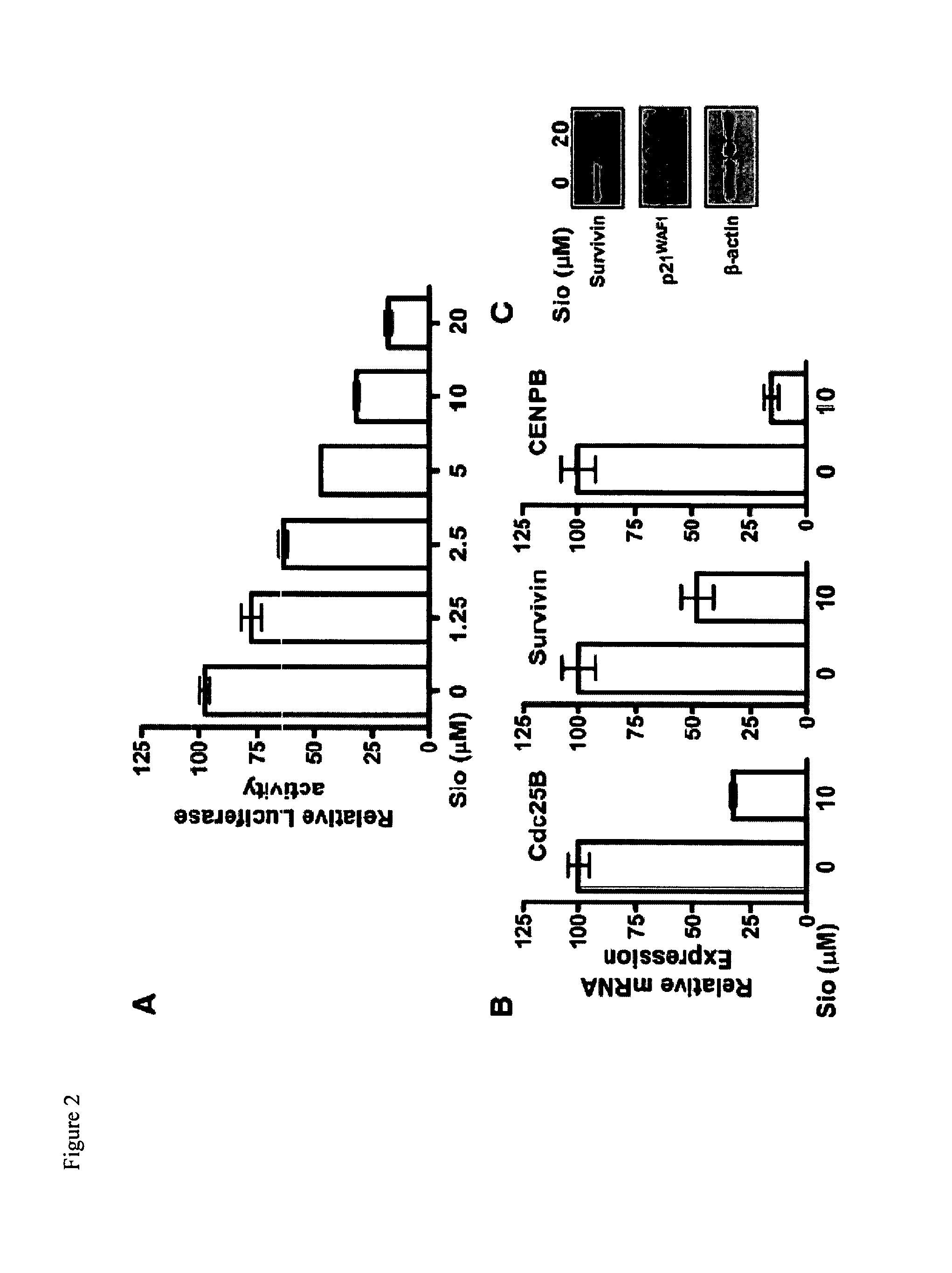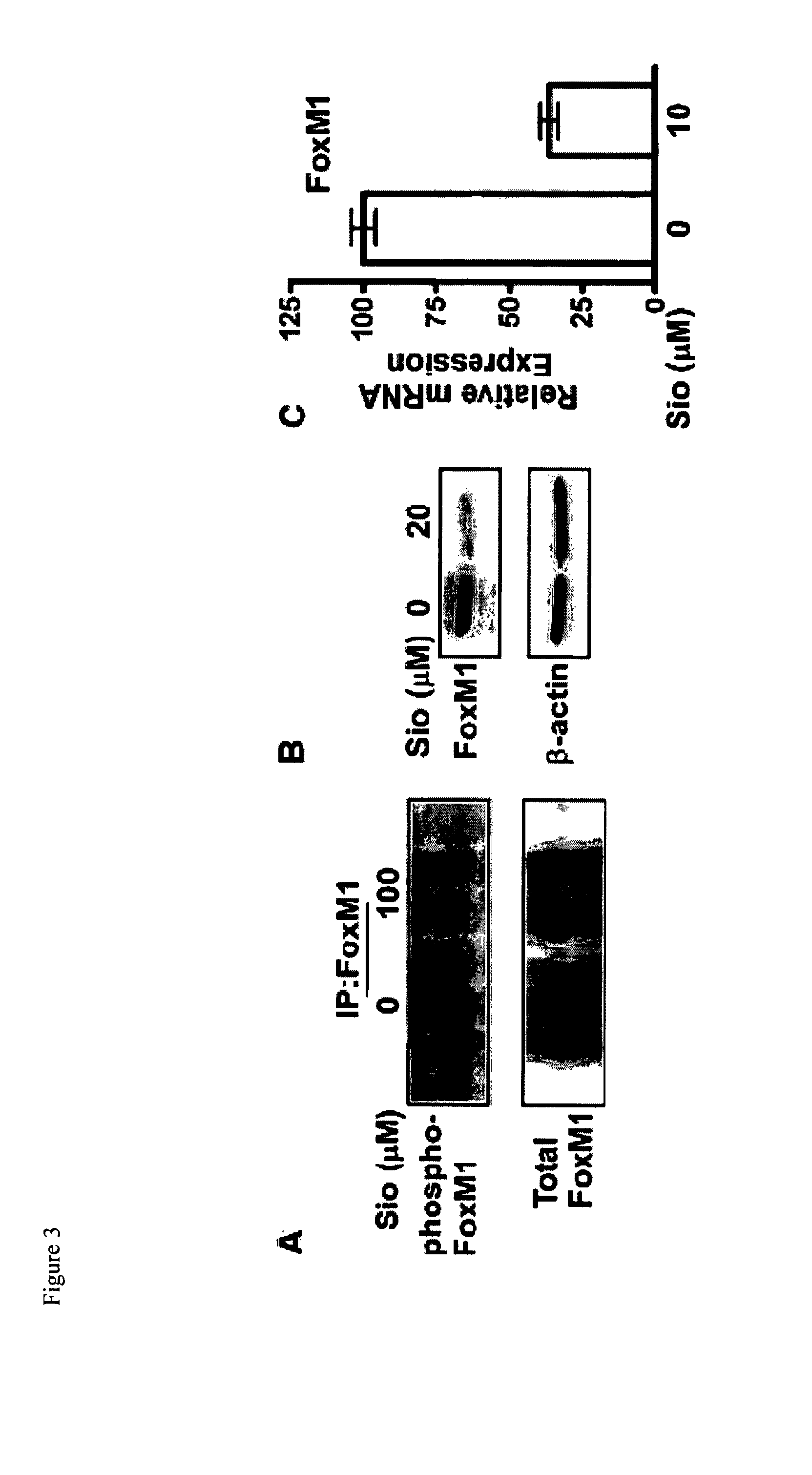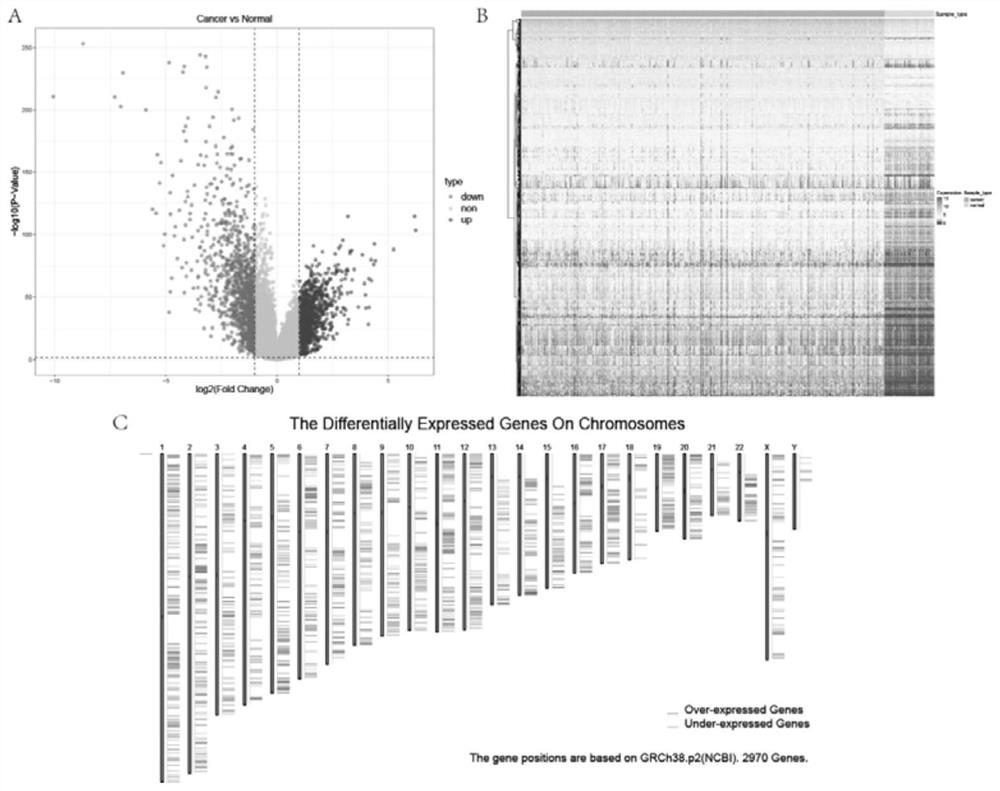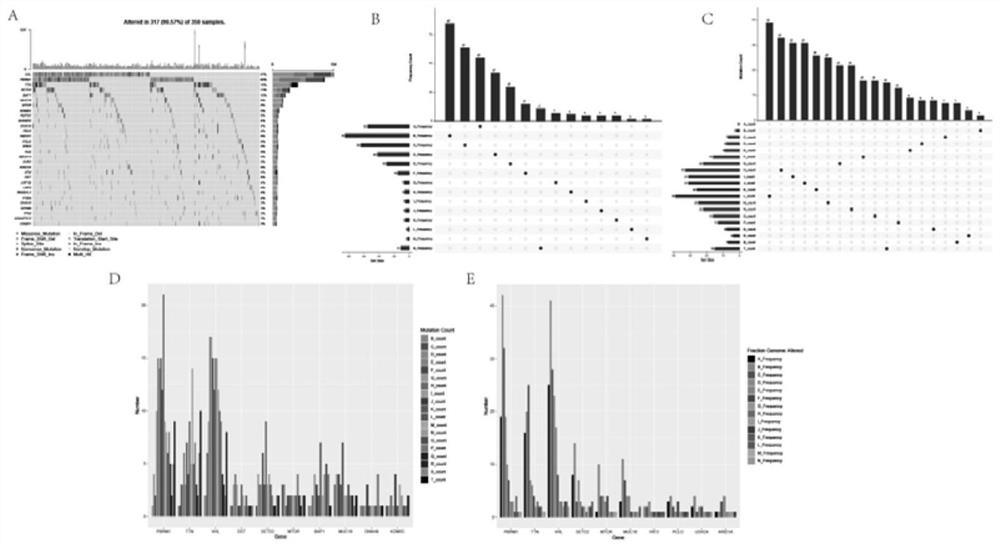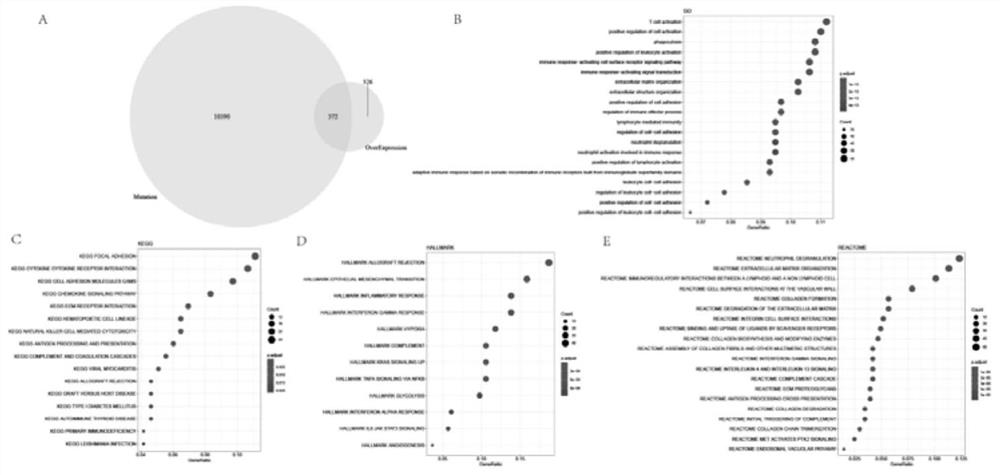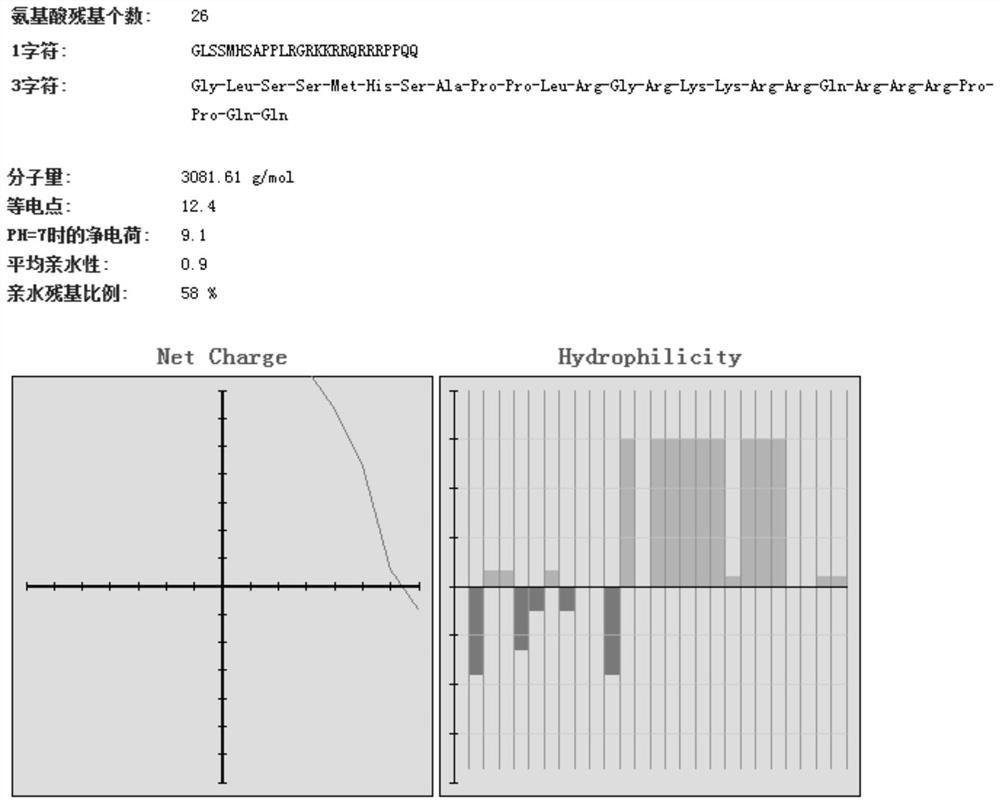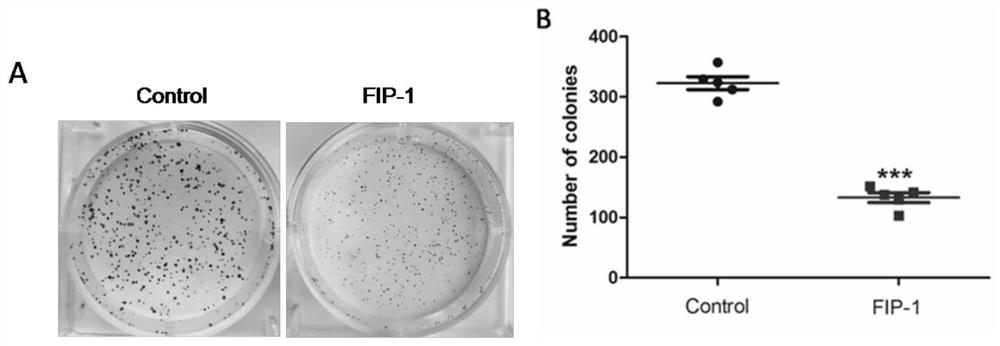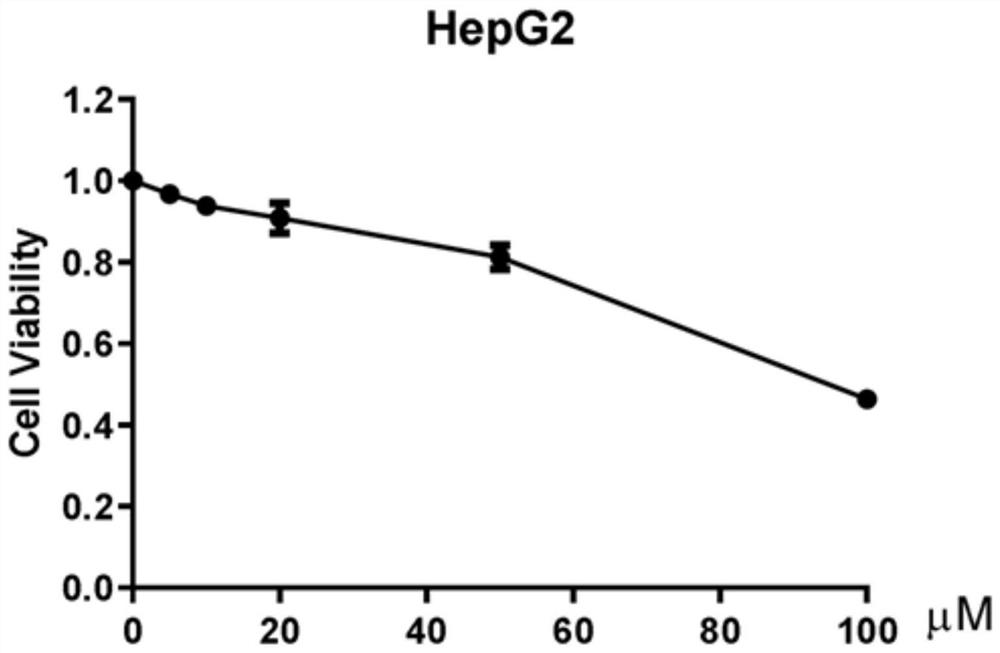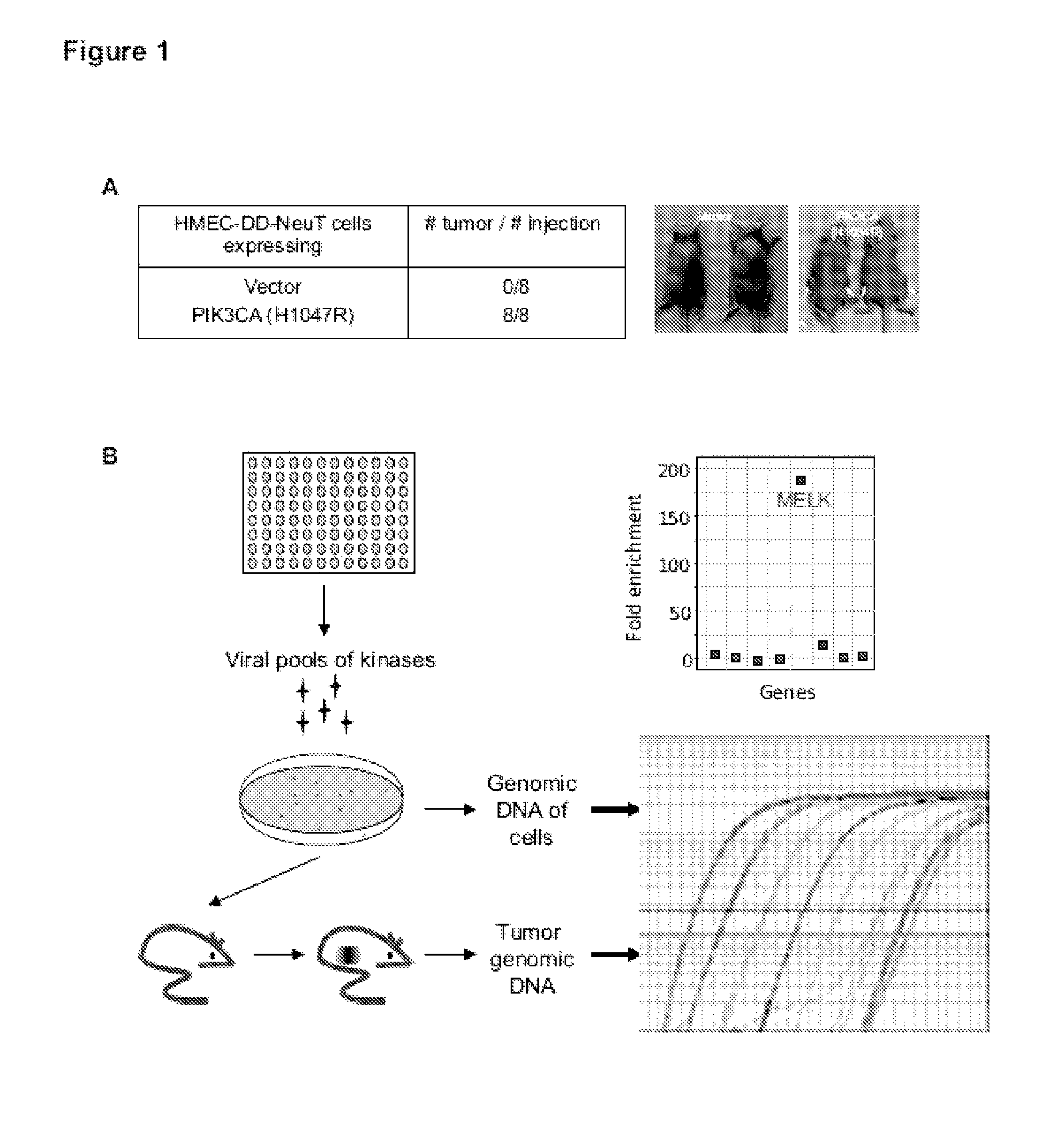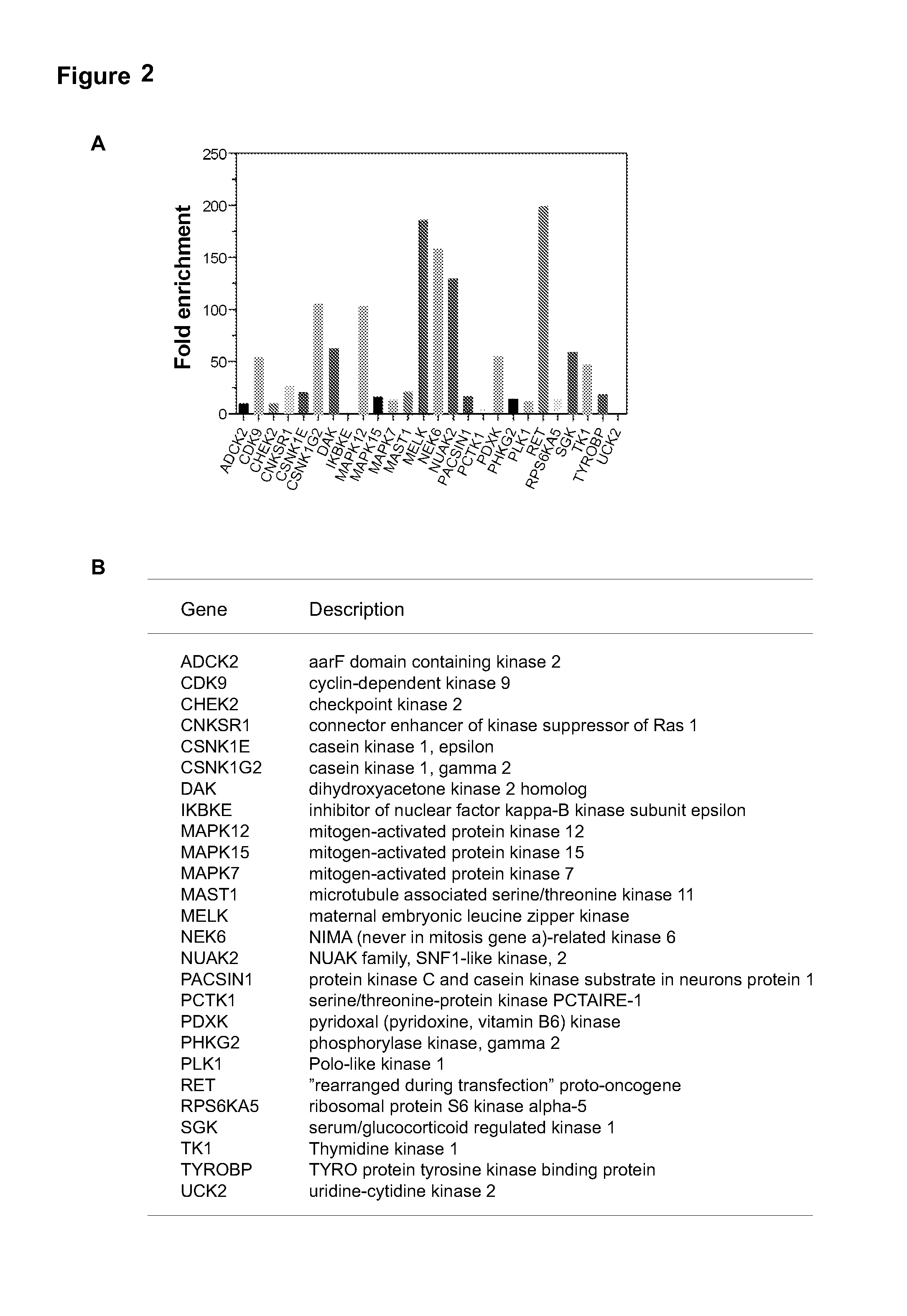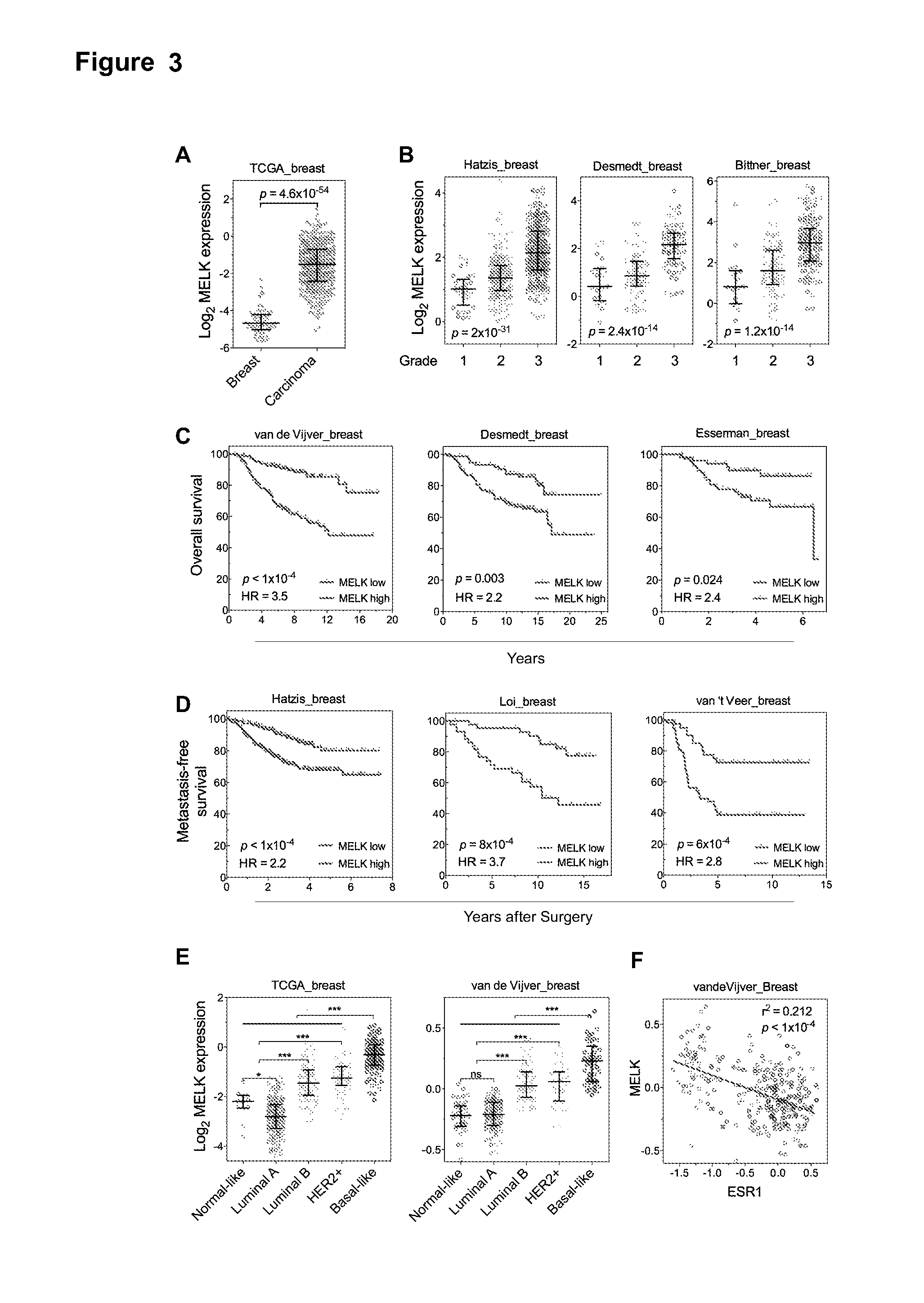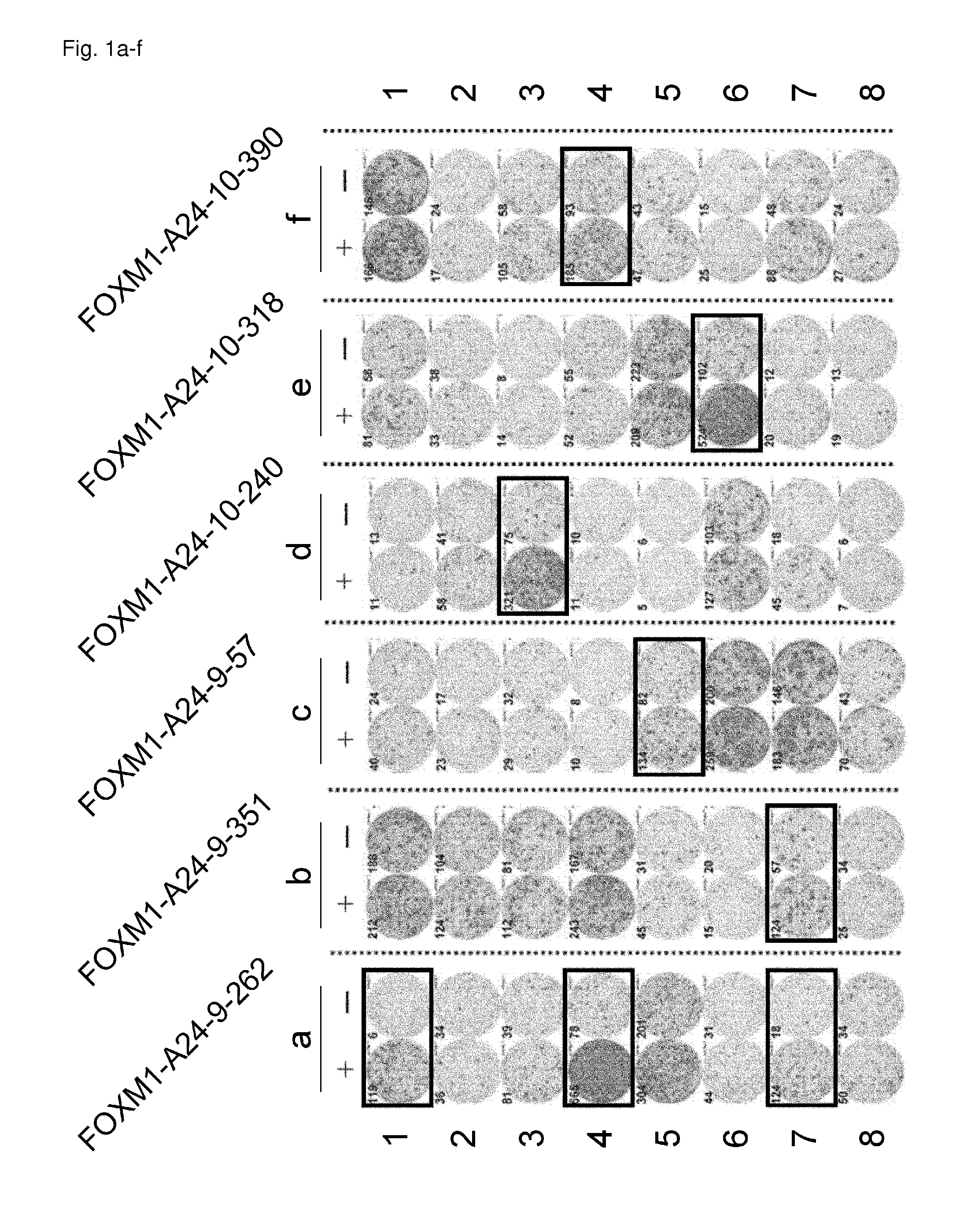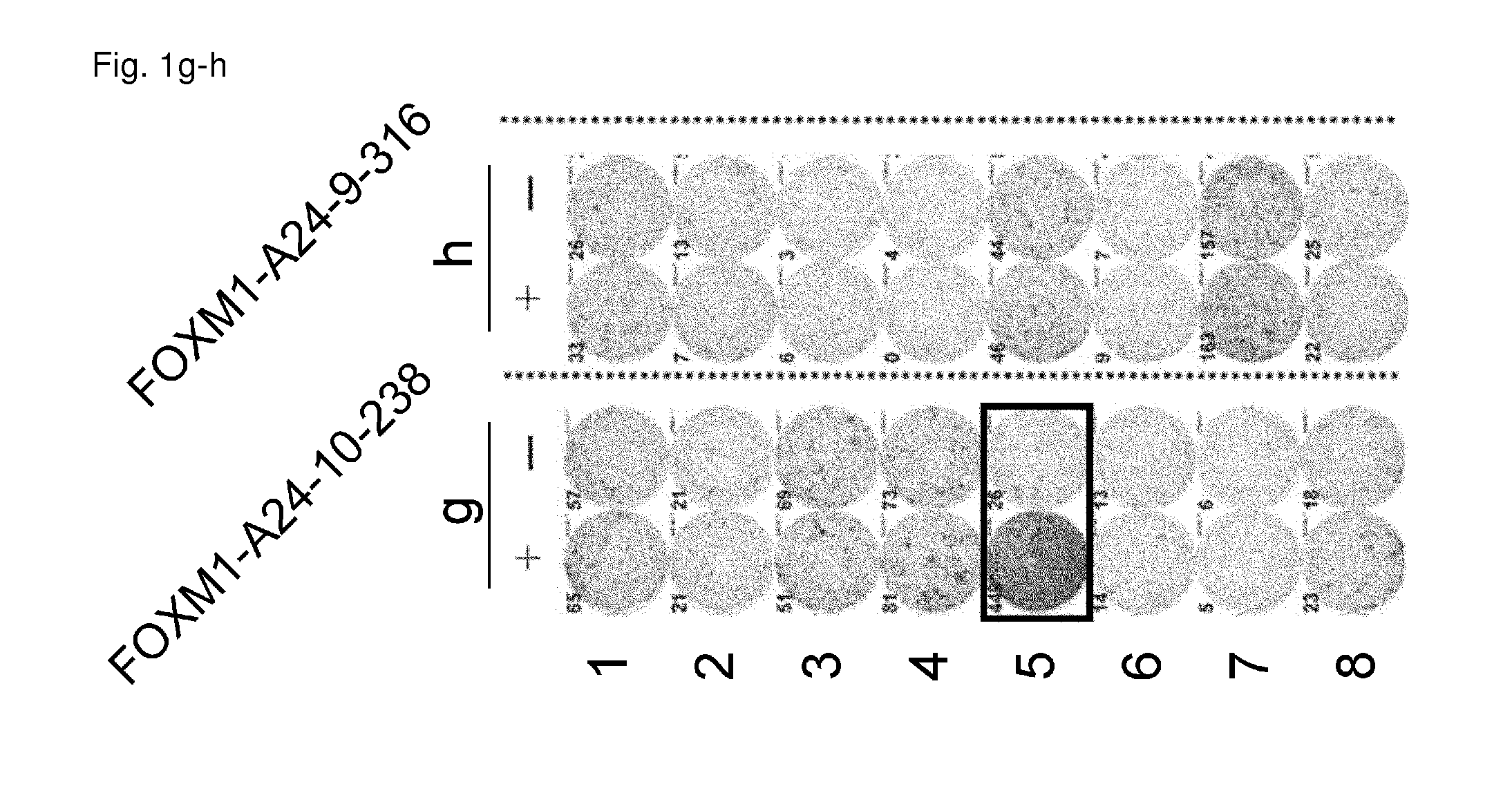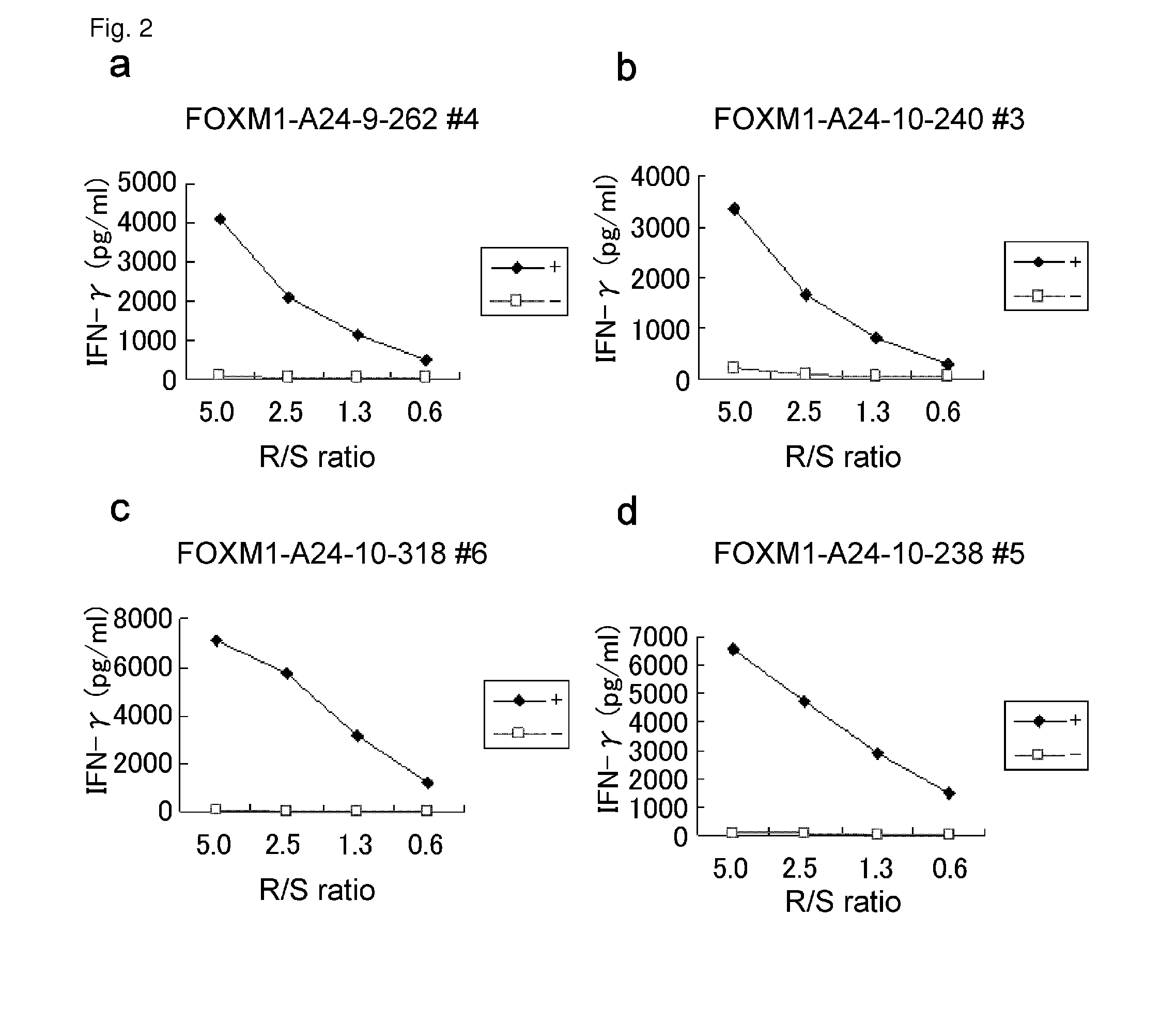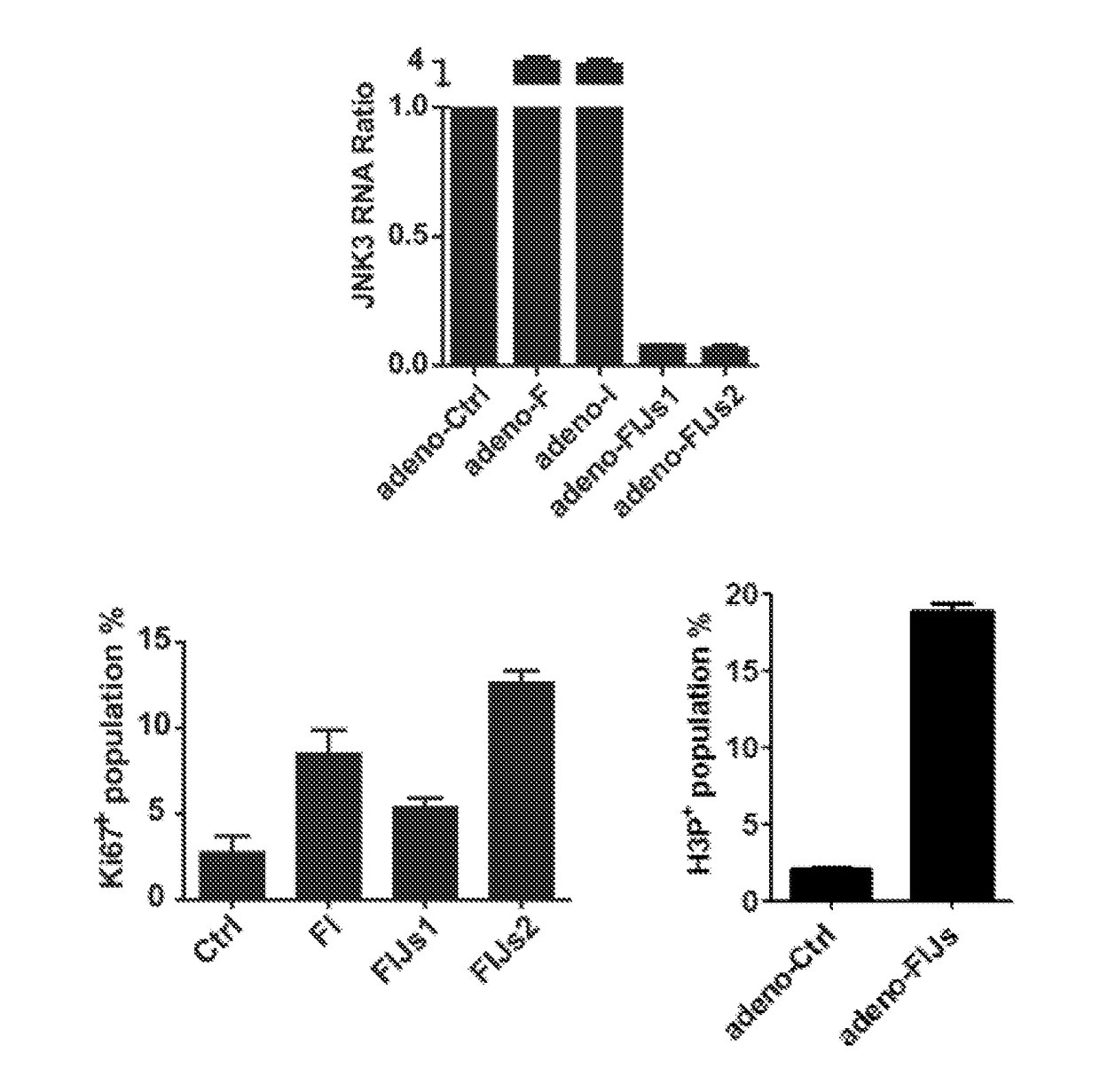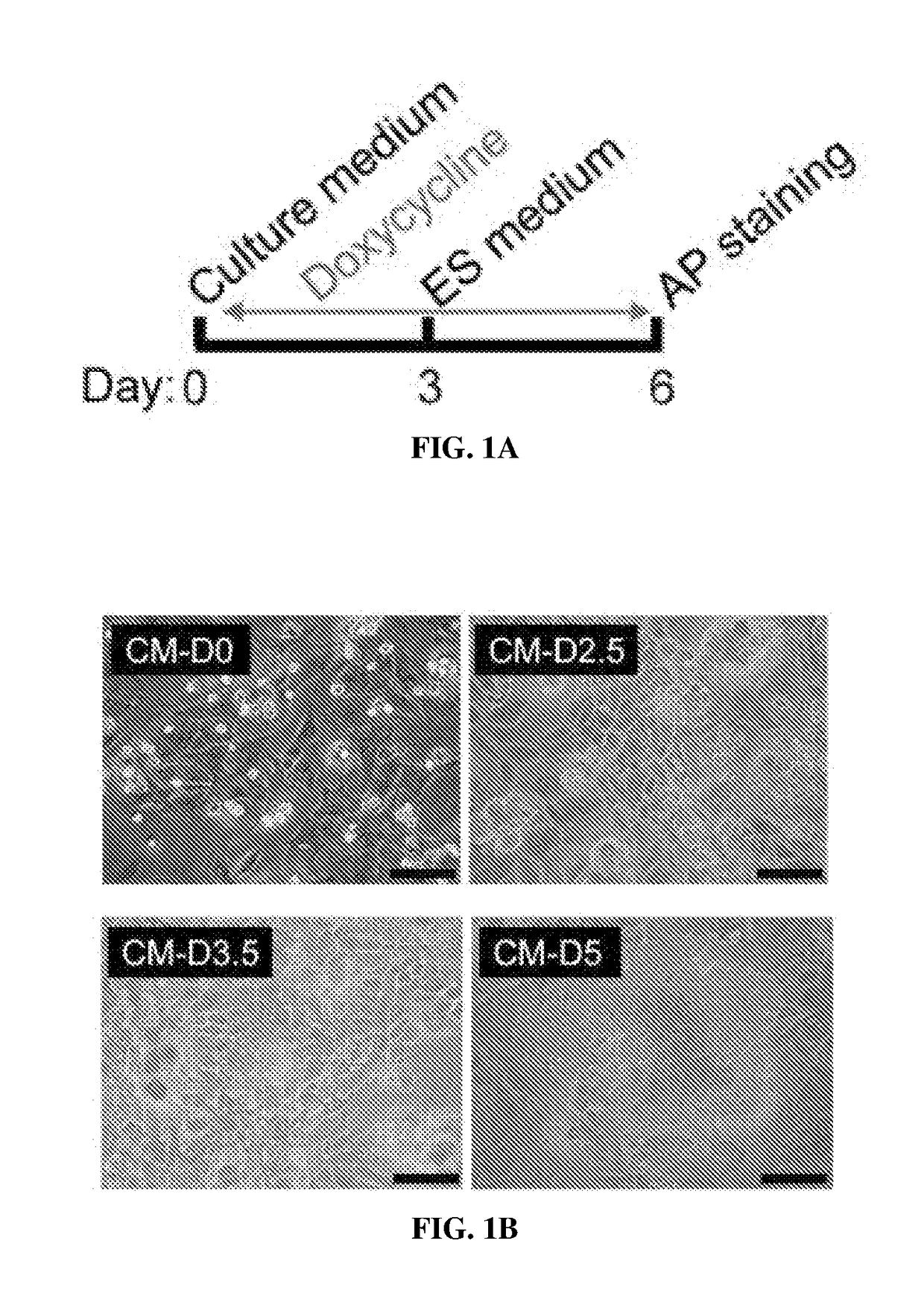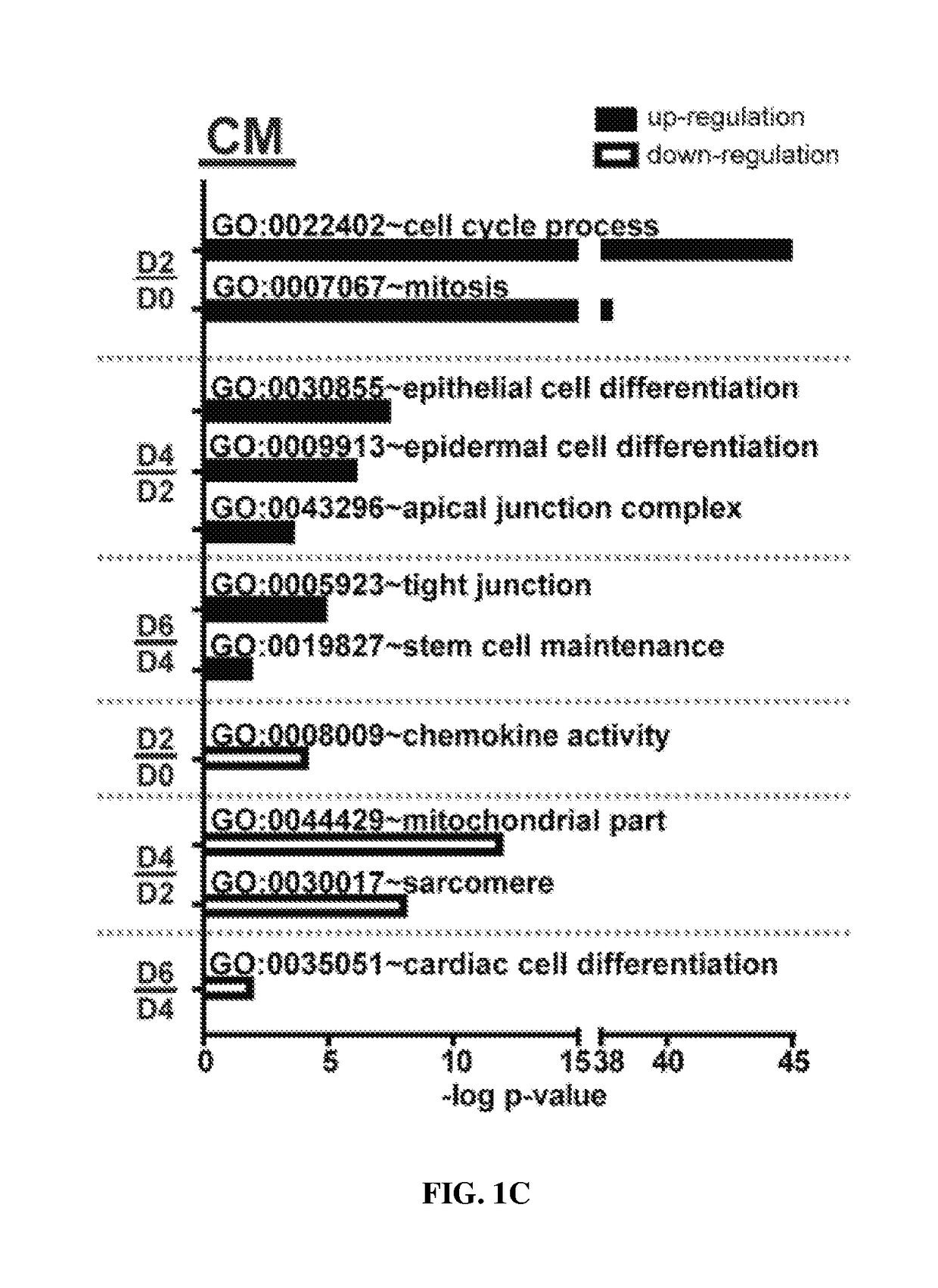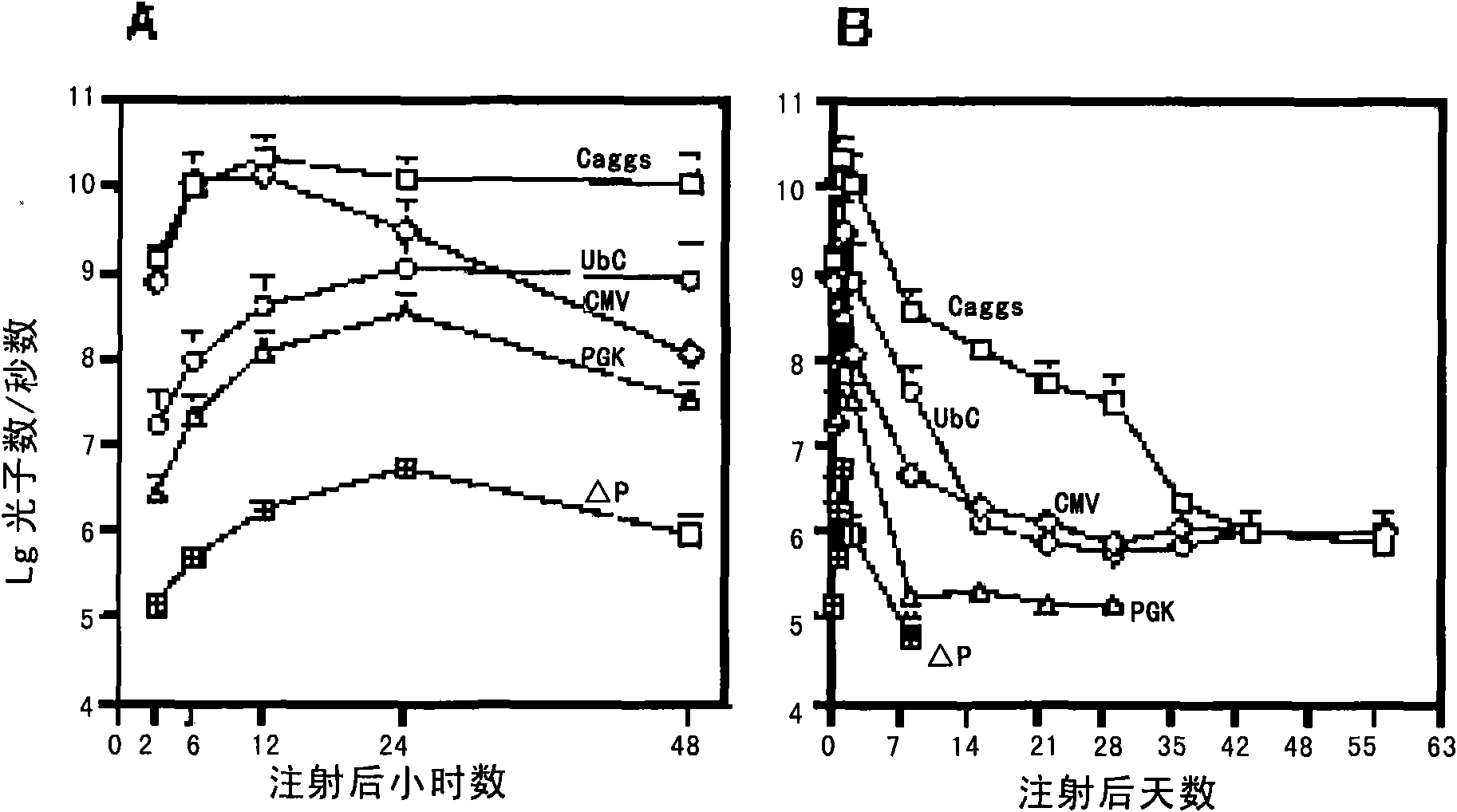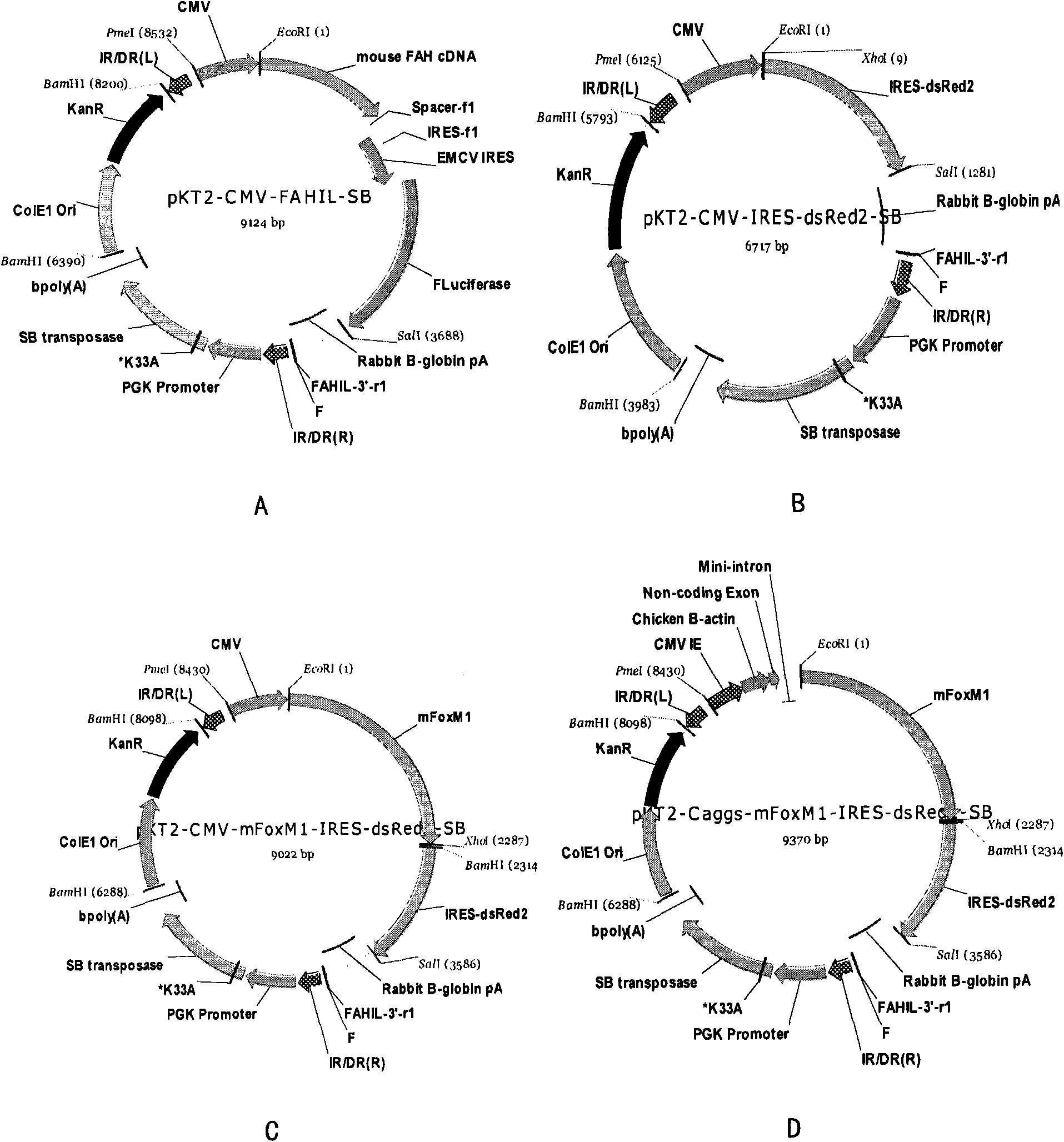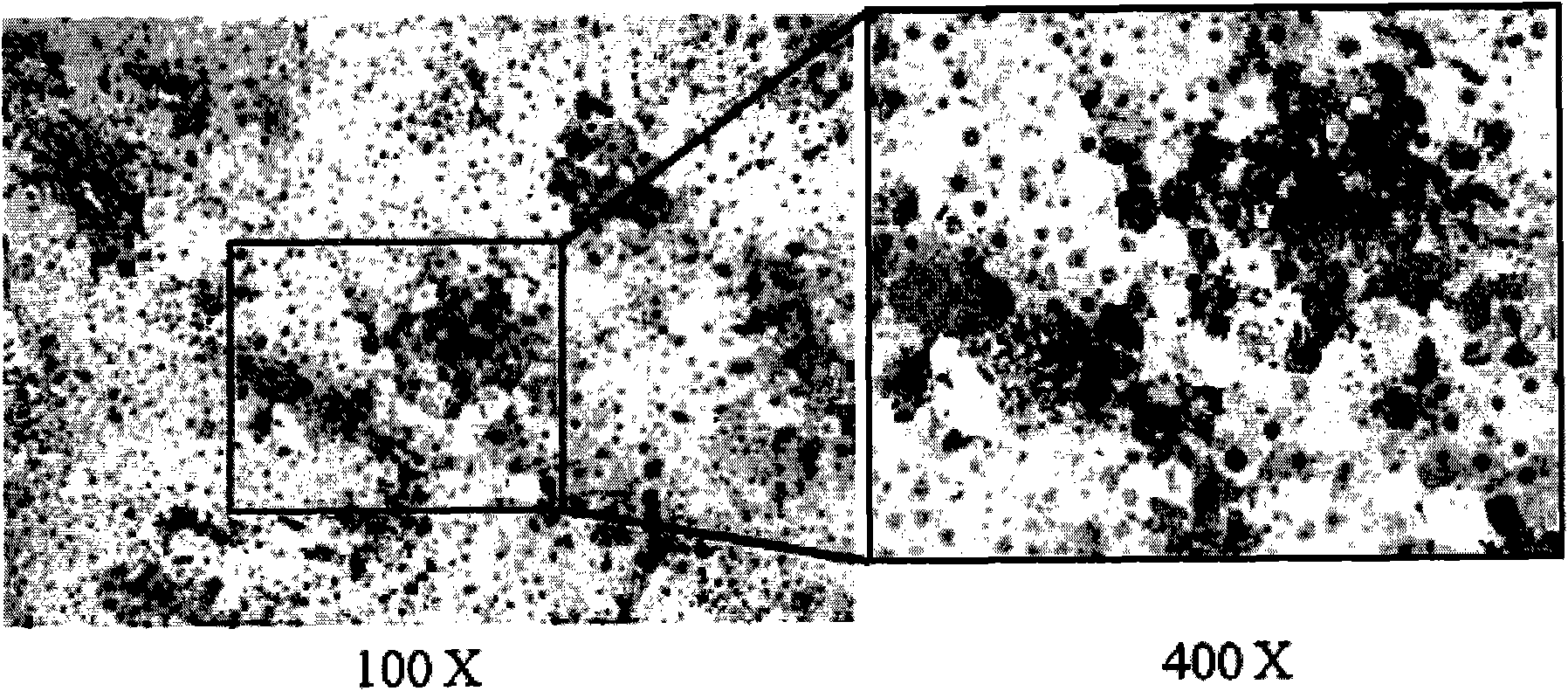Patents
Literature
53 results about "FOXM1" patented technology
Efficacy Topic
Property
Owner
Technical Advancement
Application Domain
Technology Topic
Technology Field Word
Patent Country/Region
Patent Type
Patent Status
Application Year
Inventor
Forkhead box protein M1 is a protein that in humans is encoded by the FOXM1 gene. The protein encoded by this gene is a member of the FOX family of transcription factors. Its potential as a target for future cancer treatments led to it being designated the 2010 Molecule of the Year.
Method for Diagnosing Non-Small Cell Lung Cancer
InactiveUS20080050378A1Relieve symptomsReduced expression levelOrganic active ingredientsSugar derivativesOncologyDifferentially expressed genes
Disclosed are methods for detecting non-small cell lung cancer (NSCLC) using differentially expressed genes KIF11, GHSR1b, NTSR1, and FOXM1. Also disclosed are methods of identifying compounds for treating and preventing NSCLC, based on the interaction between KOC1 and KIF11, or NMU and GHSR1b or NTSR1.
Owner:ONCOTHERAPY SCI INC
Diagnoses and therapeutics for cancer
InactiveUS20060014686A1Decreasing cancer cell proliferationDecrease lungTumor rejection antigen precursorsPeptide/protein ingredientsCell growthBiology
Methods and compositions for treating and diagnosing cancer and screening for agents for such treatment and diagnosis are provided. The methods involve screening for agents that modulate the activity or expression of FOXM1, which has been discovered herein to play a role in cell growth and cell cycle regulation. Methods for treating cancer, methods for modulating the activity or expression of FOXM1, methods for diagnosing a subject that has or is at risk of developing cancer, and pharmaceutical compositions are also provided.
Owner:WYETH LLC
Method for diagnosing non-small lung cancer
Disclosed are methods for detecting non-small cell lung cancer (NSCLC) using differentially expressed genes KIF11, GHSR1b, NTSR1, and FOXM1. Also disclosed are methods of identifying compounds for treating and preventing NSCLC, based on the interaction between KOC1 and KIF11, or NMU and GHSR1b or NTSR1.
Owner:ONCOTHERAPY SCI INC
Biomarker for diagnosing bladder cancer and monitoring recurrence and detection kit
ActiveCN109576370AIncreased sensitivityRealize Auxiliary DiagnosisMicrobiological testing/measurementDNA/RNA fragmentationBacteriuriaBladder cancer
The invention provides a biomarker for diagnosing bladder cancer and monitoring recurrence and a detection kit. The biomarker is a gene UBE2C and at least one of genes BIRC5, UBE2C, CDK1, MMP11, TPX2,CDC20, MYBL2, TK1, FOXM1, CCNB1 and UCA1. The biomarker and a combination thereof, provided by the invention, can be used for accurately confirming whether an individual has the bladder cancer or notand has the possibility of recurrence or not, and has relatively high sensitivity; when the ACU of the performance of a recurrence monitoring model reaches 0.955 and the sensitivity and the NPV are 100 percent, the specificity can reach 80 percent or more; when the AUC of the performance of a diagnosis model reaches 0.99 and the sensitivity and the NPV are 98 percent or more, the specificity reaches 92 percent. The invention provides a noninvasive detection method based on urine detection and the pain of a patient frequently utilizing a cystoscope can be effectively avoided.
Owner:北京恩泽康泰生物科技有限公司
MELK Regulation for the Treatment of Breast Cancer
ActiveUS20150353935A1Organic active ingredientsMicrobiological testing/measurementEstrogen receptorOncology
Methods for inhibiting growth or proliferation of breast cancer cells are provided. The methods include administering to a subject in need thereof in an amount that is effective to inhibit growth or proliferation of the breast cancer cells a MELK inhibitor, wherein the breast cancer cells are estrogen receptor (ER) negative. In some aspects, the methods include administering to a subject in need thereof in an amount that is effective to inhibit growth or proliferation of the breast cancer cells a MELK inhibitor, a FoxM1 inhibitor or a MELK inhibitor and a FoxM1 inhibitor, wherein the breast cancer cells are estrogen receptor (ER) negative. Methods of treatment for breast cancer and methods of identifying patients having cancer that are likely to benefit from treatment with a MELK inhibitor, a FoxM1 inhibitor or a MELK inhibitor and a FoxM1 inhibitor are also provided.
Owner:NOVARTIS AG +1
Using minivectors to treat ovarian cancer
PendingUS20200048716A1Improve survival rateEfficient transfectionOrganic active ingredientsSpecial deliveryCD44PRDM16
MiniVectors and compositions containing MiniVectors that target ovarian cancer genes selected from FOXM1, AKT, CENPA, PLK1, CDC20, BIRC5, AURKB, CCNB1, CDKN3, BCAM-AKT2, CDKN2D-WDFY2, SLC25A6, CIP2A, CD133, ALDH1A1, CD44, SALL4, and / or PRDM16, alone or in any combination, are provided, along with uses in the treatment of ovarian cancer.
Owner:BAYLOR COLLEGE OF MEDICINE +1
Identification and use of agents that modulate oncogenic transcription agent activity
InactiveUS20080152618A1Therapeutically effective amount can be lowered and increasedAntibacterial agentsBiocideCancer cellTranscription factor activity
Embodiments of the invention provides, among other things, methods for identifying agents that inhibit oncogenic transcription factors, induce apoptosis, inhibit the growth of transformed cells and cancer cells, and potentiate the effects of other agents that induce apoptosis and that inhibit the growth of transformed cells and cancer cells. Embodiments of the invention further provide compositions useful for the same comprising an agent the inhibits one or more oncogenic transcription factors and an agent that induces apoptosis, particular compositions wherein the apoptotic effect of the combination is greater than either agent by itself. Embodiments of the invention further provide for the use of such agents and compositions to treat cancer. In illustrative embodiments the agents that inhibit transcription factor activity are thiazole antibiotics, such as Siomycin and thiostrepton, and the apoptosis inducing agent is a member of the TNF ligand superfamily, such as TNF-alpha. In illustrative embodiments the cancers are those in which both the FoxM1 and the NF-kB oncogenic pathways are activated.
Owner:THE BOARD OF TRUSTEES OF THE UNIV OF ILLINOIS
Application of FOXM1 inhibitor to treatment of intrahepatic cholangiocarcinoma
InactiveCN108273062AIncreased sensitivityHeavy metal active ingredientsTripeptide ingredientsCisplatinMedicine
The invention belongs to the technical field of medicine. Through wide and deep research finds that, FOXM1 performs high expression in cholangiocarcinoma and is related to prognosis, the FOXM1 inhibitor inhibits proliferation of cholangiocarcinoma by increasing apoptosis, the FOXM1 knocks down to improve the sensitivity of the cholangiocarcinoma on cis-platinum, and the FOXM1 inhibitor is combinedwith the cis-platinum to inhibit proliferation of the cholangiocarcinoma. As a result, the FOXM1 plays an important role in the generation and development processes of the cholangiocarcinoma and provides new thought for diagnosis and treatment of the cholangiocarcinoma.
Owner:ZHEJIANG UNIV
Non-invasive diagnostic method for diagnosing bladder cancer
ActiveUS20160017433A1Nucleotide librariesMicrobiological testing/measurementBladder cancerNon invasive
Non-invasive diagnostic methods for diagnosing bladder cancer are based on determining the expression level of one or more markers. The one of the markers comprises the IGF2 gene in a sample from the subject to be studied. Other suitable markers include MAGEA3, ANXAIO, AHNAK2, CTSE, CRH, KLF9, KRT20, POSTN, PPP1R14D, SLCIA6, TERT, ASAM, MCMIO, EBF1, CFH and MMP12 and possibly FOXM1, KIF20A, MELK, CDK1.
Owner:FINA BIOTECH
Anti-tumor protein peptide capable of inhibiting FOXM1
ActiveCN107827970APolypeptide with localisation/targeting motifTumor rejection antigen precursorsNitrogenPeptide fragment
The invention discloses a protein peptide fragment sourced from FOXM1 protein and containing 1-138-position amino acid residue sequences at a nitrogen end of the FOXM1 protein, and provides a candidate capable of inhibiting functions of FOXM1 and used for developing protein peptide type anti-tumor drugs. The protein peptide fragment contains protein with one of the following amino acid residue sequences: 1) a protein shown in SEQ ID NO:1 in a sequence table; 2) a protein peptide capable of inhibiting or reducing activity and functions of FOXM1 by replacing, deleting, inserting and / or adding one, two or more amino acid residues to the protein shown in SEQ ID NO:1 in the sequence table. The recombinant protein prepared on the basis of the amino acid sequence shown in SEQ ID NO:1 in the sequence table and having membrane penetrating capacity shows an inhibition action on various tumor cells.
Owner:XINSHENG KANGYUAN BIOPHARML
Application of protein DEPDC1 (Dishevelled and EGL-10, Pleckstrin Domain-Containing protein 1) as marker for diagnosing triple negative breast cancer
ActiveCN109321656APositive and obvious technical effectPromote growthOrganic active ingredientsMicrobiological testing/measurementCell growthWilms' tumor
The invention provides application of protein DEPDC1 (Dishevelled and EGL-10, Pleckstrin Domain-Containing protein 1) as a marker for diagnosing the triple negative breast cancer, and also provides application of miR-26b for preparing a medicine for treating the triple negative breast cancer. The invention also provides application of miR-26b for preparing a medicine for inhibiting DEPDC1 mRNA (Ribonucleic Acid) expression. The invention finds that DEPDC1 expression is obviously higher than a paired para-carcinoma tissue in a triple negative breast cancer tissue. In the triple negative breastcancer cell, overexpression DEPDC1 can accelerate cell growth and tumor formation through FOXM1 (Forkhead box protein M1) expression up-regulation. On the contrary, after the DEPDC1 is knocked down,an inverse function is displayed. In addition, in the triple negative breast cancer, miR-26b serves as a tumor inhibiting factor to directly inhibit DEPDC1 expression and weaken the acceleration function of the DEPDC1 for cell growth and clone formation. The invention points out a new important mechanism for the occurrence, the development, the regulation and the control of the triple negative breast cancer.
Owner:RENJI HOSPITAL AFFILIATED TO SHANGHAI JIAO TONG UNIV SCHOOL OF MEDICINE
Application of FOXM1 inhibitor FDI-6 in resistance of hepatic fibrosis
ActiveCN108210494ASignificant anti-fibrosis effectThe mechanism of action is clearOrganic active ingredientsDigestive systemDiseaseCollagen i
The invention discloses application of an FOXM1 inhibitor FDI-6 in resistance of hepatic fibrosis. The name of a derivative is 3-amino-N-(4-fluorophenyl)-6-(thiophene-2-ox)-4-(trifluoromethyl)thieno[2,3-b]pyridine-2-formamide; an action mechanism is expressed by inhibiting FOXM1; the expression of Collagen I and alpha-SMA is regulated down, so as to realize the corresponding hepatic fibrosis-resistant function. The caused hepatic fibrosis diseases include but not limited to chronic viral hepatitis, alcoholic hepatic diseases, non-alcoholic fatty hepatic diseases, toxin, drug-derived and autoimmunity hepatic diseases, hepatic blood stasis, inherited metabolic diseases and the like.
Owner:NANHUA UNIV
Diagnoses and therapeutics for cancer
Owner:WYETH LLC
Antitumor polypeptide derived from FOXM1 protein
ActiveCN108440671APolypeptide with localisation/targeting motifTumor rejection antigen precursorsWilms' tumorAnti-Tumor Drugs
The invention discloses a polypeptide derived from 21 amino acid residue sequences on 106-126 positions at a nitrogen terminal of the FOXM1 protein and a synthesis method of the polypeptide and provides a candidate for developing a polypeptide antitumor drug. A peptide fragment has a protein with one of the following amino acid residue sequences; 1) SEQ ID NO:1 in a sequence table; and 2) substituting, deleting, inserting and / or adding one, two or a plurality of amino acid residues in the SEQ ID NO:1 in the sequence table to achieve the polypeptide capable of inhibiting tumors. The polypeptidewith membrane penetrating capability, prepared from the amino acid sequence SEQ ID NO:1 in the sequence table, shows an effect on inhibiting various tumor cells.
Owner:XINSHENG KANGYUAN BIOPHARML
Application of FoxM1 in diagnosis and treatment of intrauterine adhesion diseases
InactiveCN112899363AReduce fibrosisMicrobiological testing/measurementDisease diagnosisEndometrium thicknessFibrosis
The invention discloses application of FoxM1 in preparation of a reagent for diagnosing and treating intrauterine adhesion diseases. The invention relates to application of FoxM1 as a detection target in preparation of an intrauterine adhesion diagnostic reagent. The invention relates to application of FoxM1 in preparation of a medicine for treating diseases caused by uterine fibrosis. Experiments find that expression of FoxM1 in endometrial tissues of an intrauterine adhesion patient is remarkably reduced, particularly, reduction of epithelial cells is most remarkable, and the expression level of the FoxM1 has certain positive correlation with the endometrial thickness of the intrauterine adhesion patient. The ROC diagram shows that the FoxM1 has a good diagnostic value for intrauterine adhesion. An in-vitro result shows that the expression level of the FoxM1 is also obviously reduced in the TGF beta1-induced epithelial cell fibrosis. Therefore, FoxM1 can play an important role in detection and treatment of intrauterine adhesion, and can be used for clinical diagnosis and treatment of intrauterine adhesion.
Owner:NANJING DRUM TOWER HOSPITAL +1
Combination medicine for treating cancer
InactiveCN113476608AImprove anti-tumor effectGood synergyOrganic active ingredientsAntineoplastic agentsTumor therapyDepressant
The invention provides a combination medicine for treating cancer, and belongs to the technical field of medicines. The combination medicine comprises a PARP1 inhibitor and an FOXM1 inhibitor. The two inhibitors have the limitations of narrow indications, easiness in drug resistance and the like when independently used for treating tumors. The medicine composition provided by the invention can obtain a very strong anti-tumor effect according to an effective administration dosage and an administration mode, and shows a relatively good synergistic effect. Particularly, the medicine composition provided by the invention shows a stronger effect than a single medicine in inhibiting the growth of tumors such as triple-negative breast cancer and pancreatic cancer, and provides a new way for tumor treatment.
Owner:CHINA PHARM UNIV
Cervical cancer biomarker and test kit thereof
The invention provides a cervical cancer biomarker. The cervical cancer biomarker comprises one or more of marker proteins stably present in a biological sample: DEPDC1, POLQ, MCM10, ASPM, TPX2, JPH4,CDC45, MYBL2, PAGE4, NCAPG, FOXM1, KIF20A, CDC20, NEK2, CASQ2, PRLHR, SLITRK3, HJURP, DLGAP5, TOP2A, MYH11, TROAP, SCN7A, CEP55, NUF2, CLVS2, MKI67, GPM6A, BUB1B, CD300LG, LMOD1, TCF23, CLEC3B, MELK, RRM2, EXO1, KIF18B, ADH1B, PEG3, TCEAL6, PGM5-AS1, ADAMTS9-AS2, CARMN, RP11-887P2.5, FR D6-AS2, FXYD1, LCN6, UHRF1, GPIHBP1 and AC053503.12. According to the invention, the marker protein selectedfrom the biological sample is used as a novel cervical cancer biomarker, which has the advantages of convenient material selection, low detection cost, good sensitivity and high specificity; through avariety of cervical cancer biomarkers, the defects of low specificity and low sensitivity caused by differences between individuals can be effectively overcome; and the diagnosis rate of a disease issignificantly improved. The invention further provides a cervical cancer biomarker test kit.
Owner:天津云检医学检验所有限公司
Antithetical regulation of endothelial ace and ace2 by brg1-foxm1 complex underlies pathological cardiac hypertrophy
InactiveUS20170266253A1Increase productionProtect and failureCyclic peptide ingredientsEccentric hypertrophyCardiac muscle
Methods are disclosed herein for administering a FoxM1 inhibitor for preventing, treating, and / or reducing cardiac hypertrophy and / or cardiac failure. Particularly, the methods are directed to the use of a FoxM1 inhibitor to block the function of FoxM1-Brg1 complex, thereby reversing the ACE / ACE2 expression ratio such to protect the heart from hypertrophy and failure.
Owner:INDIANA UNIV RES & TECH CORP
Application of c-Abl kinase inhibitor in FoxM1 high-expression tumor treatment
InactiveCN110101704AExpand clinical indicationsGrowth inhibitionOrganic active ingredientsAntineoplastic agentsNilotinibSolid tumor
The invention discloses application of a c-Abl kinase inhibitor in FoxM1 high-expression tumor treatment and provides application of the c-Abl kinase inhibitor, especially nilotinib, in preparing products for FoxM1 high-expression tumor treatment. It is proved that nilotinib can remarkably inhibit growth of cervical cancer cells, and after FoxM1 phosphorylation sites which c-Abl depend on are mutated, the tumor formation capability of the cervical cancer cells can be remarkably inhibited. The potential of the c-Abl kinase inhibitor, namely nilotinib, in FoxM1 high-expression solid tumor treatment is explored, a new theoretical support and experimental basis are provided for clinical application of nilotinib, clinical adaptability of nilotinib is expected to be expanded, and nilotinib has wide application prospects in the field of tumor treatment.
Owner:ACADEMY OF MILITARY MEDICAL SCI +1
Application of miR-134 and target gene FOXM1 to preparation of mesenchymal stem cell-based pancreatic cancer targeted vector
InactiveCN106854662AIncreased tropismTendency to increaseMicroencapsulation basedGenetically modified cellsPancreatic cancer cellMesenchymal stem cell
The invention discloses application of miR-134 and a target gene FOXM1 to preparation of a mesenchymal stem cell-based pancreatic cancer targeted vector. According to discovery of the invention, after low expression of the miR-134 of the mesenchymal stem cell, the tropisms of the mesenchymal stem cell on pancreatic cancer PC-3, pancreatic cancer PANC-1 and pancreatic cancer SW1990 are enhanced and the targeting proper is enhanced; and after miR-134 low expression, the FOXM1 gene expression is up-regulated, and the protein content of the FOXM1 is obviously increased, so the miR-134 is used for enhancing the tropisms of the mesenchymal stem cell on pancreatic cancer PC-3, pancreatic cancer PANC-1 and pancreatic cancer SW1990 by regulating the target gene FOXM1. A medicine for inhibiting miR-134 and up-regulating FOXM1 gene and protein expression can be used for improving the targeting property of the mesenchymal stem cell on the pancreatic cancer, the modified BMSC does not have the effect of promoting the growth of pancreatic cancer cells, and the mesenchymal stem cell-based pancreatic cancer targeted vector can be prepared.
Owner:南京千年健干细胞基因工程有限公司
Identification and use of agents that modulate oncogenic transcription agent activity
Embodiments of the invention provides, among other things, methods for identifying agents that inhibit oncogenic transcription factors, induce apoptosis, inhibit the growth of transformed cells and cancer cells, and potentiate the effects of other agents that induce apoptosis and that inhibit the growth of transformed cells and cancer cells. Embodiments of the invention further provide compositions useful for the same comprising an agent the inhibits one or more oncogenic transcription factors and an agent that induces apoptosis, particular compositions wherein the apoptotic effect of the combination is greater than either agent by itself. Embodiments of the invention further provide for the use of such agents and compositions to treat cancer. In illustrative embodiments the agents that inhibit transcription factor activity are thiazole antibiotics, such as Siomycin and thiostrepton, and the apoptosis inducing agent is a member of the TNF ligand superfamily, such as TNF-alpha. In illustrative embodiments the cancers are those in which both the FoxM1 and the NF-kB oncogenic pathways are activated.
Owner:THE BOARD OF TRUSTEES OF THE UNIV OF ILLINOIS
Potential antigen obviously related to prognosis of renal clear cell carcinoma, immune subtype and construction method and application of potential antigen and immune subtype
PendingCN114164269AProphylaxisPrevention preventionMicrobiological testing/measurementKidney cancer vaccineVaccinationZAP70
The invention provides a potential antigen obviously related to prognosis of renal clear cell carcinoma, an immune subtype and a construction method and application thereof, and the potential antigen comprises one or more of the following antigen genes: ZAP70, VMP1, TUBB6, TPX2, TOP2A, TMEM74B, TMC8, TGM2, TGFA, TEX11, SPON2, SNX33, SERPINH1, RUNX1, RRM2, RGCC, PTTG1, PTP4A3, PPP1R18, PLAUR, PABPC1L, NCF4, MYBL2, MUC3A, MSC, MGARP, FOXM1, FMNL1, FBXL16, EDN1, DOK3, COL5A3, CDHR5, according to the invention, a new tumor antigen of renal clear cell carcinoma is explored to be suitable for research and development of mRNA vaccine of KIRC; besides, the invention also identifies the immune typing of the KIRC, so that the immune typing is used for predicting the treatment effect of the renal clear cell carcinoma vaccine prepared based on potential antigens significantly related to renal clear cell carcinoma prognosis on renal clear cell carcinoma patients, and a new thought is provided for developing mRNA vaccines of the KIRC and identifying KIRC patients suitable for mRNA vaccination.
Owner:WEST CHINA HOSPITAL SICHUAN UNIV
FOXM1 antagonistic polypeptide as well as derivative and application thereof
ActiveCN113773368APrevent proliferationPromote apoptosisPeptide/protein ingredientsPeptidesApoptosisPharmaceutical drug
The invention discloses an FOXM1 antagonistic polypeptide as well as a derivative and application thereof. The amino acid sequence of the FOXM1 antagonistic polypeptide is shown as SEQ ID No: 1. The antagonistic polypeptide and the derivative thereof can be combined with FOXM1, a downstream signal channel is blocked through combination with the FOXM1, so that liver cancer cell proliferation is inhibited, liver cancer cell apoptosis is promoted, effective small molecule drugs for treating liver cancer and the like are provided, and the antagonistic polypeptide and the derivative thereof can be widely applied to the fields of medicines and biology.
Owner:SHENZHEN GRADUATE SCHOOL TSINGHUA UNIV
MELK regulation for the treatment of breast cancer
ActiveUS9540619B2Organic active ingredientsMicrobiological testing/measurementEstrogen receptorOncology
Methods for inhibiting growth or proliferation of breast cancer cells are provided. The methods include administering to a subject in need thereof in an amount that is effective to inhibit growth or proliferation of the breast cancer cells a MELK inhibitor, wherein the breast cancer cells are estrogen receptor (ER) negative. In some aspects, the methods include administering to a subject in need thereof in an amount that is effective to inhibit growth or proliferation of the breast cancer cells a MELK inhibitor, a FoxM1 inhibitor or a MELK inhibitor and a FoxM1 inhibitor, wherein the breast cancer cells are estrogen receptor (ER) negative. Methods of treatment for breast cancer and methods of identifying patients having cancer that are likely to benefit from treatment with a MELK inhibitor, a FoxM1 inhibitor or a MELK inhibitor and a FoxM1 inhibitor are also provided.
Owner:NOVARTIS AG +1
FOXM1 peptides and immunogenic compositions containing them
The present invention provides isolated peptides having the amino acid sequence of SEQ ID NO: 34 or fragments thereof, which bind to HLA antigen and induce cytotoxic T lymphocyte (CTL). The present invention further provides peptides which include one, two, or several amino acid insertions, substitution or addition to the aforementioned peptides or fragments, but still have the cytotoxic T cell inducibility. Further provided are nucleic acids encoding any of these aforementioned peptides as well as pharmaceutical substances or compositions including any of the aforementioned peptides or nucleic acids. The peptides, nucleic acids, pharmaceutical substances or compositions of the present invention may be used for treating cancer or tumor.
Owner:ONCOTHERAPY SCI INC
Application of deubiquitinating enzyme USP28 in preparation of medicine for preventing or treating pancreatic cancer
The invention discloses an application of deubiquitinating enzyme USP28 in preparation of a medicine for preventing or treating pancreatic cancer. Research finds that USP28 expression in pancreatic cancer tumor tissue is higher than that in normal pancreatic tissue, and USP28 high expression is remarkably related to malignant phenotype and lifetime shortening of pancreatic cancer patients; overexpression of the USP28 can accelerate growth of pancreatic cancer cells, and down-regulation of the USP28 can inhibit in-vitro and in-vivo growth of the pancreatic cancer cells; USP28 promotes the growth of pancreatic cancer cells by accelerating the cell cycle process and inhibiting cell apoptosis. In the aspect of mechanism, USP28 is subjected to ubiquitination and stabilizes a transcription factor FOXM1, which is a key medium for Wnt / beta-catenin signal transduction, USP28-mediated FOXM1 stabilizes and significantly promotes beta-catenin nucleation so as to further cause activation of a Wnt / beta-catenin pathway, and recovery of FOXM1 expression can alleviate the antitumor effect caused by down regulation of USP28. The deubiquitinating enzyme USP28 promotes the development of the pancreatic cancer by enhancing FOXM1 mediated Wnt / beta-catenin signal channel activation, and a powerful means is provided for potential targeted treatment and prevention of pancreatic cancer patients in the future.
Owner:THE SECOND AFFILIATED HOSPITAL TO NANCHANG UNIV
Biomarkers and detection kits for bladder cancer diagnosis and recurrence monitoring
ActiveCN109576370BIncreased sensitivityRealize functionMicrobiological testing/measurementDNA/RNA fragmentationCDC20Biologic marker
The invention provides biomarkers and detection kits for bladder cancer diagnosis and recurrence monitoring. The biomarker is the gene UBE2C, and at least one of the following genes BIRC5, UBE2C, CDK1, MMP11, TPX2, CDC20, MYBL2, TK1, FOXM1, CCNB1 and UCA1. The biomarker and its combination provided by the present invention can accurately diagnose whether an individual has bladder cancer and whether there is a possibility of recurrence, and has high sensitivity. The AUC of the recurrence monitoring model performance is 0.955, and the sensitivity and NPV are 100. %, the specificity can reach more than 80%; the AUC of its diagnostic model performance reaches 0.99, and when the sensitivity and NPV are more than 98%, the specificity reaches 92%. The present invention provides a non-invasive detection method based on urine detection. It can effectively avoid the pain suffered by patients who frequently use the cystoscope.
Owner:北京恩泽康泰生物科技有限公司
A therapeutic gene cocktail for heart regeneration
A combination of active agents selected from a FoxM1 enhancer, an Id1 enhancer, and a JNK3 inhibitor and the uses thereof in promoting cardiomyocyte proliferation and treating heart diseases in a subject in need of the treatment.
Owner:ACAD SINIC
A system capable of stably expressing cell cycle factor FoxM1 and its medical use
ActiveCN101676391ASystems that enhance proliferationGenetic material ingredientsDigestive systemGeneHepatocyte
The invention relates to a system capable of stably expressing cell cycle factor FoxM1 and its medical use. The invention discloses a use of the cell cycle factor FoxM1 gene or protein in preparing combination or system for reinforcing liver cell proliferation. The invention discloses a recombined express vector containing the cell cycle factor FoxM1 gene. The invention also discloses a cell capable of expressing the cell cycle factor FoxM1 protein and a combination containing the cell.
Owner:引加苏州生物医药科技有限公司
An antitumor protein peptide that inhibits Foxm1
ActiveCN107827970BPolypeptide with localisation/targeting motifTumor rejection antigen precursorsPharmaceutical drugTumor proteins
Owner:XINSHENG KANGYUAN BIOPHARML
Features
- R&D
- Intellectual Property
- Life Sciences
- Materials
- Tech Scout
Why Patsnap Eureka
- Unparalleled Data Quality
- Higher Quality Content
- 60% Fewer Hallucinations
Social media
Patsnap Eureka Blog
Learn More Browse by: Latest US Patents, China's latest patents, Technical Efficacy Thesaurus, Application Domain, Technology Topic, Popular Technical Reports.
© 2025 PatSnap. All rights reserved.Legal|Privacy policy|Modern Slavery Act Transparency Statement|Sitemap|About US| Contact US: help@patsnap.com
